有效地背诵GRE单词
# 有效地背诵 GRE 单词
# Bathos
Bathos is a coined word(from Greek bathys, “deep”), which means unsuccessful, and therefore ludicrous, attempt to portray pathos in art, i.e., to evoke pity, sympathy, or sorrow. The term was first used in this sense by Alexander Pope in his treatise Peri Bathous; or, The Art of Sinking in Poetry (1728).
Pathos: the power of a person, situation, piece of writing, or work of art to cause feelings of sadness, especially because people feel sympathy.(境况、文章、艺术品或人的)感染力
Pathos is sincere compassion. Bathos is ridiculous and ludicrous.
Example of Bathos: What Writers Should Learn From Wonder Woman - YouTube
# miscreant
- someone who has done something illegal or behave badly.
mis-, 不;cre-,cred-believe, trust.- 不相信基督的, non-Christian.
# filibuster
- 通过发表冗长的演讲来阻止和拖延一个法律进程
flibutor在荷兰语里面的意思是pirate, 一个 filibuster 的人就像 pirate 一样讨厌.
# robust
- 一个坚定而强烈的观点也可以是
robust的 - A British Foreign Office minister has made a robust defence of the agreement.
- He has the keen eye and robust approach needed.
# feeble
一个言论也可以是 feeble 的: 站不住脚的, unconvincing, poor, weak, 干巴巴的,
- a feeble joke/excuse
# fledge
- fledge: to acquire feathers
- fledge + ling: fledgling 正在长羽毛的 - 初出茅庐的, 没有经验的
- fledge + ed: fledged 羽翼丰满的
# credence
noun, 相信- add/give/lend credence to: 证实, 相信
# creed-, cred : to believe
- credit: 信用
- credulous: 容易被骗的
- credential: 证明自己可以被相信的东西 -> 证书, 证件
# dolorous
dole-悲伤, grieve, sorrow- dolo + rous -> 悲伤的, sad
- doleful -> depressing, miserable
# override
- over-ride
- out-weight
- over-come
- super-sede
- eclipse, 日食, 月食 -> 比如日食的时候大家的注意力都在月亮上面, 引申为 the second thing gets all the attention
# demote☢☢
- 对比 pro-mote
- downgrade, relegate, degrade
# rhetorical
- rhetorical question: 反问句
- rhetoric: 修辞学, 雄辩术->华而不实的煽动性语言
# cow
easily herded => intimidate, daunt, frighten, scare, 恐吓
# culpable
culp- => guilt, fault
有罪的, blameworthy, wrong, guilty, to blame
# burgeon☢
to bud, to sprout - 发芽, 结花苞 => develop quickly, increase, flower, grow
# deign
descend + dignity => 屈尊
# condescend
con- 一起 + descend 下降 => 一起下降 => 屈尊
# impious
im- + pious => 不+虔诚的 => 不虔诚的, 对神灵不敬的
# tactile
tact- tang- tag- => touch 比如 tangible tact + ile => 触觉的, 爱动手动脚摸别人的, 摸起来舒服的
# prepossessing☢☢
attractive, impressive, interesting pre- + possess + ing => 预先占领的 (mentally) =>精神上预先占领 => 给人好感的
# ingratiating☢☢
in- 使… + grat- 高兴, 感激 + ate 做, 造成 + ing … 的 => 让人感到高兴/感激的, => 迎合的, 奉承的,
- sycophantic
- obsequious
- servile
# sycophant
sycophant(马屁精):替领导用下流手势侮辱对手的人 英语单词sycophant(谄媚者)来自希腊语sykophantes,由sykon(fig,无花果)+phainein(to show,显示)组成而成,字面意思就是fig-shower(显示无花果的人)。在这里,fig(无花果)隐喻女性外阴,fig-show就是用手比划成女性外阴的形状来侮辱对方。在古希腊,政治家们表面上很正派,背地里却唆使自己手下用这种下流手势来侮辱自己的对手。而那些听从大人物的吩咐,用下流手势侮辱对手的手下则被称为sycophant(fig-shower)。现在,英语sycophant用来比喻那种卑鄙无耻、奴颜婢膝的谄媚者、马屁精。 sycophant:[‘sɪkəfænt] n. 谄媚者,奉承者,马屁精 adj. 谄媚的,奉承的 sycophantic:[,sɪkə’fæntɪk] adj. 说奉承话的;阿谀的 sycophancy:[‘sɪkəfænti] n. 谄媚;奉承;追随;拍马屁
# penitence
penit- 懊悔 + ence 表状态 => 懊悔的状态, 忏悔
repenitence: re-表示强调, 再, => 悔过, 忏悔, regret, guilt, grief, sorrow.
penitent 忏悔的, 悔过的
impenitent 不知悔改的
# sulk
sulk 生闷气, 愠怒 -> back-formation from sulky
- sulky -> quietly sullen
- sullen -> morose 闷闷不乐的, 愠怒的
sullen 还能用来形容天气 => the sullen sky => dark and unpleasant => 就像汉语里面"阴沉的"既能用来形容人的情绪, 也能用来形容天气一样.
# palatial
like a palace, magnificent
# incinerate
in- 使 ➕ ciner- ash 灰 ➕ -ate 做,造成 => 使变成灰 => 焚烧, 焚毁 / burn to death
# sporadic
spor- spore, 孢子, 种子, 引申为 scattered 分散的, 再引申为 “时间上分散的” => 间断的, 不连续的, 零星的
- intermittent
- occasional
- scattered
# incessant
in- 不 ➕ cess- 走开, 停止, 撤退, 停息 ➕ -ant 的 => 不停息的, 连续不断的, 没完没了的
- all the time, constantly, continually, endlessly
# pensive
pen-:悬垂,称重,买东西称重的时候都需要思考=>权衡, 沉思 pensive: [‘pɛnsɪv] adj. 沉思的,忧郁的;悲伤的,哀愁的
pansy(三色堇):状如沉思小脸的花卉
单词 pansy 来自拉丁语动词 pensare(沉思),动词 pendere(权衡、称重)的反复形式,本意是“沉思的”,与单词 pensive(沉思的)、pendent(悬垂的)同源。植物学家用 pansy 一词来表示“三色堇”这种植物,因为它的花瓣近乎圆形,状如一张正在沉思的小脸,故此得了这么一个充满诗意的名称。
 pendent:[‘pɛndənt] adj. 悬而未决的;下垂的;未定的;向外伸出的
pendent:[‘pɛndənt] adj. 悬而未决的;下垂的;未定的;向外伸出的
# heterodox☢
hetero-: the other, 异的 -dox: 观点
# rostrum
rostrum - 该词系拉丁语借用词,原指“鸟嘴”。公元前 338 年古罗马征服了安齐奥(Anzio,旧名 Antium),将被俘战船上取下的喙形船首作为战利品运回罗马,并用它们来装饰古罗马广场(the Roman Forum)的演讲台。这些船首因形似鸟嘴,故罗马人称喙形船首为 rostra(rōstrum 的复数形式),随后将古罗马广场的演讲台也称作 Rostra。不少罗马演说家曾经登上 Rostra 发表演说,古罗马政治家、演说家、哲学家西塞罗(Cicero, 106-43 BC)就曾在这个 Rostra 发表反安东尼演说。凯撒(Julius Caesar)被刺杀后,西塞罗逃离罗马,不久遭追捕并被杀害,首级和双手被砍下送回罗马悬于 Rostra 示众。嗣后,rostra 一词被逐渐用以泛指“演讲台”。18 世纪 rōstrum(rostra 的单数形式)进入英语作 rostrum,也用以泛指“演讲台”或“讲坛”。
# macerate☢
macer- : soften, 使变软 ate : 做, 造成 使什么东西变软, 许多东西在水里泡了之后都会变软, 引申为浸泡, 腌制
# tenacity
- quality of holding firmly:
ten-hold +acity有…倾向 determination, 坚持, 固执, 坚守 - tenacious
# recant☢☢
re- back
cant Latin: cantare , to chant, to sing
- back chant/sing => withdraw, take back, retract, disclaim
# satiate
satis enough + ate => 使足够, 使满足, => 饱足的, 充分满足欲望, 以至于有一点厌恶
satiating: 饱腹感强的
# plethora
pleth- full + ora 名词后缀 => noun. 过多, 过剩, 多血症
# ramshackle
摇摇欲坠的
ram- 树枝 branch, + shackle 束缚
像树枝一样绑在一起的, 摇摇欲坠的
# impecunious☢
- im-,in-,il-,ir- 表示“无,没有(not,opposite)”,来自拉丁语 in-。
- pecu- 来自拉丁语 peculium,表示私有财产,pecu- 特指牛群或牲畜,这些都是当时最重要的财产形式,所以也引申为财产和特殊的。
- -ous,-itious,-eous,-ious,-uous 表形容词,表示“…的”,用于化学领域表示“亚酸的,低价(金属)的”
没有私人财产的, 贫穷的 <Formal>
# insular
insula: island
比如 peninsula: 半岛 (
pen-近似, 差不多)insular, 像岛屿一样的 => 思想狭隘的, 保守的, narrow-minded, prejudiced, provincial, closed
provincial => 外地的, 外省的 => 保守的, 狭隘的, 可以看到古人也认为地域决定思想: 地域偏僻地方的人的思想也保守狭隘.
# haughty
haught: 高的, => 自己以为自己很高的 => 傲慢的
hauteur => 高傲, 傲慢
# verdant
verd-green + -ant => 草木苍翠的- green, lush, leafy, grassy
# dirge
dirge(挽歌):基督教丧礼上的挽歌 根据基督教礼仪,当基督教徒去世后,将在教堂为其举行丧礼(Office of the Dead)。丧礼通常包括若干次祷告,死者的亲朋好友在牧师的引导下一起诵念祷词或唱圣歌(antiphon)。其中,最早的一次祷告称为“晨祷”(Matins或Office of Readings)。晨祷一般在拂晓时分进行,所唱的第一首圣歌来源于《旧约•诗篇》中的一篇赞美诗,第一句话就是拉丁语“Dirige, Domine, Deus meus, in conspectu tuo viam meam”(主啊,我的上帝,您的目光引导我的道路)。其中的第一个单词dirige就是“引导”的意思,是拉丁语dirigere(引导)的祈使形态,与英语单词direct(引导)同源。因此,这一篇赞美诗就被称为dirige,进入英语后拼写演变为dirge。由于它是用来哀悼死者的,所以dirge通常被译为“挽歌”。现在,dirge一词可以用来表示哀悼死者的任何哀歌或挽歌。 dirge:[dɜːdʒ] n.挽歌,哀悼歌
# Boisterous
- 猛烈的, 喧闹的, 狂暴的
- Full of noisy enthusiasm and energy
Boisterous 词源不详, 但是和 Beast 和 Boast 很像
# cunning
- cun => (g)noscere => to know, 知道
- ing => 形容词后缀 cunnning => learned, skillful, possessing knowledge, => 狡猾的, 机灵的, 狡诈的
# jolt
to move sth suddenly and violently => 猛的一下摇动, 震动, 剧烈晃动
=> 引申为精神上的"震动" => 使震惊, 让某人震惊, 以至于改变了 ta 的思维方式或者促使 ta 产生某种行动(to shock someone in order to change their behaviour or way of thinking)
The charity used photos of starving children in an attempt to jolt the public conscience (= make people feel guilty and take action). 慈善机构用饥饿儿童的照片来触动公众的良知。 jolt sb into/out of sth
The news about Sam’s illness jolted her into action.
# project☢
Project 作为动词除了"投影"还有:
- “计划, 期望"的意思:
- This sector is projected to double in size over the next 12 months.
- a projected deficit of $1.5 million
- 和中文里面一样, Project “投射"的含义还能引申到精神层面 => 将(情感, 观点, 感觉)投影, 投射到其他人身上
- I suspect he’s projecting his fear onto you.
- 和中文里面不太一样的是: 英语里面 Project 这个"投射"的意思还能引申为”展现(某种品质)“的意思(If you project sb/sth in a particular way, you try to make people see them in that way. if you project a particular feeling or quality, you show it in your behaviour.)
- Recently the president has sought to project a much tougher image.
- Bradly projected a natural warmth and sincerity.
- 最后, Project 作为动词, 还有"伸出, 突出(某个边缘, 某个平面)“的意思, 这可能和"投影"的时候光线"伸出"的路径有点像
- …the remains of a war-time defence which projected out from the shore.
# Compunction
guilt, misgiving, remorse, scruples
have no compunction about doing sth
com- => 一起, 表强调
punct- => 点, 尖 => 刺, to prick
-ion => 名词后缀
- 浑身像针刺一样 => 良心的不安, 内疚, 自责, 悔恨
# sedulous☢☢
- careful and using a lot of effort/constant or persistent in use or attention
- 勤奋的, 谨慎而刻苦的
- sedulous => sedulo + ous && sedulo => sedolo => se + dolo
- sedulo => sincerely, dilegently
- sedolo => se- “without” + dolo “deception, guile”
- 勤奋刻苦的 => 没有 + 欺骗 => 不会对自己的工作说谎
# sedentary
久坐的
# rail
rail 除了"铁轨"的意思, 还有"扶手, 挂东西的横杆"的意思
- Will spectators please stay behind the rail?
- The clothes rail in her wardrobe was crammed full of dresses.
- The bathroom has a heated towel rail. 挂毛巾的那个杆子就叫 rail
- Hold on to the rail so you don’t fall.
rail 还有一个词源完全不同的含义: to complain angrily
- 来自法语"raillier” => to tease or joke
- He railed against/at the injustice of the system.
# admonish☢☢
- ad- 来自拉丁介词 ad, 表示“朝、向、去,或弱化为强调”。
- mon- = warn, 表示“警告”。源自拉丁语 monere “to remind, warn.”
- -ish 表动词,“造成…”。
增强+警告 => too tell sb very seriously that they have done sth wrong.
- reprimand, rebuke, caution, censure
# censor/censure☢
- censor => 审查
- censure => 责备, 谴责
# untoward
un + toward => not having inclination => 和愿望不一致的 => 事与愿违的, 意外的(unexpected, not convenient, unpleasant)
# inter
埋葬 bury, lay to rest, entomb
in- + -ter (terra=>earth) => (将遗体)埋进土壤中 => 埋葬
disinter => 发掘, 显露
reinter => 改葬, 重埋
interment => 埋葬(noun)
# salve
油膏, 软膏, 药膏(ointment) => 引申为"宽慰, 慰藉”
salve one’s conscience => 使某人的良心得到宽慰, 减轻某人的内疚感
- He salves his conscience by giving money to charity.
selp- => fat, butter
# overt
- overt => 公开的, 显式地, 明显的, 毫不掩饰的
- covert => 隐蔽的, 秘密的, 隐蔽的, 隐式的
# tractable
- tract- => treat, handle => 处理
- -able => 能够… 的 能够处理的 => 容易处理的, 容易控制的, 易驯服的
intractable => 棘手的, 难以控制的
# ripen
ripen 是动词, ripe 是形容词
- When fruits ripen, they become ripe.
# anachronism
ana- -> 错误的
chron- -> time
-ism -> 抽象名词后缀
时代错误 / 过时的事物
adj. anachronistic
# impassive☢
- im- 表示“无,没有(not,opposite)”,源自拉丁语 in- “not.”
- pass- = suffer, 表示“忍受”,引申为“感情”。源自拉丁语 pati “to suffer.”
- -ive 表形容词。源自拉丁语 -ivus “adjective suffix.”
没有感情的 => 神情冷漠的, 木然的 unemotional, unmoved, emotionless
- impassivity
- passible => susceptible to emotion or suffering, able to feel, 容易被感动的, 易动情的
- impassible => not susceptible to pain or injury, unmoved
# conflate☢☢
to combine two or more pieces of text or ideas into a single one.
co-, com-, con-=> with, togetherflate=> blow to blow together.
# herald
herald 表示旧时的传令官, 后来引申为"预兆, 先兆"的意思(forerunner, sign, signal, indication),
- The president’s speech heralds a new era in foreign policy.
也可以作为动词, “预示着… 的开始”(indicate, promise, precede, pave the way)
- Their discovery could herald a cure for some forms of impotence.
# demagogue
- dem-
= people,表示“人民,民众”。源自希腊语
demos“people, land.” - agog-
= lead, 表示“引导”。源自希腊语
agein“to drive, lead, weigh.” - 词义贬义化,用来指暴民的领导者,蛊惑民心的政客。
dem-, demo- => people
- democrat => demo・crat => 民主党党员, 民主主义者
- demos => demo・s => 人民, 民众
- demotic => demo・tic => 人民的, 民众的
- democracy => demo・cracy => 民主主义, 民主政治
- demography => demo・graphy => 人口统计学
- epidemic => epi・dem・ic =>
epi-“在… 周围”,-ic形容词后缀 => 在人民周围的, => 传染病, 传染病的
# agog☢
excited and eager to see more. 这里的 agog 和上面的 demagogue 里面的 agog 是同一个词根, 还有 fun 的意思. => 引申为 in a state of desire, imagination
- We waited agog for the news.
# flag
(verb) to put a mark on sth so it can be found easily among other similar things
- Flag any file that might be useful later.
# retentive
retent “保持”(retention) + ive => 保持的 引申为(mentally) => 记忆力好的
- retentive feeling => 执着的感情
# indolent☢
- in- “没有”
- dol- = dole, 悲伤, grieve
- -ent …的
没有悲伤的, 没有痛苦的, 引申为"不用忍受痛苦的” => 懒惰的, 懒散的, lazy, slack, slothful,
- indolence => 懒惰
# commensurate
相对应的, 相称的(corresponding in amount, degree or magnitude)
- a salary that is commensurate with skills and experience.
- equivalent, consistent, corresponding, comparable
com- “一起” + mensur=measure “测量” + ate “…的” => 一起测量的 => 相称的, 相当的
# deplete
use up, reduce, drain, exhaust de- + -plete
- de- => 相反
- plet, plen => full, fill
# replenish
re- + plen + ish
- re- 重新
- plen, => fill, full
- ish 动词后缀 to make sth full or complete again
# fallible
会犯错的, 容易出错的
fall-, fail-, fault-=> err, deceive 错误, 谬误, 欺骗-ible能 .. 的, 形容词后缀infallible => in・fall・ible => 万无一失的
fallacy => fall・acy => 谬论, 谬误
# conservative
- conservative 是"保守的"的意思. 在汉语里面, 有"保守估计"的说法, 意思是"谨慎的估计", 有趣的是英语里面 conservative 也可以这样用:
- A conservative estimate of the bill
# axiomatic
axiom => 公理, 在数学里面, 公理是不需要证明的 axiomatic => 不言自明的, 显而易见的 self-evident, given, understood, obviously true
# extravagant
该词始用于 14 世纪,源自拉丁语,由拉丁语的两个词 extrā ‘beyond, outside’(在外)与 vagārī ‘wander’(游荡)复合而成,合起来就是 wandering outside,即“游荡在外”的意思。在莎翁的著名悲剧《哈姆雷特》(Hamlet, 1602)中,丹麦王子哈姆雷特称他父王的亡魂为’the extravagant and erring spirit’, extravagant 和 erring 两词正是用于此义。嗣后,extravagant 的词义逐渐发生变化,由“游荡在外”、“离开正道的”引申为“偏离合理的限制范围”、“超过限度的”,最后演变为“挥霍的”、“奢侈的”(spending much more than necessary)这一如今最常用的词义。此义是直到 18 世纪初才确立下来的。
英语另有三个词vagabond(流浪者),vagrant(流浪者),vagary(怪异多变)跟extravagant一词有些亲缘关系。它们都源于前面提到的拉丁语vagārī ‘wander’(游荡)。
例:
- It was extravagant of you to spend ¥800 on a dress. 花 800 元去买一件衣服,那太奢侈了。
- You are too extravagant with your father’s money. 你花父亲的钱太大手大脚了。
- An extravagant person has extravagant tastes and habits. 奢侈的人有奢侈的嗜好和习惯。
- To be perfectly frank, I don’t think I deserve such extravagant praise. 坦率地说,我认为如此高的溢美之词我是不配的。
# restitution
归还, 赔偿, 补偿 compensate, satisfaction, amends, refund
- re- 重新, 再
- stitu- set up, place, 建立, 放
- tion 名词后缀
重新建立, 修复(损坏的东西) => 后面引申为赔偿, 补偿, 归还被盗或者丢失的东西
# badinage
“light railery, playful banter,” 1650s, from French badinage “playfulness, jesting,” from badiner (v.) “to jest, joke,” from badin “silly, jesting” (16c.)
- banter, joking, teasing, mockery
# frosty
严寒的, 覆满冰霜的 => 引申为(行为)冷淡的, 冰冷的
- He gave me a frosty look
- There was a certain frostiness in his smile.
比较: frigid
# Planet
The word planet derives ultimately from the Greek verb planan, “to wander.” The planets were the heavenly bodies that appeared to wander across the sky, as opposed to the stars, which were (relatively) fixed.
# Jovial
‘Under the influence of planet Jupiter, pertaining to Jupiter’
- (of a person) friendly and in good mood, (of a situation) enjoyable because if being friendly and pleasant.
- cheerful, happy, jolly, animated
Jupiter, the largest planet, was named for the king of the Roman gods. Jove is a form of Jupiter. A person born under the planet Jupiter, therefore, was believed to be jovial—cheerful and friendly. This may be perplexing if you think of Jove mostly as a thunder-god, as his Greek equivalent Zeus is often portrayed. But if Mars is ascendant in times of war, Jove is the god who rules when the the work of Mars is done, when peace and prosperity, feasting and gladness prevail.
# Saturnine
- Of the seven planets that were visible to the ancients, Saturn was the coldest, the darkest, the most distant, and the slowest moving. Saturn was the oldest of the Roman gods, the father of Jupiter and several other of the major gods. A saturnine disposition, therefore, is gloomy, sluggish, given to dark moods.
# Mars
- Mars, the red planet, was named for the Roman god of war. The word martial means “warlike” or “related to the military”—as in martial law.
# Mercury
- Mercury, the namesake of the planet, was the messenger god, always zooming around from one place to another, never keeping still. A mercurial personality is impulsive, unpredictable, tending to change directions and change again at a moment’s notice.
- If you’ve ever seen the element mercury, the way it wiggles and zips around and splits into smaller beads and re-forms into larger beads, you have a good visual image of what mercurial means. (You will also know why the element mercury’s other name is quicksilver.)
# The Moon (Luna)
The moon was personified by the Roman goddess Luna. The adjective **lunar, of course, refers to anything moon-related. The moon is both the closest and the most changeable of the heavenly bodies. Each night’s moon looks a little different from the previous night’s moon. It was believed that bodies beyond the moon were unchanging and unchangeable. But below the moon, everything changes. That’s where the word **sublunary comes from. Sublunary things—that, is, everything beneath the moon—is earthy, changeable, not perfect and immutable like the superlunary world.
The highly erratic Luna also made people insane. A **lunatic** is a person who has fallen under her influence. The word **loony** comes from the same place.

# flounder☢☢
- have many problems and may soon fail completely
- 这个意思和 founder 的动词有点像
- sb is floundering => not making decisions and not knowing what to say or do.
- I know that you’re floundering around, trying to grasp at any straw.
- flounder in mud/water => move in an uncontrolled way and trying not to sink.
# friable
fri- => 摩擦, friction -able => … 的
- 易摩的, 易碎的, crumbly
# accede (to)☢
ac- ad- => to
cede => go away, withdraw, yield accede => come to or arrive at (a state, position, office etc.) => to agree to do what people have asked you to do. (to withdraw, yield and do what was asked 同意, 应允) => to become king or queen, or to take a position or power. (to accept the position 登基, 即位)
He graciously acceded to our request. 他通情达理地同意了我们的请求。
It is doubtful whether the government will ever accede to the nationalists’ demands for independence. 政府不太可能会同意民族主义者的独立要求。
和concede相比, 这个没有"不情愿"的意思
# concede☢
- con- => with, together, 在这里表示强调
- cede => go away, withdraw, yield
give away, yield, go away => 引申为 agree, consent(unwillingly)
- Bess finally conceded that Nancy was right
还可以 concede 物品 => give sb sth
- The strike ended after the government concede some of their commands
可以 concede 某种 rights or privileges
- The French subsequently conceded full independence to Laos
concede 自己的失败(defeat):
- He happily concede the election => 他开心地承认自己在选举中失败了
- The company conceded defeat in its attempt to take control of its holiday industry rival.
# secede
- se- => apart
- cede => go away, withdraw, yield 脱离, 退出(国家或者政府)
- There is likely to be civil war if the region tries to secede from the south. 如果这一地区想脱离南方而独立,很可能会爆发内战。
# intercede☢
- inter- => between, 在 … 之间
- cede => go away, withdraw, yield
to use your influence to persuade someone in authority to forgive another person, or save this person from punishment (为某人)求情,说情
- Several religious leaders have interceded with the authorities on behalf of the condemned prisoner. 一些宗教领袖替这个被判刑的犯人向当局求情。
# connotation☢
con- => with, together 一起 notation => 含义, mark, note => to mark along with => 内涵意义, 隐含意义, a feeling or idea that is suggested by a particular word although it need not to be a part of the word’s meaning, or something suggested by an object or situation.
- The word ’lady’ has connotation of refinement and excessive femininity which some women find offensive.
# dilettante
一知半解的业余爱好者
- 来自意大利语deletto, 愉快,高兴,词源同delight, delicious. 原指爱好者,后词义贬义化。
# frail
frail <=> fragile
- Frail is the Frenchified version of fragile.
# antediluvian
deluge(洪水):圣经故事中上帝毁灭人类的大洪水
英语单词 deluge 在词典中的解释是“大洪水、暴雨”,人们往往不知道它和 flood(洪水)之间的区别。其实,这个词有自己独特的背景,它来自圣经,指的是上帝毁灭人类世界的那次大洪水。
在《圣经•创世纪》中记载,上帝造人后,看到人在世间胡作非为,犯下各种罪恶,便后悔造人了,想毁灭人类世界,于是发下大洪水淹没了整个世界,人类遭到毁灭,只有敬神的诺亚一家因为事先按照上帝的旨意修建了诺亚方舟才躲过此难。
单词 deluge 原本专指这场大洪水,但人们通常用它来比喻各种洪水一般的事物。在表示实际的洪水这一自然灾害时,人们往往还是使用 flood 一词。
英国物理学家托马斯•布朗(Thomas Browne)在 17 世纪创造了 antediluvian 一词,字面意思为“大洪水之前的”,比喻远古的。
deluge:[‘deljuːdʒ] n. 洪水,暴雨,上帝毁灭人类的大洪水 vt. 使泛滥,压倒
antediluvian:[,æntɪdɪ’luːvɪən] adj. 大洪水前的;远古的;陈旧的;旧式的n. 大洪水以前的人;年迈的人;不合时宜的人
# misanthrope
mis- miso- => to hate anthrop anthropos => man human being
one who hates mankind, 厌恶人类的人, 同misanthropist
cynic, sceptic, grouch,
misanthropic
misanthropize
# husky
attractive rough and low voice
可以用来形容男性和女性 a tall, strong and attractive man
特指男性
哈士奇, 爱斯基摩犬, 北极犬
# carnal
carnal feelings and desires are sexual and physical, without any spiritual element.
- carn- => flesh , , 表示“肉,肉欲”,原始含义“切、砍”下来的一块肉。源自拉丁语 caro (词干 carn-) “flesh.”
- -al 表形容词,“…的”,一般缀于名词后。源自拉丁语 -alis
carnival(狂欢节):大斋期开始前的“谢肉节”
- “狂欢节”在英语中为 carnival,来自拉丁文 carne vale,等于英语中的“flesh, farewell!”(肉,再见!),所以依其本意应译为“谢肉节”。根据基督教的教义,基督复活节前 40 天是一个为期 40 天的大斋期,即四旬斋(lent)。斋期里,人们禁止娱乐,禁食肉食,反省、忏悔以纪念复活节前 3 天遭难的耶稣,生活肃穆沉闷。因此,在四旬斋开始前三天,人们便抓紧时间开始纵情吃喝玩乐。一些主张宗教改革的人如新教徒便借此举办各种狂欢活动,挑战天主教的权威。荷兰画家 Pieter Bruegel 的名画《狂欢者与斋戒者的斗争》(Fight Between Carnival and Lent)便反映了两教派之间的斗争。
- 因为再过三天就要跟肉食说拜拜了,这三天故此得名 carnival(谢肉节)。久而久之,纵情狂欢的 carnival 倒成了一个盛大节日,而四旬斋却逐渐被人遗忘。
- carnival的前半部分是词根carn-,表示“肉”。该词根衍生众多与“肉”有关的单词。 carn-:肉 carnal:[‘kɑːn(ə)l] adj.肉体的,性欲的 carnival:[‘kɑːnɪv(ə)l] n.狂欢节,嘉年华,饮宴狂欢 carnivore: [‘kɑːnɪvɔː] n. 食肉动物,食虫植物 carnage: 大屠杀, 大量灭绝 carnivorous:[kɑː’nɪv(ə)rəs] adj.食肉的,肉食性的 carcass: [‘kɑrkəs] n.(人或动物的)尸体,残骸;(除脏去头备食用的)畜体 reincarnate: [,riːɪn’kɑːneɪt] vt.使转世化身adj.转世化身的。记:re再次+in进入+carn肉体+ate动词后缀
# alacrity
alacr- => swift -ity => 名词后缀, 表示某种特质
liveliness, briskness, speed => 引申为 eagerness, 不仅在动作上迅速, 在心理上也很愿意, 所以"欣然接受"
- alacrious adj.
# motile☢
motility n. => motile adj. 特指 plants, organisms and very small forms of life, 即这些平时看起来不会动的东西, => capable of moving by themselves.
- mot- mob- mov- => move, 源自拉丁语 movere “move”, 其过去分词为 motus, 形容词分词形式 mobilis 。
- -ity 表名词,指具备某种性质。
# conducive
conduc(e) + ive
providing the right conditions for something good to happen or exist. 有利的,有助的,有益的
- Such a noisy environment was not conducive to a good night’s sleep. 在这样嘈杂的环境下晚上难以睡个好觉。
- A quiet room is a more conducive atmosphere for studying. 置身一个安静的房间更有利于学习。
# conduce
- to help make a particular situation happen or help produce a particular result 有助于,导致
- the belief that technological progress conduces to human happiness 现代科技进步可以为人类带来幸福的想法
“to lead, conduct” (a sense now obsolete), from Latin conducere “to lead or bring together, contribute, serve,” from assimilated form of com “with, together” (see con-) + ducere “to lead” (from PIE root *deuk- “to lead”). Intransitive sense of “aid in or contribute toward a result” is from 1580s.
# vex
annoy, bother, irritate, worry
from Latin vexare ’to shake, jolt, toss violently’ =figuratively=> attack, harass, bother, trouble, annoy
# vitriolic
full of bitterness and hate, and so causes a lot of distress and pain. vitriol + ic 直接理解就是: 像vitriol一样的, 那么vitriol是什么呢?
vitriol => n. 硫酸盐, 明矾, vt. 用硫酸处理 => 引申为像硫酸一样尖酸刻薄的话
- If you refer to what someone says or writes as vitriol, you disapprove of it because it is full of bitterness and hate, and so causes a lot of distress and pain. [disapproval]
- The vitriol he hurled at members of the press knew no bounds.
vitri- 这个词根的含义是玻璃 源自拉丁语 vitrum, 可是硫酸盐和玻璃有什么关系呢?
明矾是十二水合硫酸铝钾, 它的晶体是这个样子的:
 和玻璃十分相像, 并且有的硫酸盐加热后会分解生成硫酸, 所以有了和硫酸相关的含义.
和玻璃十分相像, 并且有的硫酸盐加热后会分解生成硫酸, 所以有了和硫酸相关的含义.
- vitreous => adj. 玻璃的, 玻璃状的, 玻璃似的
- vitreous china/enamel
- vitrify => 玻璃化, 使…成玻璃
# lopsided
lop + sided => lop : 砍去, 砍断 => 有一边被砍去了的 => 不平衡的, 向一边倾斜的 crooked, one-sided, tilting, warped
# waddle
to walk with short steps, swaying from side to side; to walk as a duck does. 是 wade"涉水而行, 艰难地行走"的反复动词 => 像鸭子那样走就像是在不停地在水里行走一样, 摇摇摆摆地.
# Waddle vs Wobble - What’s the difference?
- As nouns the difference between waddle and wobble is that waddle is a swaying gait while wobble is an unsteady motion.
- As verbs the difference between waddle and wobble is that waddle is to walk with short steps, tilting the body from side to side while wobble is to move with an uneven or rocking motion, or unsteadily to and fro.
# inane
extremely silly or with no real meaning or importance
- He is always making inane remarks
empty, void => 脑袋空空, 也就是愚蠢至极, 没有意义, 无聊
- inanity => n.
# convenience☢
a public convenience => a public toilet
# cowardice
coward 是懦弱的人 cowardice 是 cowardly behaviour
# quixotic
- 来自西班牙作家塞万提斯的小说 Don Quixote–堂吉诃(hē)德. 书中主人公堂吉诃德,企图用理想化的骑士精神改造社会。他痛恨专制残暴,主持正义,但耽于幻想,脱离实际,结果在现实面前到处碰壁。后成为善良、勇敢但又盲动的人物的典型。
- 所以 quixotic 就是 Quixote 的形容词, “像堂吉诃德一样的”, 也就是理想主义的, 不切实际的, 异想天开的, absurdly romantic, unrealistic, idealistic, absurd.
# naivety
naive 的名词, gullibility, innocence, simplicity, inexperience
# peevish☢
bad-tempered, irritable, cross, crabbed, childish => 从这个单词衍生出了单词"peeve" => 令人不快的小事, 惹恼(某人)
# pet peeve
- The term **pet peeve** was introduced to a wide readership in the single-panel comic strip The Little Pet Peeve in the Chicago Tribune during the period 1916–1920.
# prescription
医生开的处方 => 因为吃了处方上面的药一般都会使病情好转, 所以引申为"解决问题的方法, 诀窍, 解决方案" (e.g. a prescription for success)
# cower
退缩, 畏缩, bend your body or move backwards because of fear cringe, shrink, crouch
# desecrate☢
de- => “相反” secr = sacr => holy, 神圣的, sacred -ate => 动词后缀, 做, 造成…
使其与神圣相反, 使其不再神圣 => 亵渎神灵, 污辱, 玷污, 亵渎, profane, dishonour, defile, violate
The mosque was desecrated by vandals.
desecration <=> sacrilege, debasement, blasphemy
# besmirch☢
- be- 构成动词,表示“使…成为”,来源于盎格鲁撒克逊语。
- smirch vt. 沾污, 弄脏 n. 脏污, 污点 => 引申为 玷污, 损坏某人的名誉 tarnish, damage, stain
# meteoric
meteor + ic => 像流星一样的, 和流星相关的 但是, 虽然流星是一闪而过的, 向下坠落的, 这个单词并不是昙花一现的意思.
这个单词侧重于流星"迅速, 引人注目"的特点, 用来形容某个事物发展十分迅猛, 并且吸引了很多注意力(“看, 流星!“🌠🌠🌠, 出现流星的时候大家的注意力都会马上被吸引过去)
- The group had a meteoric rise to fame in the 70s. 这支乐队在 20 世纪 70 年代迅速成名。
- Her political career has been meteoric. 她的政治生涯可谓扶摇直上。
# frigid
frig- friger- => = cold, 表示“冷”。源自拉丁语 frigere “to be code,” frigidus “cold.” 例如 refrigerator, fridge(电冰箱)
- 严寒的,寒冷的,freezing, cold, icy
- 引申到情感上面 => (of one’s behaviour) very formal and unfriendly
- 引申到性上面 => 性冷淡的
# be on good, friendly, etc. terms (with sb)
to have a good, friendly, etc. relationship with someone (与某人)关系好,关系友好(等等)
- My ex-wife and I are still on friendly terms. 我跟前妻仍然关系友好。
- Are you on good terms with your boss? 你跟老板关系好吗?
# mesmerize
mesmerize - 该词源出奥地利医师、当代催眠术的先驱Mesmer (Franz Anton Mesmer, 1734-1815)。他认定人体内有一种潜在的“动物磁力”(animal magnetism),并用它来治病。然而,维也纳的医生指控他玩弄魔术。1778年他被迫离开奥地利去巴黎定居,在那里继续行医,并再次遭到医学界的反对。1784年路易十六任命一个由科学家和医生组成,其中包括B. 富兰克林和A. 拉瓦锡在内的专门委员会去调查Mesmer的方法。委员会的报告对他持否定态度,把他称为骗子,但承认他的方法有疗效,将他的“治愈例”归因于患者自己的想像。结果,Mesmer又被迫离开巴黎,在瑞士度过了他的余生。其实,Mesmer所用的方法就是后人所谓的催眠(术)。在hypnotism和hypnotize出现之前,人们据他的姓氏创造了mesmerism及其相应动词形式mesmerize来分别表示“催眠(术)”和“对……施催眠术”。在当代英语中后两者除了作为前两者的同义语使用之外,更常用于引申义,分别表示“巨大的魅力”和“使入迷”或“惊得目瞪口呆”。
- Hypnotize是Mesmer的美国追随者coin出来的一个词, 与Mermerize词义基本相同
例
The magician mesmerized a volunteer from the audience. (NED) 魔术师对观众里的一位志愿者施以催眠术。
He was mesmerized by her charm and beauty. (LDC) 他被她的魅力和美貌迷住。
She stood there mesmerized as he picked up the gun and turned it slowly towards her. (LLA) 当他拿起枪,慢慢把枪对着她,她站在那里惊呆了。
这个视频将Mermer的故事讲的很清楚: The phony health craze that inspired hypnotism - YouTube
mesmerize -> v. 催眠
mesmerism -> n. 催眠术, 催眠状态
mesmeric -> adj. 催眠术的, 令人着迷的, 令人陶醉的
- … music with a repetitive, slightly mesmeric quality
# aggravate
1520s, “make heavy, burden down,” from Latin aggravatus, past participle of aggravare “to render more troublesome,” literally “to make heavy or heavier, add to the weight of,”
from ad “to” (see ad-) + gravare “weigh down,” from gravis “heavy” (from PIE root gwere- (1) “heavy”). The literal sense in English has become obsolete; meaning “to make a bad thing worse” is from 1590s; colloquial sense “exasperate, annoy” is from 1610s. The earlier English verb was aggrege “make heavier or more burdensome; make more oppressive; increase, intensify” (late 14c.), from Old French agreger.
有意思的是, 汉语里面的"加重"一词和 aggravate 本义和引申义都对应的上: 从 make heavy => 引申到 使本来就糟糕的情况恶化
同时"使情况恶化"也让我们感到"恼怒, 不快”, 也就有了"annoy, exasperate” 的含义
# exodus
- the movement of a lot of people from a place (大批人的)退出,离开
- There has been a mass exodus of workers from the villages to the towns. 一直有大量工人源源不断从农村涌入城市。
这个含义是由下面引申而来的:
the second book of the Bible telling of Moses and the journey of the Israelites out of Egypt 《出埃及记》(基督教《圣经‧旧约》第二卷,记载摩西率领以色列人离开埃及之事)
《出埃及记》是圣经旧约的第二书,主要是讲述以色列人如何在埃及帝国受到逼害,然后由摩西带领他们离开埃及的故事。出埃及记传统上认为是摩西在旷野完成的第二本书,因此在一些圣经译本如德文圣经中,它也简称作摩西二书(2. Mose)。
# complacent
feeling so satisfied with your own abilities or situation that you feel you do not need to try any harder. 自满的,自鸣得意的
a complacent smile/attitude 自鸣得意的微笑/态度
We can’t afford to become complacent about any of our products. 我们不能对自己的任何一款产品沾沾自喜。
其他表示"满意的"词还有 smug, self-satisfied, pleased, satisfied, gratified
- smug 和 complacent 一样, 具有贬义(pejorative connotation), 对自己的成就沾沾自喜的意思,
- satisfied, gratified 没有贬义
complacence
complacency
# don
- If you don clothing, you put it on.
- 例句: The crowd threw petrol bombs at the police, who responded by donning riot gear.
“to put on (articles of clothing),” mid-14c. contraction of do on (compare doff). “After 1650 retained in popular use only in north. dialect; as a literary archaism it has become very frequent in 19th c.”
don (n.)
title of respect, 1520s, from Spanish or Portuguese Don, a title of respect prefixed to a man’s Christian name, from Latin dominus “lord, master, owner” (from domus “house,” from PIE root *dem- “house, household”).

# spoof☢☢
滑稽的模仿: spoof, parody, caricature
# be a glutton for punishment☢
吃苦耐劳的人, 任劳任怨的人 He’s a real glutton for punishment, taking on all that extra work.
# glutton
但丁在神曲里根据恶行的严重性顺序列出了七宗罪(7 deadly sins):
| 中文 | 拉丁文 | 英文 |
|---|---|---|
| 傲慢 | superbia | pride |
| 嫉妒 | invidia | envy |
| 愤怒 | ira | wrath |
| 怠惰 | acedia | sloth |
| 贪婪 | avaritia | greed |
| 暴食 | gula | gluttony |
| 色欲 | luxuria | lust |
其中 gluttony 是七宗罪之一, 而 glutton 就是暴食的人:
a person who regularly eats and drinks more than is needed 好吃贪杯的人;暴饮暴食者
其实但丁所说的暴食并不单单指"饮食", 但丁的观点是“过分贪图逸乐”。
相对于七宗罪,天主教也列出了七美德。
罪行 美德 色欲(Lust) 贞洁(Chastity) 暴食(Gluttony) 节制(Temperance) 贪婪(Greed) 慷慨(Charity) 懒惰(Sloth) 勤勉(Diligence) 愤怒(Wrath) 耐心(Patience) 嫉妒(Envy) 宽容(Kindness) 傲慢(Pride) 谦虚(Humility) gluttonous -> adj.
glut- => to devour, 吞下, 吃 -on => 名词后缀
- glut => 过多供应
- deglutible => 可吞服的
# terror☢
作为名词, 还可以指淘气的难管教的小孩, 熊孩子, unruly children
- He was a terror. He had been a difficult child for as long as his parent can remember.
# atone
atone - atone是at one二词连写合成的。它是如何形成的呢?旧时at one常常出现在to bring at one accord(使一致)和to set at one assent(使一致)等一类较长的词组中。在使用中人们觉得at one二词就足以表达整个词组的意思,因此at one后面的名词往往被省略掉。早在13世纪,牧师在布道时常常恳求教徒to be at one with God(与上帝和好)。由于此语用得如此频繁,到了14世纪at one逐渐结合为一个词,并被赋予“(使)和解”、“(使)协调”、“与……完全一致”等义。当时one读如own,所以atone发成/əˈtəʊn/。这就使得后人往往注意不到atone中的-one与数词one之间的历史联系了。一般说来,和解与协调往往是在一方向另一方赎罪后出现的,而在基督教中与上帝和好则意味着通过祈祷、苦修和行善等为自己赎罪。到了17世纪末期atone作为宗教术语开始由“和解”、“和好”、“协调”等义转而表示“赎罪”、“补偿”、“弥补”等义。
atone的名词形式是atonement。昔日,at onement一语在基督教中常被用来表示上帝与人的和好,英国神学家威克里夫(John Wycliffe, 1330?-1384)在1382年版本的《圣经》英译本中就曾用过onement一词。嗣后,at onement二词合而为一,作atonement。因此一些辞书认为atone系由atonement逆构而生,也不无道理。
例
- There was no way he could atone for the wrong he had done. 他无法弥补他所犯的过错。
- He gave large sums of money to charities in an effort to atone for his sins. (CAE) 为了赎罪,他捐了一大笔钱给慈善事业。
- His hard work atones for his lack of skill. 他的艰苦努力弥补了技术上的不熟练。
- They’re still trying to make some sort of atonement and reparation. 他们仍在尽力作出某种补偿。
# abreast
a - breast => 并肩前行, 中国是并肩, 外国是并胸
- 引申义 => 跟上 … 的最新进展 keep abreast of sth
- I try to keep abreast if any developments.
# domicile☢
dom- domin => house (e.g. domestic, domain, condominium) -ile => 物体
a place where a person lives == dwelling, home, residence, house
# esoteric
- esoteric [,esə’terɪk] adj. 秘传的;限于圈内人的;难懂的
- exoteric [,eksə(ʊ)’terɪk] adj. 开放的;外界的;通俗的。
- 两个单词的拼写相差一个字母,意思却截然相反,为啥哩?希腊前缀 exo-表 outer,outside,另一个希腊前缀 eso-表 within。共同点是:-ter-表比较级,后缀-ic 表 having to do with。
# excoriate☢☢
ex- => 去除, 从…离开 cori- cort- => skin, from Latin “corium” => skin, hide, leather -ate => 做, 造成 strip off the skin of => 引申为严厉的指责, 痛斥
- His latest novel received excoriating reviews. 他的最新小说受到了严厉的批评。
- The president excoriated the Western press for their biased views. 这位总统痛斥西方新闻界充满偏见的观点。
# indelible
in- + del(ete) + ble => 不可以 delete 的 => 不可磨灭的
permanent, lasting, enduring, ingrained
# benighted☢☢
overtaken by darkness => 引申为 overtaken by intellectual or moral darkness => without knowledge or morals <=> 愚昧的, 无知的, 未开化的
- Some of the early explorers thought of the locals people as benighted savages who could be exploited.
# halcyon☢
 halcyon(神翠鸟):殉情自尽的痴情夫妻
希腊神话中,风神有一个女儿叫艾尔莎奥妮(Alcyone),嫁给了黎明女神的儿子、国王西克斯(Ceyx)。两口子非常恩爱,竟然得意地自比宙斯和赫拉,结果惹恼了宙斯和赫拉,决定要好好惩罚这两个不敬神灵的凡人。于是,有一天,西克斯在海上航行的时候溺水而亡,艾尔莎奥妮伤心愈绝,跳崖身亡。
众神被她的痴情感动,就将西克斯与艾尔莎奥妮双双变成神翠鸟(halcyon),从此永不分离。 传说中这对恩爱的夫妻在波浪上抚育他们的孩子,而艾尔莎奥妮的父亲风神因为眷顾女儿, 每年十二月份,他就会平息海浪,便于翠鸟在海上筑窝,生育后代。所以单词 halcyon 还有“风浪平息”的含义。
halcyon: [‘hælsɪən; -ʃ(ə)n] n.神翠鸟,翡翠鸟adj.宁静的,平稳的
halcyon days:太平时期
halcyon(神翠鸟):殉情自尽的痴情夫妻
希腊神话中,风神有一个女儿叫艾尔莎奥妮(Alcyone),嫁给了黎明女神的儿子、国王西克斯(Ceyx)。两口子非常恩爱,竟然得意地自比宙斯和赫拉,结果惹恼了宙斯和赫拉,决定要好好惩罚这两个不敬神灵的凡人。于是,有一天,西克斯在海上航行的时候溺水而亡,艾尔莎奥妮伤心愈绝,跳崖身亡。
众神被她的痴情感动,就将西克斯与艾尔莎奥妮双双变成神翠鸟(halcyon),从此永不分离。 传说中这对恩爱的夫妻在波浪上抚育他们的孩子,而艾尔莎奥妮的父亲风神因为眷顾女儿, 每年十二月份,他就会平息海浪,便于翠鸟在海上筑窝,生育后代。所以单词 halcyon 还有“风浪平息”的含义。
halcyon: [‘hælsɪən; -ʃ(ə)n] n.神翠鸟,翡翠鸟adj.宁静的,平稳的
halcyon days:太平时期
# arable
ar- = to plow, 表示“犁地”。 -able 一般缀于动词后,构成形容词,表示“可…的,能…”。
# profane
adj. 亵渎的,世俗的 vt. 亵渎,玷污
- profane(亵渎的):不能进入神圣区域内的俗人
- 英语单词 profane 原本是一个宗教术语。在古罗马人的宗教仪式中,一般的“俗人”不得进入宗教场所中的“神圣区域”(fanum),如寺庙的内庭,只有受过“启蒙”(initiated)的人即神职人员才有资格进入这片区域执行各种宗教仪式。世俗人士即使要向神灵祭祀,也只能将祭祀用的牺牲放在 fanum 之前的祭坛上。因此,在拉丁语中,用 profanus 来表示“世俗的”,是 sacred(神圣的)的反义词。它由 pro(in front of)+fanum 构成,字面意思就是“在 fanum 前门外的,不得进入 fanum 的”。
- 现在,profane一词的宗教色彩已经逐渐消失,并在“世俗的”词义之上衍生出“亵渎的”之意。
# avow / disavow
# vow
to make a determined decision or promise to do something 发誓,立誓
# avow
- a- 表示强调 to admit something or say something publicly 声明;宣称;承认
- He avowed that he regretted what he had done. 他承认对自己的所作所为感到后悔。
- It is a society in which homosexuality is rarely avowed. 这样一个社会中,很少有人公开承认自己是同性恋。
# disavow
dis・a・vow
to say that you know nothing about something, or that you have no responsibility for or connection with something 声称对…一无所知;否认对…负有任何责任;声称与…毫无关联
- They were quick to disavow the rumour. 他们迅速否认与那些谣传有任何牵连。
# deify
dei-
= god, divine, 表示“神、神的”。源自拉丁语 deus “god,” divus “divine, god.”-fy 缀于名词或形容词后,表示 “…化”, “作成…”等意思的动词
deity 神, 神性
divine 神圣的
# concave
con- => 表示强调 cave => hole, 洞穴 洞穴是凹下去的, => 凹的
凸的 => convex
# resuscitate☢☢
re・suscitate
1530s, “revive, restore, revivify (a thing), restore (a person) to life,” from Latin resuscitatus, resuscitare “rouse again, revive,” from re- “again” + suscitare “to raise, revive,”
to bring someone or something back to life or wake someone or something 使苏醒;使恢复知觉;使复活
Her heart had stopped, but the doctors successfully resuscitated her. 她的心跳都已经停了,但医生们还是成功地把她从鬼门关拉了回来。
# deadpan
dead + pan 而 pan 在 slang 里面是 face 的意思
looking or seeming serious when you’re telling a joke.
…her natural capacity for irony and deadpan humour.
# platitude
plat- => flat 平 (e.g. platform, plateau, platter) -itude => 名词后缀, “状态, 性质” 平凡无奇的话 => 引申为(贬义的) 陈词滥调, 老生常谈
- Why couldn’t he say something original instead of spouting the same platitude?
不要和 plentitude 搞混
# goad
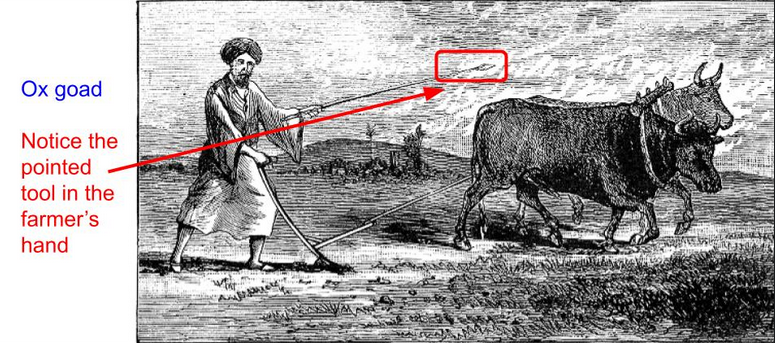 古时候用来赶牛的尖尖的赶牛棒, 后来引申为:
古时候用来赶牛的尖尖的赶牛棒, 后来引申为:
招惹, 刺激, 激怒某人 (为了让他们做某事) => 赶牛棒让牛很烦躁
- A group of children were goading (= laughing at or pushing) another child in the school playground. 一群孩子正在学校操场上嘲弄推搡另外一个孩子。
- She seemed determined to goad him into a fight. 她似乎铁了心要激怒他来打一架。
- He refused to be goaded by their insults. 他对他们的侮辱不屑一顾。
刺激, 驱使 => 赶牛棒可以刺激牛向前走
- The runner was goaded on by his desire to keep up with the others. 这名跑者不停地努力,一心要跟上其他人。
# evanesce☢☢
/ˌev.əˈnes.əns/ e- => “从…离开” van- => empty, 空, 源自拉丁语 vanus -esce => “动作的起始”
(of smoke, mist, etc.) 转瞬即逝, 消散, 隐没
evanescent => evanesce+ent => adj. 短暂的, 转瞬即逝的, 瞬息的
# -esce
ac・qui・esce => v. 默许, 默然同意 adol・esce => v. 进入青春期 co・al・esce => v. 联合 fluor・esce => v. 发荧光 in・cand・esce => v. 使白热化 ob・sol・esce => v. 使过时, 使淘汰 opal・esce => v. 发出乳白色的光 phosphor・esce => v. 发出磷光 re・juven・esce => v. 使重焕青春
- 上面很多词将后缀 “esce” 换成复合后缀 “escence”(-esce + -ence) 表示"动作的起始", 可以得到名词. 比如 adol・escence
# importune ☢
im- => 没有 port- => harbor 港口
没有港口的, 无法入港的, => 引申为"麻烦的" => 强求, 纠缠, pester, press, plague, hound
# court
court 作为动词还有"奉承, 讨好, 献殷勤的意思"
- Adams is being courted by a number of football clubs. 有好几家足球俱乐部在向亚当斯献殷勤。
=> 进一步引申为"求取, 设法取得"的意思
- She courts publicity by inviting journalists to extravagant parties. 她邀请新闻记者参加奢华聚会来谋求曝光度。
=> 同时还有招致, 招惹麻烦的意思
- Drinking and driving is simply courting disaster. 酒后驾车纯粹是在招惹祸端。
# -sent
sens-, sent- => feel, “感觉”
# dissent
dis- => 相反, differ =>differ in sentiments => 不同意, 反对, 异议
# assent
as- => 朝, 向, to, 一样 feel the same => 赞成, 同意
# resent
re- => 相反, 相对, 也表示强调 have a strong feeling against => 憎恨, 愤恨
# consent
con- => with, together feel together => 同意, 答应, 认可
# stipple☢
点彩画法, 比如化妆时候用美妆蛋按压的动作, to apply paint with light dabs
- 不要和 dabble 搞混了
# discredit☢
dis + credit => 抹黑, 使名誉受损, 否认, 驳斥 disgrace, blame, shame, smear, dispute,
# pluck
- 拔 pluck your eyebrows => 修眉 pluck the chicken => 给鸡拔毛
- 摘 pluck a lemon
- 拨(弦) pluck the strings of a guitar
引申为 =>
to remove someone suddenly from a situation that is ordinary 使脱颖而出;提升 He was plucked from obscurity to star in the film. 他脱颖而出成为这部电影的主演。
to remove someone quickly from a dangerous or difficult situation 使…. 脱离险境 The last passengers were plucked from the ship just seconds before it sank. 最后一批游客在船沉没前几秒钟被救起。 => (noun.)
courage and a strong wish to succeed 胆识,勇气 She showed a lot of pluck in standing up to her boss. 她顶撞老板,显示出了很大的勇气。
# abjure☢☢
ab- => opposite, not, jur- => swear, law, 发誓,法律
- 背离自己的誓言 => 公开放弃
# adhere
adhere 是黏附, 附着的意思, 可以引申为=>
(黏附于某种信念) => 坚持某种观点或者信念 If you adhere to an opinion or belief, you support or hold it.
If you can’t adhere to my values, then you have to find another place to live.
(黏附于某种规则) => 遵守某个规则, 准则 If you adhere to a rule or agreement, you act in the way that it says you should.
All members of the association adhere to a strict code of practice.
It is only when safety procedures are not strictly adhered to that catastrophes occur.
# antagonize
- ant- 表示“反对,相反”。源自希腊语 anti “against, opposite.”
- agon- = struggle, 表示“挣扎,斗争”。源自希腊语 agein “to drive, lead, weigh.”
- -ise 动词后缀,一般缀于形容词后。-ise 是英式英语,-ize 是美式英语。源自希腊语 -izein, verbal suffix.
compete against => 引申为"使敌对, 激怒"
# antic☢☢
antic - 这个词的特殊意义产生于意大利。文艺复兴时代,意大利人在古罗马遗迹发掘出大量奇形怪状的假面具和雕像。在罗马皇帝提图斯(Titus, 39-81)的豪华浴厅墙上雕刻的人物、动物、花草等更以风格奇异、形状怪诞而引人注目。意大利人把这些稀奇古怪的雕刻品称作antico。16世纪英语借用了该词,作antic。最初antic也指“奇形怪状的雕塑”,以后引申为“丑角”,但这两个词义今已不用。现在antic常指“滑稽动作”或“古怪行为”,且多作antics。在当形容词用时则是“古怪的”、“滑稽的”之意。实际上antico这一意大利词还可以追溯到拉丁语antīquus ‘ancient’(古老的),英语里意指“古玩”、“古物”的antique一词也源出于此。
例
- The antics of the clowns amused the children. 小丑们的滑稽动作把孩子们逗得发笑。
- The audience were/was entertained by the antics of the magician. 观众被魔术师的滑稽动作逗乐了。
# attic
阁楼
# auspicious☢
/ɑːˈspɪʃ.əs/ auspice + -ous
auspice(吉兆):古罗马人的鸟卜法 古罗马的伊特鲁利亚人有通过观看飞鸟来占卜凶吉的做法。巫师用一个魔杖(lituus)在天空中画出一个区域,观察鸟在该区域的飞行,通过鸟的飞行来判断吉凶。这种观鸟占卜法称为 auspice,源自拉丁语 avis(bird,鸟)+specere(look,看)。后来,auspice 的含义演变为占卜时取得的吉兆,并逐渐衍生出“赞助、主办”的意思,因为吉兆不就是老天爷的支持和赞助吗?执行观鸟占卜的巫师叫做 augur 或 auspex,所以观鸟占卜法也被称为 augury。
auspice:[‘ɔːspɪs] n. 吉兆,赞助,主办
auspicious: [ɔ’spɪʃəs] adj. 吉兆的,吉利的;幸运的
augury:[‘ɔːgjʊrɪ] n.占卜,预言,预兆
augur:[‘ɔːgə] n. 占卜师,预言者 v. 预言,占卜
auspex: [‘ɔːspeks] n. 鸟卜者;占卜者
# belie☢
be- => 使 … 成为 lie => 掩盖 使 … 被掩盖 => disguise, misrepresent, conceal, distort
- To belie means to contradict. If you are 93 but look like you are 53, then your young looks belie your age.
# atrocious☢
atroc- => cruel, 残酷
穷凶极恶的, 骇人听闻的, 残暴的 => atrocity n. 暴行
# clog
原来的意思是 a lump of wood(一大块木头) => 因为把一大块木头绑在上面东西上就会阻碍 ta 的行动, 所以后来有了 hinder, impede the movement of 的意思, 也有阻塞, 堵塞的意思
- 因为有’一大块木头’的意思, 所以clog也代表鞋底(sole)是用一块木头做成的鞋子 => 木屐, 木底鞋
# culpable
culp- => fault, 过错, 罪
- 英语从拉丁文直接借用了不少词语,并且保留了原拉丁文拼写形式,mea culpa 即为其中之一,相当于英语 my fault(我的过失),是个较正式的用语。它源出罗马天主教礼拜仪式的祷文:“mea culpa, mea culpa, mea maxima culpa.”(这是我的过失,我的过失,我的极大过失。)教徒以此向上帝表示忏悔认罪。形容词 culpable 表面上是借自古法语 coulpable,但却是源于 culpa ‘fault’(过失)一词,其古义为“有罪的”、“犯了罪的”,但今天多释义为“应受责备的”或“该受惩处的”。
例
- They held him culpable for the offence. 他们认为他有罪,应受惩罚。
- The prime minister is highly culpable in this affair. 这件事首相难辞其咎。
# culp-
- exculpate => ex・culp・ate => 开脱, 使无罪
- disculpate => dis・culp・pate => 开脱, 使无罪
- inculpate => in・culp・ate => 归罪于, 加罪于
- inculpable => in・culp・able => 无罪的
# defray
- 来自古法语 defrayer, 成本,支付,来自 de-,向下,支出,-frai,破碎,花费,词源同 break. 原义为破坏和平的罚金。后词义通用化。
# delicacy
- 类似于 fragility, 形容美丽优雅物品的脆弱与精美
- the delicacy of a rose
- 形容一个情况, 问题的"微妙", 需要很细致地处理才不会出错的情况
- He sensed the delicacy of the situation
- Both countries are behaving with rare delicacy.
- 珍馐, 佳肴
- Smoked salmon was considered an expensive delicacy.
# demolish☢
to destroy (a large structure) completely
- 引申到观点, 论点 => 推翻论点, 颠覆观点(形容很彻底)
- Our intention was to demolish the rumours that surrounded him.
- 引申到比赛, 对手 => 完败对手, 彻底击败对手
- Millwall demolished Notts Country 6-0 on Saturday.
- 引申到食物 => 狼吞虎咽
- Joe demolished an enormous plateful of chicken and fries.
# accrete
ac- => 来, 向, 去, 也表示强调 cre- creas- => grow, make, 增长
=> accrete 通常表示自然物质的积聚, 堆积, 吸积, 累积, 沉积
# cre- creas-
- increase
- increment
- crescendo => n. (声音, 乐曲) 渐强, 最高点
- procreate => v. 生育, 生殖, pro- 表示很多, 向前(在这里可以理解为时间上的向前)
# adulterate
ad- => 朝, 向, 去, 或者为强调 ulter- alter- => 改变, 其他的, other, to change, from Latin “alius” -ate => 动词后缀, 造成, 使… => to other, to change, => debase by mixing with foreign or inferior material, 掺假, 兑假货
There were complaints that the beer had been adulterated with water. 有多人投诉说这啤酒里面兑了水。
adulterator
adulteration
adulterated
=> 引申到情感变质 => adultery n. 通奸, 婚外性行为
- adulterer 奸夫, 通奸者
- adulteress 奸夫
- adulterous adj. 通奸的,
# allure☢☢
鹰猎(falconry)在英国和欧洲大陆一度极为盛行。所谓鹰猎乃是放鹰狩猎,即使用鹰、隼等来狩猎的一种活动。这种鹰,即猎鹰(falcon),须先经过耐心而得法的驯化和训练,方能用于鹰猎。狩猎人往往用伴有肉食并系着长绳的一束鲜艳羽毛作引诱物召回猎鹰。这种引诱物英语就称lure。lure的终极词源为日耳曼语之古法语词loirre ‘bait’(诱饵)。在现代英语中它通常用于贬义,泛指任何“引诱物”或“诱饵”,并引申为“诱惑力”或“吸引力”,也常作动词用,表示“诱惑”或“引诱”。作为lure之同义词的allure产生于同一背景。它源自古法语alurer,由a ’to’加lure ‘falcon’s lure’(狩猎人之诱饵)构成。虽然allure和lure基本同义,也表示“诱惑”、“引诱”和“诱惑力”,但一般不含贬义。
例
Rewards allure men to brave danger. 重赏之下必有勇夫。
Even in her fifties she had lost none of her seductive allure. 她虽年过半百,但风韵犹存。
Most newspaper journalists find it hard to resist the allure of working in television. 大多数报纸记者发现很难抗拒在电视台工作的吸引力。
He was lured into the job by the offer of a high salary. 他受高薪诱惑才接受了那份工作。
alluring => attractive or exciting
- She was wearing a most alluring dress at Sam’s dinner party.
allurement
不要和 allude 弄混了
# menace☢
威吓, 以喊叫威胁的方式驱赶牲畜 古代人放牧、驱赶牲畜时比较粗暴简单,通常通过喊叫、威胁或鞭打的方式来驱赶牲畜,这种方式在拉丁语中叫做minare,进入法语后拼写为mener。英语单词menace(威胁)就来源于此,本意指的是驱赶牲畜时人所发出的叫喊声、威胁声,兼有“威胁”和“驱策”的含义。后来“驱策”的含义逐渐消失,仅仅表示“威胁、恐吓”,变成了threaten的同义词。 menace:[‘menəs] n.v.威胁,恐吓 minacious: [mɪ’neʃəs] adj. 威吓的 minatory:[‘mɪnə,təri] adj. 恐吓的,威胁的
# amenable☢☢
还有一个单词也来源于此,那就是amenable,由a(=to,面对)+mener(驱赶、领导)+able(能够),字面意思就是“能够面对领导”,引申为“顺从的、易于管教、易于屈服、容易被说服的”,还可以表示“负有责任的、经得起检验的”。要注意这个词与amend(改善)并没有关系。 amenable:[ə’miːnəb(ə)l] adj.顺从的,肯接受的;负有责任的;经得起检验的 promenade:[,prɑmə’ned] v. 散步,漫步;骑马 n. 散步;舞会;骑马 adj. 散步的
# ancillary
ancilla + ary ancilla => Latin “handmaid” 女佣的, 也就是勤杂人员的意思, 引申为"附属的, 附加的, 辅助的"
# apparition
apparition(幽灵):耶稣基督以婴儿形态诞生 英语单词 apparition 来自拉丁语 apparitionem,是动词 apparere(appear,显现)的过去分词动名词形式,本意就是“显现”。这个词最初用于宗教场合,表示“基督显现”,即耶稣基督以婴儿的形态诞生。据《圣经•新约》记载,耶稣诞生时,东方三博士在观星时发现异象,便一路向西前来拜见“犹太人的王”,最后见到了刚出世的耶稣,向他献上了三件宝物为礼。为了纪念耶稣基督的显现,基督教徒将耶稣诞生之日定为“主显节”(Epiphany)。单词 epiphany 的本意和 apparition 一样,都表示“基督显现”,但常常用来表示“主显节”。而 apparition 一词的宗教色彩逐渐消退,常常用来表示幽灵鬼怪的显现。
- apparition:[,æpə’rɪʃən] n. 幽灵,幻影,离奇出现的东西
- epiphany:[ɪ’pɪfəni] n. 主显节,显现
appearance 和 apparition 的词根相同, 也都表示"出现", 但是 apparition 表示令人惊讶的, unexpected 的显现, 所以通常用来指鬼灵的显现, 而 appearance 则用来指一般的出现了
# attest
at- => to test => 证明 to test, to bear witness to => prove, affirm, confirm, testify
# test-
- 英语词根 testi-表示“作证”,如 testify(作证、证明)、testament(圣约)、testimony(证言、证据)。这个词根来自拉丁语 testis(睾丸),与单词 testicle(睾丸)同源。睾丸和作证有什么关系呢?有种说法认为,睾丸是男性特征的证明,所以原本表示睾丸的 testis 便衍生出“证明”之意。还有人认为,古代罗马人在法庭上作证时,会用手捧着睾丸以表示自己所说的千真万确、绝无虚言。
- 但是,不少词源学家认为这一理由缺乏根据,属于传说。不管怎样,词根 testi-与 testicle(睾丸)同源,这个故事有助于我们记忆这些单词。 testify:[’testɪfaɪ] v. 作证,证明,证实 testimony:[’testɪmənɪ] n. 证词,证言,证据 testament:[’tɛstəmənt] n. 圣约,确实的证明 testicle:[’testɪk(ə)l] n. 睾丸 testicular:[tɛs’tɪkjʊlɚ] adj. [解剖] 睾丸的;睾丸状的
# awry
a- => 表示加强 wry => wring, 表示"拧, 扭", “扭"曲的, crooked, 歪的, => 引申为 “发展方向离开预期路线的, 出错了的”
# bonhomie
bon => 法语, 好的 hom => hum , 表示 “人”, human
好人 => 和蔼的, 性情温和的
# bootless
boot => 效用, 可以这样记忆: boot 有启动计算机, 猛踢一脚的意思, 而 bootless 就是"没有用的, 无效的, 徒劳的” 的意思
# bound
除了"边界, 界限"的意思, 其实 bound 还有以下含义
be bound to happen => very likely to happen
- You’re bound to forget other people’s names occasionally
- These two young musicians are bound for international success. I’ll be bound => 我敢肯定, 我打包票
bound 还是 bind 的过去式, 所以就有了"捆, 栓, 绑"的意思, 引申为 “束缚, 有义务, 受约束"的意思, 也引申为了"紧密相关"的意思
- We found the girl bound and gagged.
- She feels (duty)-bound to tell him everything.
- The company is bound by a special agreement to involve the union in important decisions.
- We are as tightly bound to the people we dislike as to the people we love.
- Economic growth is still bound to the issues of poverty, social justice and conservation.
-bound => … 装帧的书 a leather-bound book
用于交通工具, 还有 destinated for 的意思: going to 去…的;准备前往…的;开往…的
- She was on a plane bound for Moscow when she got sick. 她在前往莫斯科的飞机上突然生病了。
# vogue☢
a fashion or general liking in vogue
- The short hemline(短的裙子下摆 => 短裙) is very much in vogue this spring.
# debunk
# bunk
bunk 有上下铺, 火车卧铺的"铺"的意思, 该词可能系由 bunker(箱)逆构而成. 而 bunk 另一个含义"nonsense"则有个故事:
- 英语单词 bunk 源自美国北卡罗来纳州 Buncombe 县的名称。1820 年 2 月 25 日,在美国第 16 届国会上,南北双方议员就奴隶制问题进行了激烈讨论。在会议中,北卡罗来纳州 Buncombe 县议员费力克斯•沃克发表了冗长的讲话,并且与讨论的问题毫不相关。许多与会者纷纷退场。但沃克不肯缩短自己的讲话。他解释说,他这番长篇演讲不是说给大会听的,而是说给他的家乡 Buncombe 听的(talking to Buncombe),为的是使自己的讲话内容能够发表在 Buncombe 当地报纸上,以证明自己的勤勉工作。
- 因此,talking to Buncombe 就成了“talking nonsense, 作空洞冗长的演讲”的代名词,后来该短语被缩写为 bunkum,到了 20 世纪又进一步缩减为 bunk,表示“废话”、“空话”。
- 1916 年美国汽车制造商福特说了一句名言:“History is more or less bunk.”(历史多少有点骗人),使 bunk 一词得以广为流传。约在 1920 年有一位名叫 William E. Woodward 的人针对福特写了《骗人的鬼话》(Bunk)一书。他在书中据 bunk 杜撰了 debunk 一词,用以表示“揭穿”或“暴露”。今天 bunk 在美国几乎成了一个家喻户晓的常用词。
例
- Most doctors think his theories are sheer bunk.
- I’ve heard enough of your bunk.
# calumniate
毁谤;恶意中伤;污蔑
He has tried to calumniate and destroy everyone whose opinions differ from his. 他会去恶意中伤和摧毁所有与他意见不同的人。
cal- = to deceive, 表示“欺骗,挑刺”。源自拉丁语 calvi “to deceive, trick,” cavilla “a jeering.”
cavil (吹毛求疵, 挑剔)的词根也来自这里
# calumny
/ˈkæl.əm.ni/
- 据有关记载,古罗马人对诬陷者施行一种惩戒性做法,即在他的前额打上 K 字印记,K 表示 kalumnia,意思是“诽谤”。以后 kalumnia 演变为 calumnia。英语的 calumny 源自该拉丁词,所以有“诽谤”、“诬陷之词”等义。其派生词 calumniator 则指“诽谤者”。
- 在中世纪,一个人倘若遭到诽谤,很可能会向诽谤者提出挑战,要求决斗。意为“挑战”的challenge一词,若究其根源,也可一直追溯到这个表示“诽谤”的拉丁词。这两者被联系在一起是因为它们之间存在一种因果关系的缘故。
例
- Calumnies are answered best with silence.
- He was subjected to the most vicious calumny, but he never complained and never sued.
# cadge
“to beg” (1812), “to get by begging” (1848), of uncertain origin, perhaps a back-formation from cadger “itinerant dealer with a pack-horse” (mid-15c.)
- 像这种小贩都是很缠人的, 所以有了"乞讨, 索取"的意思
# discharge
charge 最原始的意思是"to load”, dis-charge 就是"unload, 卸货"的意思
- 卸除刑罚, 脱离疾病 => 允许从.. 离开, 出院, 释放
- 卸除职责, 义务 => 履行职责, 义务
- “卸货"引申为"排放, 排出(废气, 废物等)”
- “排出"一义又引申到了武器上面, 意思是"开火, 开枪”(发出子弹)
- charge 有"收费"的意思, discharge 也就有了"还清债务"的意思
# disseminate☢
dis- => 分开, 散开 semin => seed, 种子 -ate =>动词后缀 使种子分散开来 => 引申为散布, 传播(信息, 思想)
- They disseminated anti-French propaganda
# semin-
- semen 精液
- seminal 精液的 => 引申为 具有深远影响力的, influential, ground-breaking,
- inseminate => 使受精, 使受孕
- seminar => 也许是"培养种子人才"的研讨会的意思?
# exacerbate
ex- => 向外, 向上, here probably thoroughly acerb => acid- acri- acu- 尖, 酸, 锐利, sour, sharp -ate => 动词后缀
进一步(完全地)割入, 进一步(用酸)腐蚀 => 使原本就坏地情况恶化, 加剧
- This attack will exacerbate the already tense relations between the two communities.
# explicate
可以和 complicate 一起记忆: plic- => 源自拉丁语"plicare" to bend, to fold ex- => 向外, -ate => 动词后缀, 使….
- ex-是向外, explicate 就是"展开", 也就是 (展开来)详细解释, 分析
- 而 com-是"一起", 将不同的东西一起弯曲折叠, 也就是将其变得很复杂
implicate
- 还有个 implicate, im- => 在内, 也就是将… 包在里面, 不放在表面上 => 暗示, 牵涉, 牵连
# extricate☢☢
这个也可以和"intricate"一起记忆
- ex- => 向外, 从 … 离开
- tric-, trig- => hindrance, petty obstacles 障碍
- -ate 直接的理解就是"将..从障碍, 困难里面移出来" => 解救, 使摆脱
intricate 就是"进入障碍, 困境" => 引申为 adj. 错综复杂的, 精密复杂的 这里-ate变成了形容词后缀, 表示 “…的”, 比如"accurate, intimate"
# expurgate☢
ex- 向外, 从… 离开 purge => 肃清, 清除 -ate => 动词后缀 to purge => 引申到文字上面就是 删节, 删除(不正当的文字)
# fad
fiddle-faddle 的缩写 fiddle-faddle 是"瞎搞, 胡闹"的意思(过时了) 后来引申为了"短暂的风潮, 一时的狂热"
- craze, fashion
# fastidious☢☢
- meticulous 和 fastidious 都是没有贬义的, 表示严谨, 一丝不苟的
- 而 particular 有"not easily satisfied"的意思, (挑剔)
- fussy 则是一个贬义词, 过分挑剔的, 难缠的
# feckless☢☢
“effect+less"的简写, 直译过来就是"没有效用的”, 多用于形容人, 表示"无能的, 软弱而不负责任的"(所以不能产生任何正向的 effect)
- 类似于 bootless
# futile☢
frugal => 节俭的 futile => 徒劳的
fus- fund- => pour 流, 泄 -ile => … 的 pouring out easily => 引申为徒劳的, 无用的
# fus-
- confuse => 一起流动, => 混在了一起, 混乱的 => 引申到心理上, 迷惑的, 糊涂的
- fuse => 熔化, 熔融
- diffuse => dif- “apart, in every direction” 向四周流 => 扩散, 弥散, 分散, 散射
- infuse => 向内流动, => 充满, 灌输, 浸润, 泡(茶) => 使某人充满某种感情, 将某种特性注入某物
- suffuse => suf-: “under” => to pour under, overspread, 弥漫于, 充满
# indigenous
当地的,土生土长的
- endo- 表示“内部”。
- gen-,gener-,genit-,-genesis = birth, produce, 表示“出生,产生”,医学上引申为“生殖或基因”。
- -ous,-itious,-eous,-ious,-uous 表形容词,表示“…的”
# indigent☢
- endo- 表示“内部”。
- ig- => lack
- -ent => …的 十分贫穷的
# knotty
多结的 => 引申为棘手的, 复杂的 a knotty problem
# jocular
joke 的形容词形式
# labyrinthine
我们今天用以泛指“迷宫”的 labyrinth 一词原指神话传说中的希腊建筑师和雕刻家代达罗斯(Daedalus)为克里特国王弥诺斯(Minos)在首都克诺索斯(Knossos)王宫下面所修建的克里特迷宫(the Cretan labyrinth)。 传说,克里特岛的国王米诺斯(Minos)是宙斯和欧罗巴公主的儿子。在他与兄弟争夺王位时,曾请求海神波塞冬降下神迹来支持他。波塞冬答应了他,从海中升出一头俊美的白色公牛,并要求事后把公牛献祭给他。没想到米诺斯当上国王后,舍不得宰杀这头俊美的白牛,就用另一头牛代替献祭给了波塞冬。波塞冬特别生气,想严惩这个欺骗神灵的国王,就施展法力,使王后爱上了这头白牛。王后后来生下了一个牛头人身的怪物米诺陶洛斯。为了遮羞,米诺斯请当时著名的工匠代达罗斯(Daedalus)建造了一座名叫 labyrinth 的迷宫,把弥诺陶洛斯(Minotaur)关在里面。 后来弥诺斯的儿子被雅典人所杀,弥诺斯为了报仇,强迫雅典人每年(一说每九年)送童男童女各七名给怪物吞食。到第三次献牲的时候,希腊英雄雅典王子提修斯(Theseus)自告奋勇前往克里特迷宫除妖。迷宫曲径繁多,门户通道复杂难辨,一进去不易找到出路。提修斯杀死怪物后,在弥诺斯的女儿阿里阿德涅(Ariadne)的帮助下,靠她所给的线团引路,才得以逃离迷宫。
labyrinth一词是14世纪进入英语的。它源自希腊语labýrinthos/labúrinthos,若再进一步追本溯源,则可追溯至希腊词根lábrus/lábrys ‘double-bladed axe’(双刃斧)。按字面义,labyrinth便是“the house of the axe”的意思。英国考古学家伊文思(Arthur John Evans, 1851-1941)于1900-1908年间发掘了克里特岛上的克诺索斯古城,出土古代王宫遗址一处,占地5.5英亩,其规模宏大壮观,王宫墙上便可见到这种斧头图形。关于克里特迷宫的传说,反映了公元前2000年克里特国的繁荣。
例
- We could not find our way out of the labyrinth of dark and narrow streets. 我们没能从迷宫般又黑又窄的街道中找到出路。
- Finally through a labyrinth of corridors she found his office. (CID) 穿过迷宫般的走廊,她终于找到了他的办公室。
labyrinth:[’læb(ə)rɪnθ] n.迷宫 labyrinthine:[,læbə’rɪnθaɪn]adj. 迷宫的,错综复杂的
# clue
clue(线索):引导忒修斯走出迷宫的线团 克里特国王米诺斯的儿子被雅典人杀害。米诺斯替儿子报仇,打败了雅典人,强迫他们每年给公牛怪米诺陶洛斯进贡七对童男童女。雅典国王埃勾斯(Aegeus)的儿子、英雄忒修斯(Theseus)为了替民除害,自愿作为贡品前往克里特岛。克里特国王的女儿阿里阿德涅(Ariadne)爱上了忒修斯,送给他一把利剑和一个线团。忒修斯进入迷宫,手持利剑杀死了公牛怪,然后顺着线团原路返回,顺利逃离迷宫。 英语单词 clue 的来源就与这个故事有关。clue 在古英语中拼作 clew,原意是“线团”。因为忒修斯是凭借线团逃出迷宫的,所以线团成了他破解迷宫的线索。由此,单词 clue 就从“线团”引申出“线索”的含义。
- clue:[kluː] n. 线索,情节
- clueless: [‘kluləs] adj. 无线索的;愚蠢的
# lachrymose
lachrym- => tear, 泪
- lachrymal adj, 眼泪的, n. 泪腺
- lachrymose 爱哭的, 悲伤的, 伤感的
后缀 -ose 表示"… 多的". 比如"morose, grandiose, verbose"
# laconic☢
laconic - 希腊伯罗奔尼撒半岛(Peloponnesus)东南部有个畜牧山区叫做 Laconia,原为古希腊著名奴隶制城邦斯巴达(Sparta)的所在地。古时候该地区的人(即 Laconians)曾以说话简洁、措辞精练著称于世。他们每每以最少的语词表达自己的意思。有一次马其顿国王腓力二世(Philip of Macedon)送信给斯巴达行政官,威胁说,“如果我们进入 Laconia,我们非把你们的城市夷为平地不可!”(If we enter Laconia, we will raze it to the ground.)得到的回复竟然是简短而又含蓄的“如果”二字(If)。
# lout ☢
a young man who behaves in a very rude, offensive, and sometimes violent way. 不良少年
loutish => 粗俗的, 无理的, 粗暴的
# madcap ☢
mad + cap cap在这里用来比喻头 => “疯头” => 愚蠢的, 荒唐的,
# mendacious☢
not telling the truth
- mend- => fault, physical defect (比如 amend)
- -acious => 形容词后缀, 具有 … 特征的 (比如 capacious, instantaneous, tenacious)
# mishap ☢
mis + hap hap => luck, chance
- 不幸, 模仿 mischance 造出来的一个词, mischance 也是"不幸"的意思
# mottle
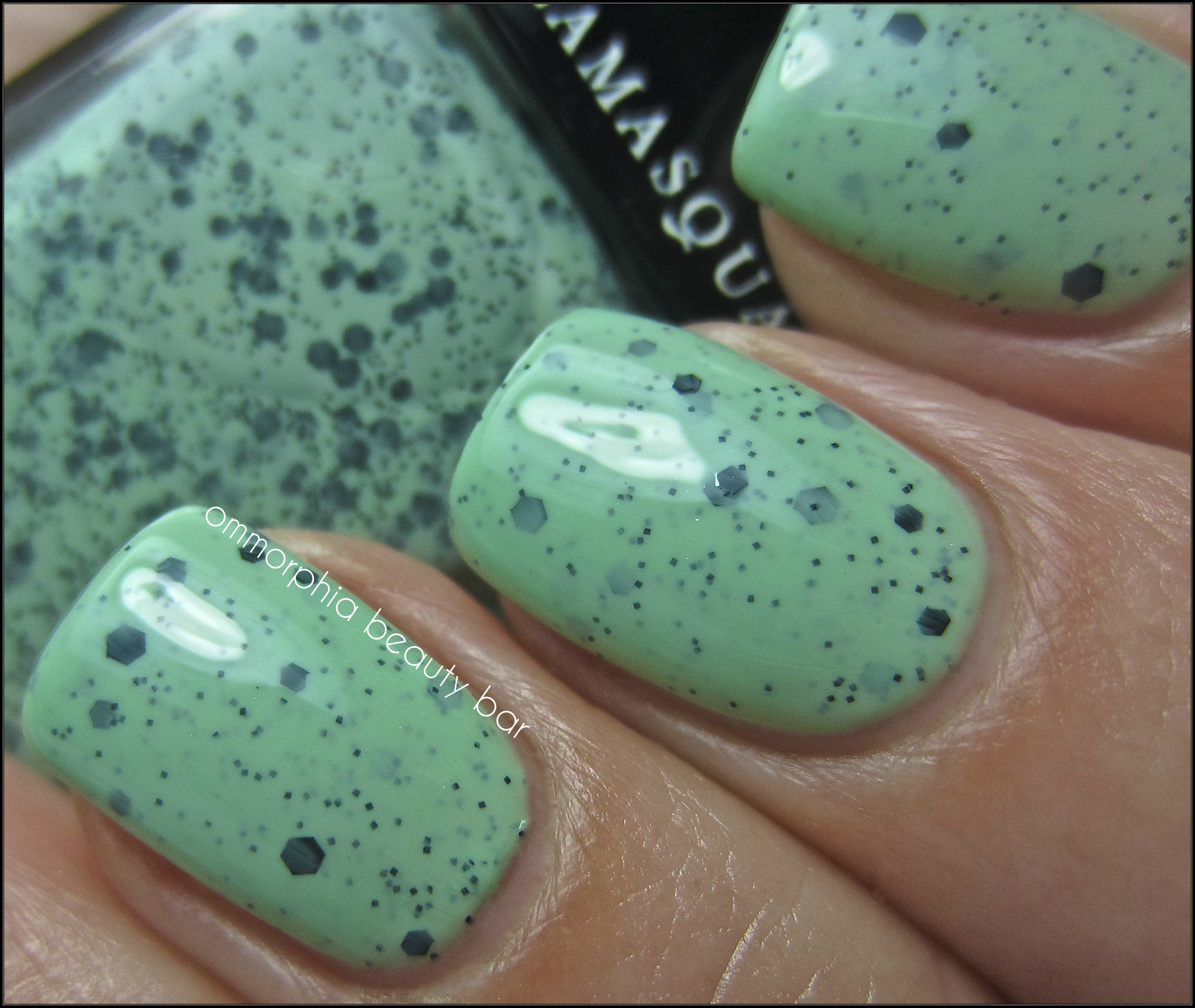
# murky

- dark and dirty and difficult to see through 引申为情况复杂而不明朗的 有趣的是, get into the murky water of … 就是中文里面的"趟浑水"的意思
- I don’t want to get into the murky water of family arguments.
# nascent
Latin nasci “to be born” => nasc-, nat-, nai-
- nascent => nasc・ent => 出生的 => 新生的, 萌芽的, developing, beginning, dawning, evolving
- nat・ive
- nai・ve
- nat・al
- in・nat・e
- re・naiss・ance
# nexus
nect- nex- => to bind, tie, connect, 连结, 源自拉丁语"nectere, 过去分词, nexus"
- connect => con・nect
- nexus => nex・us
- annex => an・nex => 吞并, 兼并, 强占 basically means “to connect with”
# notch
V 形的槽 => 引申为刻度, 等级
Average earnings in the economy moved up another notch in August
iPhone手机上面的刘海也叫 notch

# onerous
oner- => load, burden, 来自希腊语onus -ous => … 的 burdensome, troublesome, difficult to do or needing a lot of effort
- exonerate => ex・oner・ate => 免除负担 => 证明… 无罪, 免除罪责, 免除责任
# opine☢
opt- => to choose, from Latin “opinari”
to choose, to have an opinion => express an opinion, 发表意见
opinion
option
opt (for, to do..)
adopt
# opportune☢
op- => against, 朝, 对, 向 port => harbor, 海港, 港口 => 面向港口的 => (时间)方便的, 合适的, 恰当的, 适宜的
Would it be opportune to discuss the contract now?
inopportune
opportunity 还有一个关于"海港 port-“的单词是 importune
# ossify
from Latin “ossis” => bone 骨化 => 引申为 僵化, 使(思维, 行为)固定不变
- 变得很硬, 像骨头一样硬, 所以难以改变, 僵化里面的"僵"也是"硬"的意思
# paragon
paragon(模范):用来检验金子纯度的试金石 古代西方人为了检验金子的纯度,常常使用一种用纹理细密的深色玉石做成的试金石(touchstone)。将要检验的金子在试金石上摩擦,就可以根据划痕颜色来判断金子的纯度。这种试金石在意大利语中被称为paragone,它来自希腊语parakonan,由para(并列、对抗)+ akone(磨石)构成。英语单词paragon就来源于此,本意就是这种试金石。因为试金石是衡量价值的标准,因此衍生出“完美之物、模范”之意。 paragon: [‘pærəg(ə)n] n. 完美之物,模范,试金石 adj. 完美的

# paramount
para 意为"超过”, mount 表示"山顶", 比山顶还高的 => 至高无上的
# paunch
大肚子, 啤酒肚, a fat stomach paunchy => 有 paunch 的
# perambulate☢
per- 向前 ambulate 移动, 步行, 走动 => to walk around for pleasure
# perfervid
per- 完全 fervid, 热情的, 热忱的, => very hot, very ardent, enthusiastic, zealous 感觉 perfervid 要比 fervid 更强烈一点
# ferv-
来自拉丁语, boil, 沸, 热, 常常引申为情感的强烈, 比如汉语里面的热情, 热忱, 热爱.
有趣的是, 汉语里面的“热爱”一词来自英文的 ardently love,而该英文词源自拉丁语的 ardenter amare。这种说法在古代汉语中是找不到的。
fervent
fervid
fervor, fervour
fervency
# perspicacious☢
敏锐的, 有洞察力的 如果从单词直接来理解就是 “有能看穿东西的能力的”
- per- => 完全, 贯穿, forth, 向前
- spic- => to look, see, 来着拉丁语 specere
- -acious => 具有… 特征的
还有一个词很像: perspicuous => 清晰明了的, 易懂的 ☢
per- => 完全, 贯穿, forth, 向前
spic- => to look, see, 来着拉丁语 specere
-uous => … 的 从单词直接理解就是 “能够被直接看穿的”
perspicacious 的名词是 perspicacity
perspicuous 的名词是 perspicuity
# pithy☢
pith => 髓, 木髓, 骨髓 引申为 “意义, 精华” pithy 就是"凝练的, 精辟的"
有意思的是句子外面那层白色的东西东西也叫 pith
- a pithy orange
# philistine
philistine(庸俗之辈):以色列的死敌腓力斯人
- 腓力斯人(philistine)居住在中东迦南南部海岸的古民族,其领土在后来的文献中被称为“腓力斯地”(Palaestina,巴勒斯坦)。腓力斯人是以色列人的劲敌,在圣经旧约中详细记载了以色列人和腓力斯人的战争和恩怨。在以色列人眼中,腓力斯人是没有信仰的野蛮人,是文明的破坏者。
- 1689 年,在德国一个叫做耶拿(Jena)的城市中,当地的大学生和市民之间爆发了一场激烈的冲突,有数人在冲突中丧生。事后,耶拿大学的牧师在一次布道中,针对这场大学生和市民之间的冲突发表了尖锐的评论,把与学生作对的市民比作圣经中与以色列人作对的腓力斯人。从此以后,人们用“腓力斯人”(philistine)来形容那些没有接受过大学教育,缺乏文化修养并鄙视文化的人。从这个词还产生了“庸俗主义”(Philistinism)一词,字面意思就是“腓力斯人的方式、习惯、个性和思维方式”,指的是低估、鄙视艺术、审美、精神和智力的态度,也称为“反智主义”。
- philistine: [‘fɪlɪstin] adj. 俗气的;无教养的;腓力斯人的 n. 俗气的人;仇敌;门外汉
- Philistinism:[‘fɪləstɪnzəm] n.庸俗主义,实利主义,市侩主义
# affectation
behaviour or speech that is not sincere 矫揉造作,做作,装模作样;假装
She has so many little affectations. 她身上有好多矫揉造作的小毛病。
单词 affect 也有对应的意思
to pretend to feel or think something, 假装
- To all his problems she affected indifference. 对他所有的问题,她都装作漠不关心的样子。
to start to wear or do something in order to make people admire or respect you, (为引人注意或自抬身价而)刻意穿戴,故作
- At university he affected an upper-class accent. 在大学里他拿腔捏调假装上流社会口音。
- He’s recently affected a hat and cane. 近来,他头上戴了顶帽子,手上拿了根拐杖,装腔作势起来。
# decry
de- => 向下, 从… 离开, 相反, 使相反 cry => 呼喊 反着呼喊 => 谴责, 抨击, condemn, blame, abuse, blast
# deracinate
de- => 彻底离开, 完全离开 rad-, radic- => root -ate => 动词后缀, 使…, 造成.. => 连根拔除, 根除, to pluck up by the roots
# rad-, radic-
- radish => rad・ish => 萝卜
- radical => rad・ical => “像根一样的” => 根本的, 基本的 => 要根本改变需要很彻底, 激进的改变 => 激进的, 激进分子
- radix => radix就是Latin的root => “数字的根” => 基数
- eradicate => e・radic・ate => 连根拔起, 根除
- irradicable => ir・radic・able => 不能根除的
根除, 彻底消灭
Exterminate implies utter extinction; it therefore usually implies a killing off.
/ˈek.stɚ.peɪt/ Extirpate implies extinction of a group, kind, or growth, but it may carry less an implication of killing off, as exterminate carries, than one of the destruction or removal of the things essential to survival and reproduction; thus, wolves might be exterminated by hunting in a particular area, but large carnivores in general are extirpated by changed conditions in thickly settled regions; a heresy is often extirpated, rather than exterminated, by the removal of the leaders from a position of influence; a vice cannot easily be extirpated so long as the conditions which promote it remain in existence.
Eradicate stresses the driving out or elimination of something that has taken root or has established itself.
Uproot differs from eradicate chiefly in being more definitely figurative and in suggesting forcible and violent methods similar to those of a tempest that tears trees out by their roots.
Deracinate basically is very close to uproot, but in much recent use it denotes specifically to separate (as oneself or one’s work) from a natural or traditional racial, social, or intellectual group.
Wipe (in this sense used with out ) often implies extermination, but it equally often suggests a canceling or obliterating (as by payment, retaliation, or exhaustion of supply).
# discursive☢
discursive 有两个意思, “东拉西扯的"和"论证的”, 分别可以这样理解:
东拉西扯的 dis- => 分开, 散开, apart curs => run, -ive => … 的 到处跑的, 向四周跑的 => 引申为论证不着边际, 东拉西扯
论证的, 推理的
# discourse
dis- => apart course => to run => to run about, to run to and fro => 类比交谈时候两个人一来一回的说话
- discursive 就是 discourse 的形容词, 也就是"交谈的", 也许是古人论证会采用"对话式论证", 就引申为了"论证的, 推理的"
# currere : 流
currency 是 current 的派生词。按字面义,current 的意思是 running,而 currency 的意思则是 running money。它们源自拉丁语动词 currere ’to run’(流)。该词原指液体的流动,在中世纪拉丁语中转指从一地流通到另一地的钱,进入古法语后变为 corir。其变化词形之一的 currant 进入中古英语,最后演变为 current。current 在现代英语用于“现时的”、“现行的”、“水流”、“电流”等义,但早在 15 世纪时 current 也有与金钱流通相关的意思。此义后来转到了 currency。在 17 世纪末,当 currency 开始在英国使用时,它仅指硬币,因为当时还没有纸币。通货之所以称 currency,因为它是 running money(流通货币),也是 the current medium of exchange(流通的交换媒介)。currency 用于此义的最早文字记录见于美国政治家和科学家富兰克林(Benjamin Franklin, 1706-1790)1729 年的著作中。除指“货币”和“通货”之外,currency 也可表示“流通”或“传播”。
英语中源于拉丁语动词 currere 的词还有不少,诸如:
- concur(原义:“流到一起, 一起流动”,今义:“同时发生”或“同意”),
- occur(原义:“流向”,今义:“发生”),
- recur(原义:“再流”,今义:“复发”),
- course(水流等的走向;进程;课程),
- discourse(话语;交谈),
- courier(信使) 等等。
例
- Do you change foreign currency? 你们兑换外币吗?
- The Euro will eventually replace European national currencies. 欧元将最终取代欧洲各国货币。
- The word has obtained/attained general currency. 该词已经得到普遍使用了。
# dissemble☢
改写自dissimulate dis- => 不, apart simul- => alike, same -ate 使自己和(真实的样子)不一样, => 掩饰, 掩盖(真实动机, 情感, 真相等)
- Henry was not slow to dissemble when it served his purposes
# effrontery☢
厚颜无耻;放肆 ef- => ex-的变形, 向外, 向上 front => forehead, 前额 -ery => 名词后缀, 表示某种情况
不是很好理解, 下面有两个方法帮助记忆:
For every discussion he comes to the front and argue. How rude!
Think: I’m the king, but he stepped in front of me. How dare he be so bold!
He was silent all through the meal and then had the effrontery to complain that I looked bored!
# germane☢
germ- => 种子, seed germane => having the same parents, from the same seeds, => 同类的东西想必关系密切 => 关系密切的, 紧密相关的(通常用于 ideas and information)
- Her remarks could not have been more germane to the discussion.
# inveigh☢
in- => in, 进入 veigh => to carry, 运输 => 直译就是"运进来", “抨击, 痛斥"的意思是由 invective 一词带来的, “把(坏话)运进来” => 猛烈抨击, 痛骂
invective => noun. criticism that is very forceful, unkind, and often rude
# jettison
to throw overboard, 原指在船只遇险的时候, 将船上的货物丢弃到海中减轻重量, “紧急时刻丢弃船, 飞机上面的货物来减轻重量” => 引申为"将… 丢弃, 放弃(某个计划或想法)”,
# lamentable
lament是哀悼, 悲叹的意思, lamentable直接理解就是"让人感到悲伤的, 让人哀悼的", 现在通常指一个情况太糟糕了, 糟糕到让人有点生气, 应该收到谴责的糟糕, “可悲的”, regrettable, distressing, tragic,
# mangy☢
mange 是家畜的一种皮肤传染病, 症状包括瘙痒, 脱毛, 皮肤粗糙, 水泡 “疥癣”, mangy就是"得了mange的"
又因为长了这种癣的动物就变得很丑, 很脏 => 引申为 dirty, old, shabby 的东西
不要和mingy搞混了, mingy是小气的, 吝啬的的意思, 也用于形容数量少得可怜的
# nip
去一会儿(某个地方) e.g. nip to the shop
轻咬, 轻捏
一点点(烈性酒) => 大概是因为那种猛的一下火辣辣的感觉和 nip 的动作很像
# a nip (in the air)
用来形容寒冷, 大概是因为冷风在脸上的刺痛感也和nip的动作很像叭 汉语是"刺骨", 英语是"咬脸"🤣
- You can tell the winter’s on its way - there a real nip in the air in the morning
# to nip something in the bud
把….扼杀在萌芽状态 => 这个短语和汉语里面的结构几乎一样 “把…的芽/花苞掐掉”
# pernicious☢
per- => completely 完全的, e.g. perfect, permanent nic- => hurt, poison, 伤害, 比如 innocent, innocuous -ious => … 的, 形容词后缀 => “完全伤害的” => 极其恶劣的, 极其有害的, very harmful, wicked
# noc-, nox- ☢
- innocent => in・noc・ent => 没有罪的 => 无罪的, 无辜的, 天真的
- innocuous => in・noc・uous => 无毒的 => 无害的
- nocuous => 有害的
- obnoxious => ob表示强调 => 有害的 => 令人讨厌的, 可憎的
- noxious => 有毒的
# phenomenal
非凡的, 杰出的, remarkable 其实 phenomenon 除了"现象"这个含义以外, 还有"不同寻常的事物"的含义, 这两个之间的联系可能是 phenomenon 所描述的现象本来就是 unusual 和 interesting 的
# magpie☢
喜鹊

# pied
因为喜鹊的羽毛颜色是黑白相间的, 所以pied就有了"杂色的, (黑白)混色的"的意思
# piebald
bald 古时也有"斑驳的"含义, 两者相结合, 仍然表示"有黑白花斑的"的含义
# plummet
plumb- 来着 Latin 里面的 plumbum, 表示 lead, 铅元素 我们知道铅的密度很大, plummet 就是"像铅块一样下坠" => to fall very quickly and suddenly, 也用于描述价格, 数量等概念的"暴跌"
# aplomb
- aplomb(沉着):像铅垂那样处于垂直状态 古人很早就发现铅的比重较大,特别适合用来确定垂直线,不容易因为风、水流等偏离垂直方向,所以在建筑、测深等领域广泛使用铅垂。英语中表示“铅”的单词plumb来自拉丁语plumbum。它既能表示“铅”这种物质,还可以表示“垂直的”、“使垂直”等含义。英语单词aplomb由a(at,处于……状态)和plomb(plumb,垂直的)组成,字面意思就是“像铅垂那样处于垂直状态”。由于铅垂不易受风或水流影响而左右乱动,所以aplomb引申出“沉着、泰然自若”的含义。 aplomb:[ə’plɒm] n. 垂直,沉着,泰然自若 plumb:[plʌm] n. 铅垂,垂直 adj. 垂直的 vt. 使垂直,探索,探测
# plumber
- plumber(水管工):古罗马人用铅制作水管 在英语中,表示“水管工”的单词是plumber,由plumb(铅)+er(人)组成,字面意思就是“铅制品工人”。水管与铅制品有什么关系呢?原来,这是因为在古罗马时期,人们广泛用铅来制作水管。 古罗马人的冶金技术已经相当发达。在冶炼白银的过程中,他们得到了副产品铅。古罗马人发现金属铅具有很好的特性,用铅制成的日常器皿能保持持久光亮,不会像铜器那样产生绿绣;在葡萄酒中加入铅粉不仅能去除葡萄的酸味,还能使酒味更加醇厚;用铅粉做成的化妆品能够让妇女的皮肤更白。因此,古罗马人的贵族广泛使用铅制品,例如,他们把铅条夹在木棍中用于书写,这就是“铅笔”一词的由来。他们还使用铅做成水管,构建了四通八达的地下管道。这些管道中含有的金属铅逐步溶解之水中,被喝进罗马人的身体内,甚至是孕妇的体内。就这样,一代又一代的罗马人都受到了严重的铅中毒。很多科学家认为,铅中毒是古罗马帝国破落的重要原因之一。 在拉丁语中,plumbum表示“铅”,由此衍生出英语单词plumb(铅)。由于古罗马的上下水管道都是用铅制成的,因此安装、维修这些管道的工人在英语中就被称为plumber(铅制品工人)了。 plumb:[plʌm] n. 铅,铅垂,垂直 adj. 垂直的 vt. 使垂直,(用铅垂)探测 plumber:[‘plʌmə] n.水管工 plumbing:[‘plʌmɪŋ]n. 铅工业,水管工业,水管工作
# ambrosial
ambrosial 是 ambrosia 的形容词
# ambrosia
在希腊神话中,众神食用的食物叫做 ambrosia,神仙们食用后可以永葆美貌并长生不老。该词由 a(不)+mbrotos(=mortos,死亡)+名词后缀-ia,字面意思就是“长生不死”。英语单词 ambrosia 就来源于此。
- ambrosia:[æm’brəʊzɪə] n. 神的食物,特别美味的食物
- ambrosial:[æm’brəʊzjəl] adj. 特别美味的,可口的,芬香的
- ambrosian:[æm’brəuzjəl,-zjən] adj. 特别美味的,可口的,芬香的;神的,敬神的,适用于神的
# mort- ☢
= death
mor-(死亡):死神墨尔斯 在罗马神话中,死神叫做墨尓斯(Mors),对应于希腊神话中的桑纳托斯。在西方文化中,墨尓斯常被描绘为身着黑色长袍,手持长柄镰刀的阴森老人。墨尓斯的名字 Mors 在拉丁语中就是“死亡”的意思,英语中表示“死亡”的词根 mor-/mort-就来源于此。
Mors is often connected to Mars, the Roman god of war; 因为火星在肉眼看来是红色的, 所以古人将火星看作"灾星"
mortal:[‘mɔːt(ə)l] adj. 凡人的,致死的,总有一死的 n. 人类,凡人
mortality:[mɔː’tælɪtɪ] n. 死亡数,死亡率,必死性
immortal:[ɪ’mɔːt(ə)l] adj. 不朽的,长生不死的,神仙的 n. 神仙,不朽人物
immortality: [,ɪmɔr’tæləti] n. 不朽;不朽的声名;不灭
moribund:[‘mɒrɪbʌnd] adj. 垂死的,停滞不前的 n. 垂死的人
mortician:[mɔː’tɪʃ(ə)n] n. 殡葬业者,丧事承办人
mortuary:[‘mɔːtjʊərɪ; -tʃʊ-] n. 太平间 adj. 死的,悲哀的
mortify: [‘mɔrtɪfaɪ] vt. 抑制;苦修;使…感屈辱 vi. 禁欲;苦行;约束
# mortgage
mortgage(抵押贷款):以父亲遗产为担保的贷款 在古代西方,家庭中的长子在法律上拥有继承父亲遗产的权利。如果长子需要一大笔钱,而又无法从其父亲那里获得,他往往会找其他人借款。而其他人之所以愿意借钱给他,看中的是他的长子继承权,相信他将来继承遗产后可以偿还债务。借钱的时候,借款人会立下誓言,等他父亲去世,他继承遗产后就会偿还债务及其利息。这就是英语单词 mortgage 的来源。mortgage 由 mort 和 gage 组成,mort 表示“死亡”,gage 表示“誓言、保证”,所以 mortgage 一词的字面含义就是“死亡保证”,即以其父亲的死亡(等于遗产)为保证的贷款。
- mortgage: [‘mɔːgɪdʒ] vt.n. 抵押贷款
# apprehend☢
ap- => to, 朝, 向, 去, 或者弱化为强调 prehend- => to grasp, catch, seize 抓住 => 引申到"精神上"就是 understand fully 的意思. => 在破案的时候, 警察需要根据线索"apprehend"整个案件, 然后逮捕嫌疑人, 所以 apprehend 也有"逮捕, 拘捕"的意思, arrest, catch
- 而 apprehensive 直接看就是 capable of perceiving 的意思, 后来渐渐演变为了"多虑的, 惴惴不安的, too concerned, anxious"的意思
# -prehend-☢
to grasp, catch, seize 抓住 在形容词里面最后的 d 一般会变成 s
- reprehend => re・prenend => 不抓 => 推开, 引申到言语上就是"谴责, 非难"的意思
- reprehensible => re・prehens・ible => 应该被 reprehend 的, 应受谴责的
- comprehend => com・prehend => 这里 com 意思为"一起", 或者表示强调"completely", => 完全地理解, 充分理解, 领悟
- comprehension => 理解, 理解力
- comprehensive => “充分理解的” =>引申为"全面的, 详尽的, 包罗万象的"
# apprehend? comprehend? What’s the difference?
The main difference is one of style. Apprehend is almost never used in modern spoken English with the meaning ‘understand’. It’s old-fashioned, formal and literary in style. In modern (British) English apprehend means ‘arrest’:
- the police apprehended the suspect.
Comprehend is more common, but it is used less often than ‘understand’ in conversation. It is often used where the verb is negative:
- People do not comprehend the complexity of the issue;
- There are some things that the human mind cannot comprehend.
# astound
astound 是从 astone 来的, a・stone 直接理解就是"变得像石头一样", 人在非常震惊的时候会 freezed, 呆住, 就像石头一样. astound 就是"使其呆住" => “使震惊, 使惊骇"的意思了
astounding 就是"十分令人惊讶的, 令人惊骇的"的意思, 有 shocked 的含义在里面, 比 surprised 要强烈.
# broach☢
提起(某个敏感的或者困难的话题) 原来的意思是"to pierce”, 类似于汉语里面的"挑明了说", 但是含义稍有不同,
# broker(经纪人):打开酒桶卖酒的人
在古代欧洲的酒吧或其他零售酒水的地方,卖酒的小贩会批发采购一桶一桶的啤酒或其他酒类,然后打开酒桶,装上龙头,然后一杯一杯地卖给喝酒的人。打开酒桶的工具在法语中叫 broche,后来演变为英语单词 broach(钻头、凿子)。而表示“打开酒桶”的法语动词 brochier 产生了名词 brocheor,后来演变成英语中的 broker,字面意思就是“打开酒桶的人”,原本用来表示零售酒水的小贩,后来泛指各种经销商,在金融行业中,则用来表示经纪人、掮客。虽然中文叫法不同,但其实都是经销商、中间人的意思。经纪人其实就是把股票、证券等金融产品贩卖给个体投资者的中间人。
- broker: [‘brəʊkə] n. 经纪人,中间人,掮客 v. 以中间人身份来谈判、安排
- brokerage:[‘brokərɪdʒ] n. 佣金;回扣;中间人业务
- broach: [brəʊtʃ] n. 钻头,凿子,胸针 vt. 提出,给……钻孔、开口,开始讨论
# damper
damper 是名词, put a damper on sth 的意思是"给… 浇冷水, 浇灭… 的兴致的意思", to stop an occasion from being enjoyable
- damp 是"潮湿的, 阴冷的"的意思, 也有"使潮湿的意思"
- 一开始 damp 是用来形容煤矿里面的毒气的, 后来变成了形容煤矿里面阴冷潮湿的状态,
- damper 从上面这个含义引申来了"to suffocate"的意思, damper 就是用来控制火焰大小的 挡板
- 后来用在乐器上面, 就是用来控制声音大小, 使琴弦停止震动的"阻尼器, 减振器",
- put a damper on 就类似于踩下钢琴的 damper, 让声音一下减弱,
# ephemeral
- ep- 表示“在…上,在…周围,在…后面”。源自希腊语 epi “on, over, at.”
- hemer- = day, 表示“一天”。源自希腊语 hemera “day.”
- -al 表形容词,“…的”,一般缀于名词后。源自拉丁语 -alis, adjective suffix.
ephemeron(蜉蝣):只有一天寿命的小虫 蜉蝣(ephemeron)是最原始的有翅昆虫,其幼虫生活在淡水湖或溪流中。经过一年左右的成长期后,幼虫或浮升到水面,或爬到水边石块或植物茎上,日落后羽化为亚成虫。亚成虫与成虫相似,出水后停留在水域附近的植物上,一般经24小时左右蜕皮为成虫。蜉蝣成虫不进食,寿命短,只负责繁衍后代的任务,一般只活几小时至数天,所以有“朝生暮死”的说法。蜉蝣的英文名称ephemeron也反映了它的这一特性。ephemeron来自希腊语ephemeros,由epi-(on)+hemera(day)构成,字面意思就是“延续一天的”。 ephemeron:[ɪ’fɛmə,rɑn] n. 蜉蝣;生命极短暂的东西 ephemeral:[ə’fɛmərəl] adj. 短暂的;朝生暮死的 n. 只生存一天的事物
# exhilarate
ex- => out, out of, thoroughly hilar- => glad, 开心, 比如 hilarious -ate 将开心带出来 => 使开心, 使兴奋, 使激动, elate
# exorbitant
(价格, 要求等)离谱的, 过分的
直接翻译这个单词相当于"离轨的",
# frowzy☢
not attractive, new, or fashionable 邋遢的,不整洁的
- She was wearing a frowzy dress in a dour shade of purple.
和 frown 长得很像, 可以这样记忆, 一个东西如此的"frowzy", 以至于一见到, 一闻到就要皱眉头"frown"
# irascible☢
ire 是 anger, rage, fury 的意思 irascible 就是 made angry easily 的意思
# maudlin
maudlin(多愁善感的):圣经中爱掉眼泪的女人抹大拉 英语单词maudlin来自《圣经》里的一个女性人物:抹大拉的玛利亚。很久以来这个女人一直以一个被耶稣拯救的妓女形象出现在基督教的传说里:她用忏悔的眼泪为耶稣洗脚,用密软的黑发把它们擦干;在耶稣被钉上十字架行刑的日日夜夜里哀哭祈祷、喂他喝水;耶稣死后她进入停尸的墓穴预备亲自用油脂为其净身,却意外发现耶稣死而复活。由于抹大拉常常以流泪的形象出现,所以她的名字成为了多愁善感者的代名词。 maudlin: [‘mɔːdlɪn] adj. 多愁善感的,易伤感的,易流泪的 n. 伤感
# medley
原义是"徒手混战, hand-to-hand combat", 徒手大家都是很混乱的 medley 的词根和 meddle 是一样的, mesler => to mix, mingle, meddle, 后来也指一种由许多不同颜色的羊毛混织的花布, 最后引申为了现在的意思: “混合物, 混杂物, (音乐)串烧, 大杂烩”
# mirth☢
来自 merry, 欢乐, 欢笑
- mirthful, 愉快的, 高兴的, 令人欢乐的
- mirthless. 沉闷的, 不快的, 忧郁的
# mir-
wonder, look, 表示惊奇
- admire
- miracle
- miraculous
- mirage => 海市蜃楼, 幻想, 妄想
# pariah
印度种姓(caste)多而复杂,大致可分四大等级,最高等级叫婆罗门(僧侣),最低等级叫首陀罗(手艺人和劳动者)。印度南部最大的种姓在泰米尔语(Tamil)中叫paraiyar,意为drummers(鼓手),因为此一种姓的人常常充当节庆礼仪的鼓手,故名。英国殖民者家中的仆佣也多半是此一种姓的人。英语pariah一词即由此而来。虽然pariah并非最低贱的种姓,但在最高贵的婆罗门眼中,却被看成种姓之外的“不可接触者”(untouchable),即最受歧视和压迫的“贱民”。因此,pariah在17世纪初进入英语时,即被赋予“贱民”一义,到了19世纪又进而引申为“遭社会遗弃的人”或“被痛恨或排斥的人”。
# patrician
古罗马建城之初,创建者罗慕路斯召集各氏族中德高望重的首脑人物,由他们组成元老院,担任各种公职,协助他治理罗马。这些人被称为 patres,是 pater(father,家长、家父)的复数形式。英语词根 pater-/patri-(父)就来源于此。 古罗马建立后很长一段时期内,所有公职都只能由 patres 的后代来担任,因此形成了一个专门的统治阶级,被称为 patricius。该词经由法语进入英语后演变为 patrician(贵族)。罗马公民中,patrician 以外的人被称为 plebeian(平民)。最初,贵族和平民之间不得通婚,平民不能担任任何公职。经过平民阶级的长期抗争后,最后才迫使贵族们废除了这些不平等制度。 与 nobleman 不同,patrician 是由血统决定的,具有封闭性和世袭性。patrician 的后代永远是 patrician,而 plebeian 的后代永远不能成为 patrician,但如果能取得执政官这样的高位后,就变成了 nobleman,他的后代也能世袭为 nobleman。所以 patrician 算是老牌贵族,而 nobleman 算是新兴贵族。
- pater-/patri-:父
- patrician:[pə’trɪʃ(ə)n] n. 贵族,古罗马氏族贵族 adj. 贵族的,显贵的
- Patrick:[‘pætrɪk] n. 帕特里克(男子名),意为“高贵的”
- Patricia:[pə’triʃə] n. 帕特丽夏(女子名),意为“高贵的”
- paternal:[pə’tɝnl] adj. 父亲的;得自父亲的;父亲般的
- paternity:[pə’tɝnəti] n. 父权;父系;父系后裔
- patrimony: [‘pætrɪmoni] n. 遗产;祖传的财物;继承物;教会的财产
- patriarch:[‘petrɪɑrk] n. 家长;族长;元老;创始人
# pertinacious
per- + tenacious(tinacious)
- per- 作为前缀表示完全, 自始至终, 而 tenacious 本来就有"坚持的, 顽固的"的意思, 合在一起表示"坚决的, 坚定不移的, 顽强的"
# precipitate☢
precipitate 有三个词性:
- 名词: (化学里面的)沉淀物
- 形容词: 仓促的, 贸然的, 轻率的
- 动词: 促成(…的发生), 加速…的发生
pre-在前 + cipit-头 + -ate 使 → 使头在前,一头栽下,后用于气象术语,降水,降雪,引申物理术语沉淀,沉积,积灰。
英语中有为数不少的词,其终极词源可以一直追溯到拉丁语 caput(头),capital 即为其中之一。它来自 caput 的派生词 capitālis ‘of the head’,因此最初也表示“头的”。英国诗人弥尔顿(John Milton, 1608-1674)在长诗《失乐园》中写了(Serpent’s) capital bruise(头部的伤痕)这样的字句,其中 capital 一词即含此义。capital 的几个常用词义均与“头”有联系。旧时一个人犯了 capital crime(死罪)被判以 capital sentence(死刑)或被处以 capital punishment(极刑),不是被砍头就是被绞死。capital letter(大写字母)一般多位于句首和词首。capital 还用以指“首都”、“首府”,该用法出自弥尔顿笔下,始见于《失乐园》。capital 用以指“资本”则始于用牛的头数计算财富的时代,但这一用法直至 18 世纪才通用起来。
除了capital,源自拉丁语caput的英语常用词还有cape(海角),captain(队长,船长),decapitate(斩首),chapter(章,回),precipice(悬崖),precipitate(突然下降;促成;沉淀)等。
# prescience☢
foreknowledge, knowledge of events before they take place.
# science
state or fact of knowing, from Latin scientia “knowledge, expertness”
# scientist
很多人认为,英语单词 science(科学)和 scientist(科学家)的诞生时间应该相差不远,这是一个很普遍的误解。事实上,science(科学)一词出现于 14 世纪中期,而 scientist(科学家)一词直到 19 世纪 30 年代才诞生,二者相差接近 5 个世纪。那么,在 scientist 一词出现之前,研究 science 的人叫做什么呢?“自然哲学家”,这是 scientist 一词诞生之前科学家们最常使用的称谓,因为他们认为自己研究的是“自然哲学”,如 1687 年,大科学家牛顿出版的科学巨著就叫做《自然哲学的数学原理》,而不是《自然科学的数学原理》。 然而,到了 19 世纪,越来越多的人对“自然哲学家”这一称谓感到不满了。在 1833 年召开的英国科学促进协会的一次大会上,著名诗人柯勒律治站起来对参会者说:“你们必须停止自称为‘自然哲学家’。”在他看来,真正的哲学家应该像他那样,坐在扶手椅上对着星空进行沉思,而不是像协会的大多数成员那样忙于做各种稀奇古怪的实验。面对柯勒律治的质疑,一位名叫 William Whewell 的“自然哲学家”发言,提出如果认为“哲学家”一词过于宽泛、过于崇高,那么,可以仿照“artist”(艺术家)生造一个词:“Scientist”,用作对科学家的称谓。一年后,在一篇匿名书评中,Whewell 再次提到这个建议。从此以后,scientist 一词逐渐得到普及,成为了科学家的称谓,哲学家和科学家也最终实现了分家。
- science:[‘saɪəns] n. 科学,学科
- scientist:[‘saɪəntɪst] n. 科学家
# recalcitrant☢
“refusing to submit, not submissive or compliant,” 1823, from French récalcitrant, literally “kicking back” (17c.-18c.), from Late Latin recalcitrantem (nominative recalcitrans), present participle of recalcitrare “to kick back” (of horses), also “be inaccessible,” in Late Latin “to be petulant or disobedient;” from re- “back” (see re-) + Latin calcitrare “to kick,” from calx (genitive calcis) “heel” (see calcaneus). Used from 1797 as a French word in English.
# renege☢
re- 这里表示强调 neg => to refuse, 比如 negate => 否认自己做过的承诺 => 违背诺言, 违约, break your word, default, go back
- renegade => 变节者
# resplendent☢
re- 这里表示强调 splendent => to shine, be splendid => 辉煌的, 灿烂的, 华丽的, brilliant, radiant, splendid. glorious
在这里我们可以发现"光明"和"火焰"在汉语和英语里面都有着十分积极的含义.
# retaliate☢
来自拉丁语 retaliare, 偿还,返还,来自 re-, 向后,往回,talis, 同样,同类,词源同 this, that. 即原样返还的,后用于指报仇,以眼还眼,以牙还牙
# rub-
rub-:红色,红色的 古代罗马人发现一种颜色发红的橡木质地特别坚硬,因此广泛使用这种橡木作为建筑材料。这种橡木在拉丁语中称为 rubus,来自 ruber(red,红色)。rubus 的形容词是 robustus,本意是“rubus 做的”。由于 rubus 特别坚硬,因此 robustus 也就衍生出“坚硬、强壮,像橡树一样”的意思。英语单词 robust 就来源于 robustus。英语中表示“红色”的词根 rub-同样来自拉丁语 ruber(红色)。
- red: [rɛd] n. 红色,红颜料;赤字 adj. 红色的
- robust: [rə(ʊ)‘bʌst] adj. 强健的,强壮的,粗野的,粗鲁的
- ruby:[‘rubi] n. 红宝石;红宝石色 adj. 红宝石色的 vt. 使带红宝石色
- rubicund:[‘ruːbɪk(ə)nd] adj. 红润的;透红的
- rubric: [‘rubrɪk] n. 红字标题;红色印刷;题目 adj. 印为红字的
# sectary ≠ secretary
secretary 是秘书的意思 sectary 的词根是 sect-, 是宗派成员的意思. sectarian => adj. 宗派成员 sectarianism => n. 宗派主义
# soliloquy
soli- => alone loqu- => speak (e.g. loquacious) to speak alone => 独白
# stodgy☢
Stodgy food => heavy and unhealthy, 胀肚子的, 让人易饱的, 高淀粉的 => 引申到人的性格上面 => boring, serious, and formal, 古板的, 枯燥乏味的.
# superimpose

# surreptitious☢
- sur- = sub-,用在同辅音词根前表示“在…下面”。源自拉丁语 sub “under.”
- rept- = creep, 表示“爬”。源自拉丁语 repere “to creep.”, 比如 reptile
- -itious 表形容词,表示“…的” => to creep under, => 鬼鬼祟祟的, 偷偷摸摸的, secret, clandestine, furtive, sneaking
# derelict
de- => “entirely” re- => 表强调 lict => to leave, 留下, 遗弃 => 前面两个前缀相当于都是表强调 => (adj. 建筑)年久失修的, 破败的, 废弃的, (noun. )无家可归的人
- a derelict site
# dereliction
除了"建筑物的废弃"(noun.)这一个意思, dereliction 引申之后还有"玩忽职守, 渎职的意思"
- What you did was a grave dereliction of duty.
# temporize☢
- tempor => time, age, season, 时间, e.g. temporal
- -ize => 动词后缀 to pass one’s time, wait one’s time => (为了取得有利条件而)拖延时间
# indict☢☢
起诉, 指控, 控告 => 和定罪不一样, 只是起诉 charge, accuse, prosecute, 并且注意读音: /ɪnˈdaɪt/
- He was indicted on drug charges at Snaresbrook Crown Court. 在斯奈尔斯布鲁克刑事法庭他被起诉犯有与毒品有关的罪行。
- US Five people were indicted for making and selling counterfeit currency. 5人因制售假钞被起诉。
# impunity
- im- 无, 没有
- pun- 惩罚, 罪责 (例如punish)
- -ity 名词后缀 没有罪责, 免除罪责(注意这是一个名词)
- Criminal gang are terrorizing the city with apparent impunity.
# panacea
希腊神话中,帕那刻亚(Panakeia)是医药神埃斯库拉庇乌斯的女儿,光明神阿波罗的孙女。埃斯库拉庇乌斯共有5个女儿,分别代表了阿波罗的一种医药能力,其中以帕那刻亚和许癸厄亚最为有名。帕那刻亚代表了治疗,而许癸厄亚代表了清洁卫生与健康。古代医生在开始正式从业前,要宣读著名的希波克拉底誓词,宣誓对象除了阿波罗与埃斯库拉庇乌斯外,还包括许癸厄亚和帕那刻亚姐妹俩。 帕那刻亚的名字Panakeia在希腊语中是“治疗一切”的意思,由pan(全部)和akos (治愈)构成,相当于英语中的all+cure。她的名字经由拉丁语进入英语后,演变为英语单词panacea,用来表示“包治百病的灵丹妙药”。 panacea:[,pænə’siə] n.包治百病的灵丹妙药
# caprice☢☢
我们在用 caprice 一词时,一般是不会立刻联想到刺猬和山羊的。可是,它们在 caprice 的词义发展中却起了一定作用。caprice 直接借自法语 caprice,但却源于意大利语 capriccio。该意大利词由 capo ‘head’(头)和 riccio ‘hedgehog’(刺猬)两部分组成,字面义是“刺猬头”,含有 head with hair standing on end(毛骨悚然)或 fright(惊吓)等义,因为人在受惊吓时毛发就会竖起,正像刺猬的硬刺一样。以后 capriccio 因前半部 capr 形似意大利词 capra(山羊)而与山羊的特性相联系。山羊有个奇特的习性,在安详地低头吃草的时候,往往会突然跃起或跳向一旁,然后又若无其事地恢复原状而继续低头吃草,capriccio 因而被赋予了英语 caprice 至今还在使用的“反复无常”、“多变”、“任性”等义。原意大利词 capriccio 也被英语直接吸收,用作音乐术语,指“随想曲”。
例
Her decision was pure caprice. 她的决定纯粹是一时心血来潮。
Mary’s actions are unpredictable. She is known for her caprice. 玛丽的行动是难以预测的。她的反复无常是出了名的。
He burst into a rage, out of caprice. 他莫名其妙地勃然大怒起来。
whim, impulse,
# browbeat
字面意义是"用眉毛打", 可以想到指的是对某人吹胡子瞪眼(想要威吓, 吓唬)的意思, 后来就用来指"威吓, 吓唬"某人
Don’t be browbeaten into working more hours than you want!
# draconian
公元前621年,希腊城邦雅典的统治者德拉古(Draco)迫于平民的压力,将以往的习惯法加以编纂,颁布了古希腊的第一部成文法。该法以严酷而闻名。对于刑事犯罪,一律处以死刑。就连盗窃水果这样的轻罪也是死刑。德拉古解释说轻罪本来就该处死,至于重罪,因为找不到比处死更重的刑罚,所以也是处死。德拉古法如此严酷,以至历史学家说它不是用墨水写的,而是用血写的。德拉古法后来被梭伦修改,但由此产生了单词draconian,形容严厉苛刻。
- draconian:[drə’konɪən] adj. 严厉的,苛刻的。
# exquisite☢☢
ex- 表示强调 quis- => to seek, 探求, 询问 -ite => 深入地探寻的,精益求精的 => very beautiful and delicate
An exquisite piece of china
An exquisite painting
用于形容情感, 还有"强烈的"的意思,
- exquisite joy
- The pain was quite exquisite
用于形容品质, 还有"完美的, 精湛的, 卓越的"的意思
- A good comedian needs to have an exquisite sense of timing.
# haphazard
- hap- 是运气的意思, 之前背过的 mishap 也有这个词根.
- not having an obvious order or plan 无秩序的,无计划的,随意的
- He tackled the problem in a typically haphazard manner. 像往常一样,他处理这个问题时也很没有章法。
- hazard(冒险):用骰子来玩的赌博游戏 英语单词 hazard 来自阿拉伯语 al zahr(the dice),意思是“骰子”。在十字军东征期间,十字军在东方从阿拉伯人那里学会了一些用骰子来玩的游戏,也将这个词带回了欧洲,原本指的是用骰子来玩的赌博游戏。由于这种游戏都需要冒险、赌运气,所以 hazard 一词就衍生出了“冒险、赌运气”等含义。
- hazard:[‘hæzəd] vt. 赌运气,冒……的风险,使遭受危险 n. 冒险,危险,冒险的事
- hazardous:[‘hæzədəs] adj. 有危险的,冒险的,碰运气的
- haphazard: [‘hæphæzəd] adj. 偶然的;随便的;无计划的 n. 偶然;偶然事件 adv. 偶然地;随意地
# estrange☢
e- strange => 使疏远, 使疏离, 离间
- he is estranged from his wife
# fiasco☢
- something planned that goes wrong and is a complete failure, usually in an embarrassing way
fiasco - 该词原为意大利语,字面义是bottle(玻璃瓶)或flask(长颈瓶)。从19世纪末期起,英语开始用fiasco来表示“惨败”或“完全失败”。那么,“惨败”与“玻璃瓶”之间究竟有什么联系呢?众说不一,以下两种说法比较可信。
一说与威尼斯玻璃吹制工(glassblower)有关。工人在吹制玻璃饰品时,因技艺不精出了差错或发现有瑕疵,便马上把废玻璃转制成质量稍次的普通玻璃瓶或长颈瓶,意大利语作far fiasco,意即“制成玻璃瓶”,以后fiasco逐渐引申为“失败”。
一说起源于剧院。在某次戏剧表演时,玻璃瓶被意外摔破导致演出完全失败,意大利人也说far fiasco,以后演员忘了台词,人们也用它作比。久而久之,fiasco就被用以喻指“完全失败”。
例
- My math test was a complete fiasco. I only answered two questions. 我的数学测验彻底失败。我只回答了两道题。
- The first lecture I ever gave was a total fiasco. 我讲的第一次课彻底失败了。
- The party ended in fiasco. 那次聚会以完全失败告终。
# pos- 放置
# dispose
dis- => 分开, 散开 分开摆放, 有序放置 => 后面多指"有效地处理, 处置, 清除, 解决, 击败" 注意, dispose 在使用时都是固定搭配: dispose of
- If you dispose of something that you no longer want or need, you throw it away.
- Just fold up the nappy and dispose of it in the normal manner.
- …the safest means of disposing of nuclear waste.
- Engine oil cannot be disposed of down drains.
- If you dispose of a problem, task, or question, you deal with it.
- You did us a great favour by disposing of that problem.
- The justices have been arguing about how the case should be disposed of.
- To dispose of a person or an animal means to kill them.
- He alleged that they had hired an assassin to dispose of him.
# expose
ex- 向外 => 向外摆放, 向外放置 => 暴露, 揭发, 曝光
# impose
im- “into, in” => 摆放到…里面 => 引申为 to apply authoritatively, 强制实行, 强加于
# depose
de- “down” => lay down, let fall, 将(权贵之人)从位置上拿下来 => 罢免, 使…免职, 使…下台
- Mr Ben Bella was deposed in a coup in 1965.
- …the deposed dictator.
# compose
com- => together, with, => 一起摆放, => 创作, 由…组成
- Air is composed mainly of nitrogen and oxygen. 空气主要由氮和氧构成。
- The committee is composed of MPs, doctors, academics and members of the public. 委员会由议员、医生、学者和普通民众组成。
- The audience was composed largely of young people. 观众中大部分都是年轻人。
后来又有了使…镇定下来的意思 compose yourself => to make yourself calm again after being angry or upset 使自己镇定;使自己平静下来
- She finally stopped crying and composed herself. 她终于停止哭泣,安静了下来。 compose your features/thoughts => to try to make yourself look or feel calm after being angry or upset 使表情(或思绪等)镇定
- I tried to compose my features into a smile. 我极力使表情平静下来,露出一丝微笑。
- He took a minute or two to compose his thoughts before he replied. 他用一两分钟平静了思绪后才作出回答。
# propose
pro- => forth, 向前 => 放到前面 => 建议, 提议, => 求婚 => 提名, 推荐 => 计划, 打算
# incontrovertible
in + controvert + ible 不容置疑的;无可辩驳的
# controvert
反驳, 否定
- This theory was subsequently controverted by several researchers in the same field. 这个理论后来被同领域的几位研究者所否定。
# nocturnal
noct- => night nocturnal => 夜行性的 di- => day diurnal => 昼行性的
# scrappy
scrap =>垃圾, 碎片 =>scrappy: 散乱的, 不连贯的, badly organized scrap => fight, quarrel => scrappy: 好斗的, 爱打架的
# attenuate☢
at + tenu + ate tenu => thin, fine, 细 => 引申为"使减少, 使减弱, 使降低"
- Radiation from the sun is attenuated by the earth’s atmosphere. 地球大气减弱了太阳辐射。
- You could never eliminate risk, but preparation and training could attenuate it.
# chasm☢
(岩石、地面或冰面的)裂隙;峡谷;深渊
- cha- 表示“空白、巨大的空间”。源自希腊语 khasma “yawning gulf, "
# chaos(混沌):混沌之神卡俄斯
古希腊神话的第一部分是创世阶段,即以神话方式解释世界的来源。在这一阶段出现的神祇通常称为“原始神”或“老神”,他们分别是世界某一部分的拟人化,后来被第二代的泰坦神族推翻。 卡俄斯(Chaos)是希腊神话中最早的的神灵,代表宇宙形成之前模糊一团的景象。根据古希腊著名历史学家赫西奥德(Hesiod)的《神谱》和早期希腊神话记载:宇宙之初只有卡俄斯,祂是一个无边无际、一无所有的虚空。随后祂依靠无性繁殖从自身内部诞生了大地女神、深渊神、黑暗神、黑夜女神和爱神等五大创世神,世界由此开始。 卡俄斯(Chaos)在希腊语中拼写为 khaos,本意是“虚空、裂开”,由词干 kha(空洞)和名词词尾-os 构成。该词在拉丁语中拼写变为 chaos,并经由法语进入英语,形成了英语单词 chaos。现在,chaos 常常被用来表示“混乱、混沌”,该含义源自赫西奥德的说法。他将 chaos 描述秩序诞生之前的宇宙,与秩序诞生之后的宇宙 cosmos(希腊语为 Kosmos)相对应。从 chaos 衍生出形容词 chaotic 就是“混乱的”之意。 与 chaos 同源的单词还有 chasm(裂口、深坑),它源自希腊语 khasma。另外,常见单词 gas(气体)也与 chaos 同源。它来自荷兰语,而在荷兰语中,字母 g 的发音十分接近希腊语中的 kh。
- chaos: [‘keɪɒs] n. 混沌、混乱
- cosmos:[‘kɑzmos] n. 宇宙,和谐,秩序
- chaotic: [keɪ’ɒtɪk] adj. 混乱的、无秩序的
- chasm:[‘kæzəm] n. 峡谷;裂口;分歧;深坑
- gas:[ɡæs] n. 气体;瓦斯;汽油;毒气
# dappled
有斑点的,花斑的;斑驳的

# canvass
canvass - 细心的人可能会发现canvass和另一个词canvas在词形上极为相似,仅有一个字母之差。其实何止词形,在词源上两者就有密切的亲缘关系。
canvas源自拉丁语cannabis ‘hemp’(大麻),但却直接借自古法语,在中古英语作canevas,因早先粗帆布系由大麻制成,故canvas即被用以表示“粗帆布”,而后又由此引申出“油画布”、“油画”等义。而canvass则是16世纪时从canvas演变而来的,从一开始就作为动词用。这也说明为什么canvass的s是双写的。canvass的原义是to toss someone in a canvas sheet for pleasure or punishment(为了取乐或体罚而把某人裹在帆布床单里使劲摇),此后词义几经变化,由“痛打”而“痛斥”,由“痛斥”而“(详细)讨论”。旧时粗帆布一度被用来筛东西,由此又引申出“(详细)检查(如选票)”、“征求意见”、“拉选票”等义,尤用于美国英语。
例
- We’ll have to canvass the entire area before the referendum. 我们必须在全民公决前在整个地区进行游说。
- Candidates canvassed the city’s neighborhoods for votes. 候选人到城市的邻近地区拉选票。
- Party members were out canvassing as soon as a date for the election was announced. 选举日期一宣布,党员们便四出游说。
- They decided to canvass opinions from the general public. 他们决定广泛征求公众意见。
# iniquity
in- 不 iqu- => =equ, equal, 公平, 公正 -ity => 相当于 inequity, a very wrong and unfair action or situation
- The writer reflects on human injustice and iniquity.
# headlong
头向前的, 同 head-first => 头向前一股脑向前冲 => 速度很快地, adv. hastily, hurriedly, helter-skelter
- The car skidded and plunged headlong over the cliff. => 鲁莽地, 轻率地, rashly, wildly, hastily, precipitately
- Do not leap headlong into decisions
# turgid
原来是指(器官或者生物组织)肿大的, 肿胀的, swollen, => 后来可以引申为"文章, 写作"严肃的, 枯燥乏味的(充满了废话, 因为废话而肿胀)
- a couple of pages of turgid prose.
也可以指水流动不畅的, (水)死的
- The river rolled darkly brown and turgid.
# gainsay
gain- => against, 反对, e.g. against say => 说 反着说, 对着说 => 反驳, 反对, 否认
固定搭配: there’s no gainsaying => 无可辩驳, 无可否认
- Certainly there’s no gainsaying (= it is not possible to doubt) the technical brilliance of his performance.
- Who could possibly gainsay such a judgment?
- There is no gainsaying the fact that they have been responsible for a truly great building.
# gratuitous☢☢
来自 grat-, 感谢,词源同 grace,gratitude. 原指表达感谢,报答,免费给予。后词义贬义化,指无缘无故的,莫名其妙的。
- A lot of viewers complained that there was too much gratuitous sex and violence in the film. 很多观众抱怨说影片中有太多无谓的色情和暴力镜头。
# exasperate☢☢
ex- => out, out of, thoroughly asper => rough -ate => to bring out the rough side of (sb) => 激怒, provoke, irritate
- The sheer futility of it all exasperates her.
# dismantle
dis- mantle => 取下 mantle => 拆开, 拆卸(某个部件) => 逐渐的废除, 取消, 解散(一个系统或者组织)
# mantle☢
- (前任留给继任者的)衣钵, 责任
- 覆盖层
- 地幔
- 披风, 斗篷
# hearken
to listen, to hear => hear-ken
# hubris☢
来自希腊语 hybris, 对神的放肆无礼。引申词义傲慢,狂妄。 比如公元前 480 年,波斯王薛西斯带领大军进军希腊,可是在达达尼尔海峡,波斯人刚搭建的两座浮桥都被狂风吹垮,愤怒的薛西斯令人把铁索抛进海里,想要锁住大海,并派人鞭打大海 300 下,以报复大海阻止他前进。神怒了,后果是薛西斯输掉了战争。
# hallow☢
hallow:[‘hæləʊ] vt. 使…神圣;把…视为神圣 n. 圣徒
Halloween(万圣夜):古代英国的萨温节 一说起“万圣节”,很多中国人都会想到南瓜饼、鬼怪面具、小孩挨家挨户讨糖果等场景。这其实是一个常见的误解,以上活动庆祝的是每年的 10 月 31 日晚上的 Halloween(万圣节前夕、万圣夜),并非每年 11 月 1 日的“万圣节”(Allhallows’s Day)。Halloween 是“万圣节”(Allhallows’s Day)的前夜,但它的庆祝传统并非源自“万圣节”,而是来自古代凯尔特人的“萨温节”(Samhain,仲夏节、相当于中国的“鬼节”)。 在古代凯尔特人的历法中,每年十月 31 日是一年中的最后一天,是夏天正式结束、严酷冬季开始的一天。古代凯尔特人信奉“德鲁伊”宗教,相信故人的亡魂会在这一天回到故居,在活人身上找寻生灵,借此再生,而且这是人在死后能获得再生的唯一希望。活着的人惧怕亡魂来夺生,于是人们就在这一天晚上熄掉家里的炉火和烛光,让亡魂无法找到家里来,还把自己打扮成妖魔鬼怪的模样,把亡魂吓走。 罗马人入侵不列颠群岛后,将萨温节和罗马的两个节日合并。基督教成为罗马国教后,为了压制这种古代异教传统,希望人们淡忘萨温节,就把11月1日定为“万圣节”(AllHallow’s Day),用来纪念殉道圣徒,hallow即圣徒之意。然而,萨温节的传统依然没有从人们的记忆中抹掉。人们虽然在万圣节对基督教圣徒表达敬意,却更喜欢在万圣节前一夜按照传统方式进行庆祝,如做南瓜灯、化妆、小孩子挨家挨户讨糖吃等。只是这个夜晚不再叫做“萨温节”,而是被称为Halloween,是All-hallow eve的缩写,意思就是“万圣节前夜”,但很多中国人并不明白二者的关系,往往将Halloween和“万圣节”混为一谈。 Halloween:[ˌhæləʊ’iːn] n.万圣节前夜,鬼节 Allhallows’s Day:万圣节
# debonair
(especially of men) attractive, confident, and carefully dressed (尤指男人)有魅力的,光彩照人的,风度翩翩的
- a debonair appearance/manner 光彩照人的形象/富有魅力的举止
- a debonair young man 风度翩翩的年轻人
英语单词 debonair 来自法语,原本是驯鹰术语,字面意思是“品种上佳的”,用来表示良种的、经过严格训练的鹰。法国人尤爱那种翅膀长并且生性傲慢的雌性猎鹰,认为这种猎鹰“de bonne air”,意思是“of good air”。这里的 air 和空气无关,而是表示样子(血统)。12 世纪进入英国后,表示“驯服的、温顺的、谦恭的”。该词后来不怎么使用,到了现代再次流行,词义演变为“和蔼的、令人愉快的、快活的”。
# impugn
in- => in, into, on, upon pugn => to fight => 引申到言语上 => 抨击, 质疑, challenge, question, attack, dispute
# pugn-: to fight
- oppugn => op・pugn => fight against, oppose, resist => 对…提出质疑, 对…提出怀疑
- repugn => re・pugn => rebel, disobey, oppose, resist, fight against => 反抗, 反对
- repugnant => re・pugn・ant => “反抗的” =>引申为令人厌恶的, 令人反感的, distasteful, disgust, dislike, hatred
- a repugnant smell
- I find your attitude toward women quite repugnant.
- pugnacious => pugn・acious => 具有fight的特征的 => 好斗的, aggressive, contentious, irritable, belligerent
# merit
If something has merit, it has good or worthwhile qualities. 不可数名词
- The argument seemed to have considerable merit.
- Box-office success mattered more than artistic merit.
- Your feature has the merit of simply stating what has been achieved.
- 同义词: worth, value, quality, credit
The merits of something are its advantages or other good points. 复数名词
- They have been persuaded of the merits of peace.
- …the technical merits of a film.
- It was obvious that, whatever its merits, their work would never be used.
- 同义词: advantage, value, quality, worth
If someone or something merits a particular action or treatment, they deserve it. 动词
- He said he had done nothing wrong to merit a criminal investigation.
- Such ideas merit careful consideration.
- 同义词: deserve, warrant, be entitled to, earn
# noisome
- late 14c., noisom, “harmful, noxious” (senses now obsolete), from noye, noi “harm, misfortune” (c. 1300), shortened form of anoi “annoyance” (from Old French anoier, see annoy) + -some. Meaning “bad-smelling, offensive to the sense of smell” is by 1570s. Related: Noisomeness.
annoy + -some
- od-,ol-,oz- = scent, 表示“味”,od-, ol- 源自拉丁语, oz- 源自希腊语,都表示“味道”。
- -some 表形容词,“充满…的,具有…倾向的”。
# obloquy☢
ob- => against loqu => to speak => to speak against => Very strong public criticism or blame
# loqu-, locu-: to speak
- loquacity => loqu・acity => -acity 表示"有…倾向的” => 好辩, 多嘴
- eloquent => e・loqu・ent => e- 表示"向外" => 雄辩的, 有说服力的, 有口才的
- eloquence => e・loqu・ence => 口才, 雄辩术
- elocution => e・locu・tion => 雄辩术, 演说法
- locution => locu・tion => 语言的表达方式, 语言风格
- loquacious => loqu・acious => -acious表示"有…特征的" => 多嘴的, 好辩的
- colloquy => col・loqu・y => col- 一起, with, together => 一起说 => 讨论, 谈话, 会话
- colloquial => col・loqu・ial => 会话的 => 口语化的, 口语的
- collocutor => col・locu・tor => 对话者, 谈话的对手
- colloquium => col・loqu・ium => 讨论会
- colloquia => col・loqu・ia => 学术研讨会, 学术研讨会的报告
- obloquy => ob・loqu・y => 责骂, 公开的批评
- soliloquy => soli・loqu・y => soli- 单独的 => 自言自语, 独白
- soliloquist => soli・loqu・ist => 独语者, 自言自语的人
- soliloquize => soli・loqu・ize=> 自言自语, 独白
- somniloquy => somni・loqu・y => somni- 睡眠 => n. 说梦话
- interlocution => inter・locu・tion => inter- 在…之间 => 对话, 交谈
- interlocutory => inter・locu・tory => 对话的, 交谈的
- interlocutor => inter・locu・tor => 对话者, 参与对话的人, 代言人
- grandiloquence => grandi・loqu・ence => grandi- 大的 => 豪言壮语, 夸张的言论
- grandiloquent => grandi・loqu・ent => grandi- 大的 => 卖弄辞藻的, 言辞浮夸的, 过分华丽的
- circumlocution => circum・locu・tion => 迂回的说法
- magniloquence => magni・loqu・ence => 夸张的说法
# phlegmatic
phlegm(粘液):导致人性情冷淡的粘液 根据四体液学说,体内粘液占比较高的人性情冷淡、反应迟钝。因此,英语单词 phlegm(粘液)的形容词 phlegmatic 就产生了“冷淡的、迟钝的”等含义。
- phlegm:[flem] n. 痰;粘液
- phlegmatic:[fleg’mætɪk] adj. 冷淡的;迟钝的;冷漠的
- phlegmy:[‘flɛmi] adj. 痰的;生痰的;含痰的
# providence☢☢
pro- => 提前, ahead vid- => 同 vis-, to see, 看 -ence to see ahead => 未卜先知, 神灵提前安排好的 => 天命, 天意, 天道
- These women regard his death as an act of providence
# providential☢
pertaining to foresight => 天意的, 神助的 => 凑巧的, 时间正好的, lucky, timely
- a providential opportunity 机缘巧合
# provident☢
相比上面的 providential, 这个特指(在物质准备上)未雨绸缪的, (在经济上)有远见的
# prude☢
a person who is easily shocked by rude things, especially those of a sexual type
- prudish
不要和 pedant 弄混了
# rapacious
rap- => to snatch, to seize, 抓捕, 抢夺, 来自拉丁语 rapere -acious => 有…特征的 => 强取豪夺的, 贪婪的, 掠夺的, grasping, insatiable, ravenous, greedy
# rap-
- rapine noun. 劫掠, 抢夺
- rape
- rapacity => 贪婪, 掠夺
# relinquish
re- => back, against linqu- => to leave -ish => 动词后缀, 造成… => abandon, desert => give up the pursuit or practice of, desist, cease from, 放弃(a responsibility or claim)
- He has relinquished his claim to the throne
- She relinquished control of the family investments to her son.
- 这个放弃的东西和 give up 有所不同, 更为正式
# delinquent☢
de- => completely linqu- => to leave -ent => 这里是名词后缀和形容词后缀
- 被遗弃之人 => (通常指青年)违法者
- juvenile delinquents
- 不良的, 违法的(背弃了自己的责任的, one who fails to perform a duty or discharge an obligation, offender of the law)
- delinquent teenagers
- 后来也引申为拖欠欠款的
- She has been delinquent in paying her taxes.
# resonant☢
resonant 是 resonate 的形容词, “共振的” => 从声音角度来理解 -> 声音洪亮的, deep and strong, 像钟振动的时候的声音
- a deep, resonant voice 深沉而洪亮的嗓音
- a resonant concert hall 共鸣效果好的音乐厅
=> 从"频率相同"的角度来理解 => 引起共鸣的, 引起联想的
- We felt privileged to be the first group of Western visitors to enter the historic palace, resonant with past conflicts.
# resourceful
足智多谋的, 这里的 resource 指的是"计谋,解决问题的方法,谋略,智慧" => good at dealing with problems
# retard☢
retard 不单单是用来骂人的, 作为动词, retard 的意思是"阻碍, 减缓"某个行动, 某个进程
A rise in interest rates would severely retard economic growth.
所以 retarder 还有"减速器, 阻滞剂"的意思
retardant => 起阻滞作用的(adj), 阻滞剂(noun.)
=> (智力)被减缓了的 => noun. 弱智, 笨蛋 retarded => offensive
# tardy
缓慢的, 迟缓的
# sartorial☢
来自拉丁语里面的"sartor"=>tailor, 裁缝的, 泛指"服装的, 制衣的, 衣着的"
- sartorial elegance
# sidestep
向旁边退一步 => 向旁边躲开 => 也引申为"通过讨论别的事情来回避某个话题"
- The speaker sidestepped the question by saying that it would take him too long to answer it.
# slate
slate 原本指的是一种岩石 => 板岩, 页岩, 一种很容易劈成一片一片的岩石 => 因此 slate 也可以用来指代"石板"
- slate roof, 石板瓦屋顶
=> 古时人们还会在石板上写字, 在选举首领的时候, 会先把候选者的名字写在石板上, 因此 slate 也用来指代"候选人名单"
- His novel was chosen from a slate of ten finalists.
=> be slated => 写在石板上的 => 计划好的, 预定, 安排
- The meeting is slated for next Thursday
- Jeff is slated to be the next captain.
=> slate 还有"抨击, 批评"的意思(informal), 也许是在石板上写坏话的意思?
- Her last book was slated by the critics.
# wipe the slate clean
[idiom] to start a new and better way of behaving, forgetting about any bad experiences in the past:
- A new relationship presents you with the opportunity to wipe the slate clean.
# spleen☢
来自拉丁语 splen, 来自希腊 splen, 来自 spelgh, 脾。因中世纪医学理论认为脾是人体怒火和怒气郁积之所,因而引申词义"怒火,怒气"。
- spleenful => 脾气坏的
- splenetic => 脾气坏的, 易怒的, irritable, bad-tempered
- splenic => 和脾脏相关的
# stonewall
这是一个复合词,由stone(石)和wall(壁,墙)合成,字面义为“石壁”、“石墙”。美国南北战争(1861-1865)时,南军著名将领Thomas Jonathan Jackson (1824-1863)在布尔溪畔战役(the Battle of Bull Run)中率所部一个旅的兵力,组成一道坚如石壁的防线,顶住了优势北军的进攻,赢得了Stonewall Jackson(石壁杰克逊)的绰号。
stonewall通常多用于喻义。最初只被作为板球(cricket)的一个术语,表示“防守挡击”,19世纪80年代澳大利亚和英国政界人士把它转用到政治方面。有的议员在议会讨论时可以滔滔不绝地一小时接着一小时地演讲或质问,以此组成一道无形的石墙来延阻会议议程的进展。这种用冗长发言等拖延手段阻碍议事的行为,人们便用stonewall一词来作比。
在美国英语中stonewall原先不能算是一个常用词,尽管在任何一本美国词典中都能查到。但在20世纪70年代轰动一时的水门事件调查的高潮中,美国总统尼克松(Richard M. Nixon, 1913-1994)使它的词义获得进一步延伸。他让他的助手们顶住压力,对联邦调查人员设置障碍,尽量延阻他们的调查(to stonewall it)。白宫所作的努力没有成功,最后尼克松总统被迫辞职,他的一些助手被判了刑。stonewall一词却从此被赋予了新的含义,不再囿于板球和议会,开始用于广义上的“妨碍行动”和“设置障碍”。
例
- He was stonewalling and everybody knew it. (CCE) 他是在用拖延的办法来阻碍议事,这一点大家都看得出来。
- Queries about civilian casualties during the bombing raid were stonewalled by government officials. (CID) 对于人们提出的关于空袭中平民伤亡的质疑政府官员避而不答。
# travesty
总结一下几个意思相近的词汇
# 词典的解释
travesty
- something that fails to represent the values and qualities that it is intended to represent, in a way that is shocking or offensive
parody
- writing, music, art, speech, etc. that intentionally copies the style of someone famous or copies a particular situation, making the features or qualities of the original more noticeable in a way that is humorous
burlesque
- a type of writing or acting that tries to make something serious seem stupid
caricature
- (the art of making) a drawing or written or spoken description of someone that usually makes them look silly by making part of their appearance or character more noticeable than it really is
# 进一步比较
Caricature, burlesque, parody, travesty are comparable as nouns meaning a grotesque or bizarre imitation of something and as verbs meaning to make such an imitation.
Caricature implies ludicrous exaggeration or distortion (often pictorial) of characteristic or peculiar features (as of a person, a group, or a people) for the sake of satire or ridicule.
Burlesque implies mimicry (especially of words or actions in the theater) that arouses laughter. The term usually also suggests distortion (as by treating a trifling subject in mock-heroic vein or by giving to a serious subject a frivolous or laughable turn) for the sake of the comic effect.
Parody basically denotes a writing in which the language and style of an author or work are closely imitated for comic effect or in ridicule.
Parody, like caricature, may involve exaggeration or, like burlesque, distortion but ordinarily is more subtle and sustained than the first and quieter and less boisterous than the second.
In extended use parody may apply, often with more than a hint of bitterness or disgust, to a feeble or inappropriate imitation or to a poor inadequate substitute.
Travesty is usually a harsher word than others of this group; it implies a palpably extravagant and often debased or grotesque imitation and more often and more intensely than parody suggests repulsion.
所以caricature和burlesque都是for fun的, 而parody带有一丢丢贬义, travesty的贬义最强烈, 类似于"闹剧"
# whet
whet 的本意是 磨(刀), 把刀变锋利 whet one’s appetite => 挑起某人的欲望, 激起某人的欲望
# altruism
借自法语altruisme,这是法国哲学家孔德(Auguste Comte, 1798-1857)于1830年杜撰的一个词,用作egoism(利己主义)的反义词,由意大利语altrui ‘someone else’(别人)或拉丁语alter ‘other’(别的)加后缀-isme构成。altruism释义为“利他主义”,也可指“(动物的)自我牺牲行为”。
例
- Nobody believes those people are donating money to the president’s party purely out of altruism. 谁也不会相信那些人捐款给总统的政党纯粹是出于无私。
- I doubt whether her motives for donating the money are altruistic — she’s probably looking for publicity. 我怀疑她捐钱的动机是否是无私的——也许是为了出风头。
# diffuse
diffuse"散射"的含义很好理解, 除了散射某个物质或者光线, diffuse 也可以指散布某种思想, 某个信息
- Television is a powerful means of diffusing knowledge.
而如果某一篇文章是 diffuse 的就不是一件好事了, 说明其思想不明确, 主题很含糊, => 含糊的, 费解的, vague, not clear and difficult to understand
- a diffuse literary style
# domineer
dom-,domin-,tam- = house, 表示“屋,家,控制”
-er 是施动者名词后缀,表示“人或物”,一般缀于动词后,来自古英语。
The hoover roared into life, domineering the room" -dominating the room, becoming the center of attention in the room-" like a proud king" .
“吸尘器咆哮着,在房间里横行霸道的”—充斥着房间,把它变成了整个房间里注意力的中心—“就像一位傲慢的国王
# prevaricate☢☢
1580s, “to go aside from the right course or mode of action” (originally figurative, now obsolete), a back formation from prevarication or else from Latin praevaricatus, past participle of praevaricari “to make a sham accusation, deviate” (from the path of duty), literally “walk crookedly;”
The meaning “to act or speak evasively, swerve from the truth” is from 1630s. Related: Prevaricated; prevaricating.
在别人指责他的时候, 反而去无端的指责别人, pre- => 在…之前, vari => 变化, vary, change
搪塞, 含糊其辞, evade,
# glaze


- glaze 作为动词, 还有"眼神变呆滞"的意思,
- Among the audience, eyes glazed over and a few heads started to nod.
# mercenary
除了作为名词"雇佣兵", mercenary 还可以作为形容词: 唯利是图的, 或许是因为唯利是图的人就像雇佣兵一样, 只要给钱干什么都可以.
- He had some mercenary scheme to marry a wealthy widow.
# emulation☢
imitative rivalry
effort to equal or excel in qualities or actions that one admires in another or others.
其实在计算机软件里面我已经见过这个单词了, emulation=>仿真
emulate
- 效仿, 竞争并试图跟上
# shopworn
在商店里面放久了的(东西), 也引申为"陈词滥调"
# spate☢
本意是"河流猛涨", 后面引申为"大量(不愉快的时间)的同时发生" (noun)

- Police are investigating a spate of burglaries in the Kingsland Road area.
# rash
疹子 => a rash of 也可以用于形容令人不快的时间的突然大量出现
- There has been a rash of robberies/ accidents / complaints in the last two years.
得了 rash 让人很烦躁 => 还能用于形容人"轻率的, 鲁莽的, 毛躁的"
- That was a rash decision.
# bulge☢
(身体的某个部分)鼓起来, 凸出来
- Jiro waddled closer, his belly bulging and distended
- His eyes seemed to bulge like those of a toad 也可以作名词, “凸起”
- Why won’t those bulges on your hips and thighs go?
be bulging with => be full of … (塞满了以至于鼓起来了)
- a bulging briefcase
a sudden large increase of… => a bulge in sth
- a bulge in aircraft sales
# mirage
从"海市蜃楼"引申为"妄想, 幻想"
- Immortality is just a mirage.
# denigrate☢
de- => completely nigr- => black -ate => 使…完全变黑, 词的意思和词的字面组成都和汉语里面的"抹黑"一样, 贬损, 诋毁, disparage, run down
# adamant ☢
早在乔叟时代,adamant 一词就已是英语的一分子,它源于希腊语 adamas(最坚硬的金属),但却借自古法语 adamaunt(最坚硬的石头)。因此,有好几个世纪 adamant 一直被作为 diamond(金刚石)的同义词使用(其实两者系同源词)。它被广泛用作形容词,表示“坚硬的”、“坚决的”或“固执的”等义,则是 20 世纪 30 至 40 年代以后的事。
例
- The government remains adamant that it will not yield to pressure. 政府的态度仍然坚决,不愿屈服于压力。
- We tried to negotiate, but they were adamant. 我们想谈判,但他们很固执。
- He’s absolutely adamant in/about not allowing smoking in his house. 他坚决不允许在他的房子里抽烟。
# belligerent
好战的, aggressive, hostile, animosity, combative 而用于战争中可以指代"交战的"
- the belligerent countries => 交战国
# coeval
co- => with together ev- => age -al => …的 同时代的
# ev-
- medieval
- primeval
- longeval => 长命的
- longevity => long・ev・ity => 长寿
# imperious☢☢
imper- => 同 empire, command, 命令, 统治 -ious => 形容词后缀
- 命令的, 统治的 => 专横跋扈的(拼音:zhuān hèng bá hù) domineering, dictatorial, bossy, haughty
# nonchalant
non- => 不 chal => heat, to be warm, 比如calorie -ant => …的 不热心的 => 冷淡的, 漠不关心的, 毫不在乎的
# dexterous
在古英语时期 right 的词形为 riht,那时它就已有了“公理”、“正直”、“合适的”、“正当的”、“直的”等抽象意义了。到了 13 世纪,人们开始有较明确的方向感,right 被用来表示“右”。由于大多数人用右手做事比较灵活,所以认为用右手是正确的,于是 right 又从“右的”引申出“正确的”一义。
以 right 指政治态度的保守或右倾可以追溯至 18 世纪的法国大革命。在 1789 年的法国国民会议(French National Assembly)上,政治上倾向于保守的贵族都坐在会议厅的右侧(right wing),即主席右边的席位,而激进的民主派则在左侧(left wing),即主席左边的席位。以后的欧美会议或议会仍旧沿用这种座位安排。right wing 也因此被用来表示“(政治上的)右翼(的)”或“右派(的)”,而 left wing 则指“左翼(的)”或“左派(的)”。
# adroit / dexterous
英语有两个外来语和 right 一词有较密切的关系。一个是 dexterous/dextrous,源于拉丁语 dexter(右);另一个是 adroit,源于法语 droit(右)。但二词都被赋予“灵巧的”或“敏捷的”一义,可以说是受了大多数人惯用右手这一点的影响。(参见 left, sinister)
# sinister☢
sinister 本是个拉丁词,意思是“左的”、“在左边的”,15 世纪被引入英语,作为纹章学的术语,表示“在(纹章)持有人左边的”,如在盾徽(coat of arms)上,a lion sinister on a field of blue 是指“盾徽蓝色纹地左边的狮子”。早在古罗马时代,sinister 具有正反两义:“吉祥的”和“不吉祥的”。古罗马占卜师面朝南,东在其左,故视左为吉祥;古希腊占卜师面朝北,西在其左,故视左为不吉祥。嗣后,后一个词义占了上风。从 16 世纪起 sinister 在英语中就被赋予了“不祥的”、“兆头坏的”这一意义。在占卜术中左边看到的征兆,如飞鸟在左边出现,为什么被认为是不吉利的呢?古希腊历史学家、传记作家普卢塔克(Plutarch, 46?-120?)解释说,因为西边(占卜师的左边)是日落的方向。
有人认为,sinister 的词义从“左的”引申为“不祥的”是对左撇子的一种无理的偏见。法语借用词 gauche 词义的演变也有类似情况。gauche 原义为“左的”,可是在英语中却被用以表示“不善交际的”、“不雅致的”、“笨拙的”等义。与此相反,dexterous/dextrous(源于拉丁文 dexter,意为“右”)和 adroit(源于法语 droit,也指“右”)这两个词在英语均为褒义词,均表示“灵巧的”或“敏捷的”。甚而,连表示“左右两手都善于使用的”ambidextrous 一词也包含有 dextrous 这一成分。所以这也难怪左撇子对这种语言现象有看法了。(有没有可能只是因为大部分人的左手都很笨拙呢?)
例
- The man was dressed in a black suit and wore dark glasses. There was something sinister about him. (LLA) 那个男人身穿黑西装,还戴着墨镜,浑身透着一股邪气。
- To the little girl, the old woman looked sinister and strange. 在小女孩看来,老太太的样子凶恶而古怪。
- His sinister laugh made me think of a villain. 他的奸笑使我联想到了恶棍。
- “The personnel director wants to see you.” “Oh dear, that sounds sinister (= as if there is going to be trouble).” (CID) “人事处长要见你。”“噢,听起来不吉利。”
# inchoate☢
来自拉丁语 incohare, 挂上,开始,来自 in-, 进入,使,cohum, 皮带,牛轭,词源同 haw, hedge. 其原义为给牛挂上轭带,使牛开始耕田,后引申词义开端。
# superfluous
super- => over flu => to flow -ous => to overflow => 溢出来的, 过多的, 多余的, 过剩的
- I rid myself of many superfluous belongings and habits that bothered me.
# crucify
把…钉在十字架上 => 折磨, 严惩, 强烈地批评
- She’ll crucify me if she finds out you still here.
# excruciate
ex- => out, out from thoroughly cruciate => crucify thoroughly crucify => (精神上或者肉体上)残酷地折磨
# coronation
corona- => 冠, 冕 -tion => 名词后缀, 表示过程 => 加冕典礼
- coronavirus
- corona 日冕
- coronary 冠状的, 花冠的, 冠心病, 和心脏相关的
- coronal relating to the crown
# countenance
countenance 居然可以是动词 => 接收, 认可, 赞同, approve of, give support to
- The school will not countenance bad behaviour.
当然 countenance 可以是名词, 表示"赞同" We will not give/lend countenance to any kind of terrorism.
还有一个意思是 the appearance or expression of someone’s face, 面容;脸色;面部表情, 也许赞同的意思是从这个意思引申过去的.
- He was of noble countenance.
# dissolute☢
不要和"dissolve(溶解)弄混了" dissolute 字面上理解是"松散的, loose", 引申到道德品行上, => 品行不端的, 放纵的, 放荡的
He led a dissolute life, drinking, and womanizing till his death.
# goldbrick
- to avoid performing work or duties; shirk
- The soldiers goldbricked through drills.
goldbrick 的字面意义为“金砖”,但实际含义却是“假金砖”。该词源出 19 世纪中期的美国淘金热。1848 年 1 月 24 日在加利福尼亚州发现了黄金。次年,想发财的人纷纷涌向西海岸,被人们称为 forty-niners(49 年冒险家)的淘金者据估计约有 8 万名。矿工采出金子以后,为了便于搬运,往往把金子铸成金砖,goldbrick 一词就应运而生了。开初,goldbrick 确一度指“金砖”。后来有的骗子利用一些人的贪婪心理,用铅或铁铸成块,然后在表面镀上一层金。这些外表像是纯金的金砖使不少人上了当,受了骗。有记载说,圣路易有一位名叫 Patrick Burke 的人在 1887 年花了 3700 美元买了一块假金砖。不久,goldbrick 一词就开始用来喻指“假金砖”、“冒牌货”、“虚有其表的东西”。在第一次世界大战期间,士兵们接过这个词,用来指那些直接征自民间而未受过军事训练的军官,这些人往往受到部属的轻视。以后,goldbrick 的词义又进而引申为“逃避工作的人”、“偷懒的人”,在第二次世界大战期间非常通用,并且一直沿用至今。这一类人想显示自己的能力以博得同事的好评而又借故什么也不干,因此人们就以早期开发西部那些骗人的 goldbrick 喻之。goldbrick 在作动词用时则表示“逃避工作”或“诈骗”等义。
# lampoon☢
“A personal satire; abuse; censure written not to reform but to vex”, from French lampon, a word of unknown origin, said by French etymologists to be from lampons “let us drink,” which is said to have been a popular refrain(副歌) for scurrilous songs, in which case it would be originally a drinking song.
# leaven☢
本来是"使发酵"的意思, 又因为发酵的时候面团会"涨起来, 变大" => 所以引申为"使变得有趣, 使幽默"的意思
- Even a speech on a serious subject should be leavened with a little humour.
# lofty
“高傲的, 高尚的"这两个中文词汇里面都有"高"这个字, 用来形容傲慢和崇高, 有意思的是, 英语单词 lofty 和这两个意思都对上了:
- lofty 可以是"高, high"的意思: a lofty ceiling/mountain/wall
- 还可以引申到"高尚的"的意思: a lofty ideals
- 也可以指"高傲的, 自大的”: a lofty attitude/distain/contempt
# luminary
luminary 可不是"发光的东西的意思", 但是这个字面意思能很形象地引出 luminary 地真实含义:“专家, 知名人士, 明星”, star(明星) 是闪闪发光的, 也就是 luminous 的, 所以也是一个 luminary
Luminaries of stage and screen = famous actors
# malign
有害的, 邪恶的, evil
- She describes pornography as “a malign industry”. 诽谤,污蔑,中伤
- She has recently been maligned in the gossip columns of several newspapers. 她最近受到几家报纸漫谈专栏的污蔑。
# mal-
- malignity => the condition of being malign
- malignant => 恶意的, 邪恶的, (肿瘤, 癌症)恶性的
- malignance => the condition of being maliganant
# mawkish
showing emotion or love in an awkward or silly way 无病呻吟的;多愁善感的
- The film lapses into mawkish sentimentality near the end.
1660s, “sickly, nauseated” (a sense now obsolete), from Middle English mawke “maggot” (early 15c.; see maggot), but the literal sense of “maggoty” is not found. Figurative meaning “sickeningly sentimental, insipid” is recorded by 1702
# mettle☢
metal 的变体. 起初两个单词是完全一样的, 可以换着用, q 它的比喻义就是构成"一个的精神组成, 道德组成" => 精神, 勇气, 才能, “natural temperament,” 特指 “ardent masculine temperament, spirit, courage”. The spellings diverged early 18c. and this form took the figurative sense. Related: Mettled.
- The team showed/proved its mettle in the final round. 运动队在最后一轮中展现了他们的拼搏精神。
- The real test of her political mettle came in the May elections. 五月份的选举是对她政治才能的真正考验。
# minutia, minutiae
细枝末节, triviality, nuance
# nonentity
entity => 实体, 独立的事物, 独立的存在 non + entity => 都不是一个独立的事物 => 无足轻重的事物, 小人物, nobody
# omniscient
omni- “all” scient- “knowledge” => 全知的, 无所不知的
# omni-: all
- omnipotent => omni・potent => 无所不能的
- omnidirectional => omni・directional => 全向的, 所有方向的
- omnificent => omni・ficent => 有无限创造力的
- omnipresent => omni・present => 无所不在的
- omnivore => omni・vore => 杂食动物 (vor- “eat”)
# vor-: eat
voracious => vor・acious => 贪婪的 devour => de・vour => 吞食, 挥霍, 吞没 apivorous => api・vor・ous => 食蜜的 api=bee carnivore => carni・vor・e => 食肉动物 herbivore => => herbi・vor・e => 食草动物 insectivore => => insecti・vor・e => 食虫动物
# precipice☢
- 悬崖, 峭壁,
- 险境, (可以理解为在悬崖边上摇摇欲坠)
precipice 在词的组成上和 precipitate 差不多:
- We stand on the precipice of doom.
# presume☢☢
pre- => before sume => to take, obtain, buy
- => to take for granted, overconfidently => 擅自做某事, 越权做某事, 冒昧地做某事 (没有被允许就 take 了 sth, 没有给钱就 obtain 了 sth)
- I wouldn’t presume to tell you how to do your job, but shouldn’t this piece go there?
- I don’t wish to presume (= make a suggestion although I have no right to), but don’t you think you should apologize to her? 恕我冒昧,但你难道不觉得应该向她道歉吗?
- He presumes on her good nature (= takes unfair advantage of it). 他利用了她的善良本性。
- to believe something to be true because it is very likely, although you are not certain 假定,推定,认定
- I presume (that) they’re not coming, since they haven’t replied to the invitation. 鉴于他们没有回复邀请,我认为他们不会来了。
- You are Dr. Smith, I presume? 我想你是史密斯博士吧?
# sum-, sympt-: to take, obtain, buy
# assume
- as- => to, toward, up to
- => to arrogate, take upon oneself
- assume 和 presume 的意思很像, 都是"没有被允许就擅自 take sth"的意思
- => 冒充, 假装
- He assumed a look of indifference but I knew how he felt.
- => 假定, 臆断, 想当然的认为
- We mustn’t assume the suspects’ guilt
- => to take or begin to have responsibility or control, sometimes without the right to do so, or to begin to have a characteristic
- The new president assumes office at midnight tonight.
- The terrorists assumed control of the plane and forced it to land in the desert.
# consume
com- => with, together, 也可以是强调 一起拿, 或者(强调)拿 => 消耗, 吃, 喝, (大火, 情绪)吞噬
# resume
re- 重新 重新获得, => 恢复, 重返(某地或者某个职位), 中断后继续
# 派生词
- presumption
A presumption is something that is accepted as true but is not certain to be true.
- …the presumption that a defendant is innocent until proved guilty.
- presumptive
believed to be something, or likely to be true, based on the information that you have
可据以推定的;推测为真的
- presumptive signs of pregnancy
- presumptuous
If you describe someone or their behaviour as presumptuous, you disapprove of them because they are doing something that they have no right or authority to do.
[disapproval] 强调presume里面的"without right"
- It would be presumptuous to judge what the outcome will be
- assumption
something that you accept as true without question or proof
假定;假设;臆断
- People tend to make assumptions about you when you have a disability.
presume, assume, what’s the difference?
Assume and presume both mean “to take something for granted” or “to take something as true.” The difference between the words lies in the degree of confidence held by the speaker or writer. If he or she is making an informed guess based on reasonable evidence, presume is the word to use; if a guess is made based on little or no evidence, assume is usually used.
# proffer
= pro + offer 伸出去offer=> => to offer sth by holding it out, or to offer advice or an opinion
- He shook the warmly proffered hand
- I didn’t think it wise to proffer an opinion.
# promulgate☢
pro- => forth
mulgate => to milk (a cow, sheep, etc) => 去把乳汁从动物的乳房里面挤出来 => 用来比喻"make known by open declaration, publish, announce"
A new constitution was promulgated last month.
# propensity
pro- => forward pens => to hang, cause to hang, weigh -ity => 名词后缀, 指某种性质 => 联系汉语词汇"倾向", 向一边倾斜, 悬挂 => (尤指不良的)倾向, 嗜好
- Mr Bint has a propensity to put off decisions to the last minute.
# proscribe☢
“write in front of” => (官方)禁止, prohibit, ban, forbid
In Latin one of the 5 different meaning of the verb proscribere is:
To outlaw one by hanging up a tablet with his name and sentence of outlawry, confiscation of goods, etc.
That is where the meaning of the English verb proscribe is derived from.
Another meaning is:
To publish a person as having forfeited his property, to punish with confiscation, to confiscate one's property.
# protuberant
pro- => forth tuber => swelling, 膨胀 -ant => …的 => 向前膨胀的, 向前凸出的 => (特指五官)突出的
- large protuberant eyes
# provisory☢
proviso 指的是法律条款里面的附加条件 所以 provisory 就是"有条件的, 有前提的, containing a proviso"
- provisional 是指临时的, 暂时的, provisory 也有这个意思.
# rapprochement☢
- an agreement reached by opposing groups or people (与敌对群体或敌对之人达成的)和睦,和解,恢复友好关系
这个是一个直接从法语里面借过来的词: “establishment of cordial relations,” from French rapprochement “reunion, reconciliation,” 字面意义是 “a bringing near,” 由 rapprocher “bring near,” 演变而来. 其中 re- “back, again” + aprocher (approach)
记忆: r(e) appro(a)ch e ment
# recoil☢
- verb /rɪˈkɔɪl/ 注意重音
- to move back because of fear or disgust (= dislike or disapproval)退缩,畏惧;(因为厌恶而)退避
- He leaned forward to kiss her and she recoiled in horror. 他俯身去吻她,她惊恐地后退避开。
- I recoiled from the smell and the filth. 那儿又脏又臭,我躲开了。
- to refuse to accept an idea or principle, feeling strong dislike or disapproval(对想法、原则等)厌弃,深恶痛绝,强烈反对
- She wondered how it would be to touch him and recoiled at the thought. 她想知道摸一摸他会是什么感觉,但这个念头一进入脑海,她马上感到一阵厌恶。
- noun [ U ] /ˈriː.kɔɪl/ 注意重音 the sudden backward movement that a gun makes when it is fired(枪、炮的)后坐力,反冲
# recondite☢
re- 一再 + cond-藏 + -ite, 表形容词 → 一再被藏起来的 → 深奥的。
# resurgence
reappearance revival return renaissance resurrection
# septic
化脓的, 感染了的 sepsis => 脓毒症, 脓毒症
# soph∙ism☢
n.诡辩 soph- = wise, 表示“智慧,聪明”。 -ism 抽象名词后缀,表示“…主义”;“宗教”;“制度、行为”;“…学”、“…术”、“…论”、“…法”;“疾病名称”;“情况、状态”等。
sophism - 公元前 5 世纪中叶至前 4 世纪之间,古希腊有一批哲学家以讲授辩论术、修辞、伦理学等知识为职业,希腊语称之为 sophistēs,英语作 sophist,汉语译为“智者”或“智者派”。由于他们在思想倾向上有共通之处,遂被称为一派,但他们并不构成一个固定的学派,也没有统一的学说。后来因为柏拉图、亚里士多德批评他们不追求真理而是求在辩论中用不诚实的手段达到取胜的目的,所以人们把他们贬称为“诡辩家”。他们之中也确有人擅长诡辩,因而在当时和后来一些人的心目中,“智者”一词不过是“诡辩家”的同义语,sophist 也因此被赋予“诡辩者”一义。
14世纪时从sophist派生出动词sophisticate,表示“诡辩”、“掺假”等义,而形容词sophisticated乃是sophisticate的过去分词形式,原义是“掺假的”。到了19世纪末sophisticated的词义开始扬升,被赋予“老于世故的”、“老练的”、“高雅的”等义。至于“复杂的”、“精密的”、“尖端的”等义则是第二次世界大战之后才见诸使用的。如果我们再往上溯源,我们会发现sophist和sophisticated的终极词源乃是希腊语sophós ‘wise’(有智慧的;明智的)。出自此源的英语单词还有sophism(诡辩),sophistication(复杂精密),sophistry(诡辩术)
例
- His witty conversation showed him to be very sophisticated. 他妙趣横生的谈话显示出他是个老于世故的人。
- I can’t work this sophisticated new equipment. (FWF) 我不会操作这种新的精密设备。
- He won the argument by sophistry. 他靠诡辩赢得那场争论。
# sophomore
大学一年级学生在英国叫first-year student,在美国则称freshman;大学二年级学生在英国叫second-year student,在美国则称sophomore。
美国英语之所以用 freshman,是因为一年级学生是 fresh(新来的,刚到的)。而 sophomore 始见于 17 世纪,1688 年之前在剑桥大学曾被用以指“大学二年级学生”。它源自希腊语 sophós ‘wise’(聪明的)和 mōros ‘foolish’(傻的)。由于大学二年级学生粗知皮毛,有时不免要卖弄聪明,sophomore 的字面含义就是“卖弄聪明的傻瓜”(wise fool)。这一说法已经被广为接受。基于这一说法,由 sophomore 衍生的 sophomoric 用以表示“一知半解而又过于自信的”、“知识浅薄却自命不凡的”、“幼稚的”等义,也就不难理解了。
关于sophomore的由来还有一说认为,该词系由sophism(诡辩)一词已被废弃的变体sophom加-or构成。
freshman与sophomore除了分别指大学一年级学生和大学二年级学生,在美国英语中还可分别指四年制高中的一年级学生和二年级学生。
例
- They met in their freshman year at college and married soon after they graduated. 他们在大学一年级时相遇,毕业后不久就结了婚。
- Mary was elected president of the sophomore class. (NED) 玛丽当选二年级的班长。
# philosopher
sophism - 表示“哲学”和“哲学家”的 philosophy 和 philosopher 源自希腊语 philósophos,由 phílos ’loving’和 sophós ‘wise’两部分构成。因此,按字面原义讲,philosophy 是 the love of wisdom(对智慧的热爱)的意思,而 philosopher 则是 a lover of wisdom(热爱智慧的人)之义。据认为 philosopher 一词系古希腊哲学家、数学家毕达格拉斯(Pythagoras, 580?-500? BC)所杜撰。在古希腊人们通常都称哲学家为 sophoi,相当于英语 sophist 或 wiseman(哲人),但毕达格拉斯则认为该词过于狂妄。他说:“除了上帝,没有一人是 sophós(相当于英语 wise)的,就叫我 philósophos(相当于英语 lover of wisdom)吧。”
源于希腊语 phílos ’loving’的英语组合语素 phil(o)-表示“爱好”或“亲”,它出现在不少英语单词中,如 philately(集邮),philobiblic(有爱书癖的),philanthropy(慈善),philander(玩弄女性),philology(语文学)等。
# steadfast☢
steadfast 是一个褒义词, 并且这个词表示某个状态已经 staying the same for a long time 并且 not changing quickly or unexpectedly 类似于汉语里面的"坚定不移的, 毫不动摇地, 坚定的"
- a steadfast ally
# sybarite☢
在古希腊南部城邦中,有一座城市叫做锡巴里斯(Sybaris)。这座城市因富饶与奢糜而闻名于世。他们吃的是珍贵的海鞘,家里养着鹌鹑,喜欢把玫瑰花瓣撒在床上睡觉。甚至因为懒惰,他们还发明了夜壶,并且把夜壶装饰得十分华美,宴会和旅行时都随身携带。这种穷奢极欲最终导致了锡巴里斯的灭亡。据说有次锡巴里斯和邻近一个弱国交战。当双方军队接近时,对方的军鼓手忽然奏起锡巴里斯节日游行时的曲目。锡巴里斯的战马一听到这些乐曲,便整齐地迈开舞步翩翩起舞,根本不听骑兵的使唤。为了在节日游行中显得更优雅,锡巴里斯骑兵队特意把战马训练得可以跟着固定的音乐节拍起舞,没想到这却成了他们的死亡旋律。锡巴里斯灭亡了,却给我们留下了一个英语单词 sybarite,它本指锡巴里斯人,现在用来形容奢侈淫乐的人。 sybarite:[‘sɪbə,raɪt] n.奢侈淫乐的人,纵情享乐的人,锡巴里斯人 sybaritic:[,sɪbə’rɪtɪk] adj.奢侈淫乐的,柔弱的,放纵的
# terse
ters- => clean, wipe off, neat => 所以terse就是干净的, 无累赘的意思 =>引申到语言上就是"简短的, 简要的", 后来又逐渐有了"生硬的, 不友好的"的含义(brusque)
# understate
under + state => 轻描淡写
# bogus☢
- false, not real, or not legal 假的;假冒的,伪造的;非法的 bogus原是地道美语,产生于19世纪初叶。关于其由来说法很多,以下两种较为可信:
其一,1827年5月俄亥俄州佩恩斯维尔市(Painesville)警察破获了一起伪币案。在捉拿罪犯的现场,一大群人围观一台制造伪币的机器,这台造币机样子奇特,人群中有个人说它就像个bogus。翌日,当地《电讯报》(Telegraph)报道此事竟然用了bogus一词,称制造伪币的机器为bogus,随后有人把伪币叫做bogus money或简称为bogus。天长日久,大凡假的或伪造的东西人们均以bogus来表示。美国作家马克·吐温曾用过该词,使之得以推广。
其二,1857年《波士顿信使报》(Boston Courier)称,该词源出于一个臭名昭著的骗子,他有个意大利名字叫Borghese。该报说,Borghese行骗有术,手段高明。他签了许多空头支票,作案之后迅即离开。到了1837年,Borghese由于开了大量一钱不值的支票、汇票及各种票据而臭名远扬于美国南部和西部各地。他的大名Borghese也就逐渐成了“伪造的”或“假的”的同义词,以后很可能由于法语bagasse(废物)一词的影响而被缩略为bogus。
例
- He was arrested and charged with carrying a bogus passport. (CAE) 他被捕并被指控持假护照。
- The man was arrested when he handed the cashier a bogus ten-dollar bill. (WBD) 那人递给出纳员一张十元的假钞票时被逮捕了。
- She produced some bogus documents to support her claim. (CID) 为了证明她的所有权,她出示了一些伪造的证件。
- The museum quickly discovered that the painting was bogus. (NED) 博物馆很快就发现这幅画是赝品
# intelligible
intellig・ible
- “able to understand, intelligent,” from Latin intelligibilis, “that can understand; that can be understood”. In Middle English also “to be grasped by the intellect” (rather than the senses).
# limpid☢
(液体,气体等)清澈的;清澄的
- lymph- 原意表示“无色液体”。现多用于医学词汇,表示“淋巴”,因其能分泌无色的淋巴液得名。
- 来自拉丁语 limpa, 泉水,水仙子, water goddess
Lympha The Lympha (plural Lymphae) is an ancient Roman deity of fresh water
- 不要和limp弄混了啊, limp是"瘸着走"和"柔软的"的意思, 但是这个是limpid 不是limped, 只是读起来一样
# toady
旧时庸医行骗时,常常指使其下人当众吞食蟾蜍(toad)或装作吃蟾蜍。蟾蜍素被认为有毒,不能食用。蟾蜍被吞食之后,庸医再装模作样地予以解“毒”,让下人服用万应灵药,以此显示他的医道高明和妙药灵验。吃蟾蜍者就叫toad-eater。1744年英国小说家菲尔丁(Henry Fielding, 1707-1754)曾对该词的词义作了如下解释:“toad-eater是个隐喻,取自关于江湖医生的下人吞食蟾蜍以示其主人解毒有方的故事。该比喻是基于这样一种联想:处于隶属地位的人,为了顺应庇护人的心意,取得其欢心,被迫做出令人恶心之至的事。”据此,toad-eater一词由“吃蟾蜍者”转义为“谄媚者”或“马屁精”,to eat someone’s toad一语被用以比喻“拍某人马屁”,也就不难理解了。toad-eater始见于17世纪,到了18世纪缩略为toady,原义也逐渐丧失,如今仅用于喻义。
例
- He was a dictatorial prime minister with a cabinet of weaklings and toadies. (CID) 他是一个独断专行的首相,他的内阁里都是一帮怯弱无能、逢迎拍马的人。
- She gets good grades only because she toadies to the teacher. 她是靠拍老师的马屁才得高分的。
- She was always toadying to the boss, but she didn’t get a promotion out of it! (CID) 她总是拍老板的马屁,但她并没有因此而得到提升。
# spurn☢
- 轻蔑地拒绝;摒弃 乍一看喝spur有点像? => 其实的确有点关系
Old English spurnan “to kick (away), strike against; reject, scorn, despise,” from Proto-Germanic spurnon (source also of Old Saxon and Old High German spurnan, Old Frisian spurna, Old Norse sporna “to kick, drive away with the feet”)
抛弃, 轻蔑地拒绝, 摒弃, 断然拒绝(就像用脚踢开一样) She spurned my offer to help.
# counterproductive
起反作用的, 如果你想用一个词来表达"起反作用的", counterproductive 就是你想要的词.
- Improved safety measures in cars can be counterproductive as they encourage people to drive faster.
# censorious
often criticizing other people => 说三道四的, 喜欢批评其他人的
- Despite string principles he was never censorious.
# exacting☢
exacting 不是贬义词(高标准的, 要求严格的), 而 demanding 带一些贬义(要求多的)
# fleeting
fleet 除了"舰队, 车队, 机群"的意思外, 还可以做形容词"快速的" 所以 fleeting 就是"转瞬即逝的, short and quick"
- The girls caught only a fleeting glimpse of the driver
# quail
鹌鹑 => verb. 害怕, 退缩
- 鹌鹑长下面这个样子

- 鹌鹑喜欢藏在草丛里面, 不经常被人见到, 并且鹌鹑受惊的时候常常跑开或者呆住, 而不是飞走.
- 尽管鹌鹑看起来胖胖的, 它在迁徙的时候是可以飞起来的.

# fusty
fust- 木棍儿 来自古法语 fuste, 瓶塞,酒塞,来自拉丁语 fustis, 短棍,木棍,其原义为瓶塞味的。后来引申词义霉臭的,守旧的。(比较 corked.)
- 类似于汉语里面"迂腐的"
- The fusty old establishment refused to recognize the demand for popular music.
# corked
/ˈkoɚkt/ adjective (of wine): having an unpleasant taste because of a damaged or decayed cork
- corked wine
# enamored☢
enamo(u)r + ed 迷恋的, 倾心的(like and admire a lot)
# enamour
“to inflame with love, charm, captivate,” from Old French enamorer “to fall in love with; to inspire love”, from en- “in, into” + amor “love,” from amare “to love”.
Since earliest appearance in English, it has been used chiefly in the past participle (enamored) and with of or with.
# prologue
序言 interlude a short period when a situation or activity is different from what comes before and after it 插曲,间歇 epilogue 后记
顺序: prologue => 🙎♂️🏃♀️🤾♀️🖐 => interlude => 👻🚚🚁🎨 => epilogue
# burlesque
滑稽歌舞杂剧
# Burlesque vs Stripping
- Strip routines typically are just dancing and taking off clothes.
- Burlesque is a performance - the routines can take months to create. Costumes are involved, they typically tell a story or make a political statement. It’s VERY rare that you’ll see full nudity, or even nipples in a burlesque routine. The literal definition is ’the art of the tease’. It’s about teasing the audience. On the contrary in many strip clubs there is no tease at all, the dances come out naked and stay that way.
- Read more in this link: ELI5: Burlesque vs Stripping : explainlikeimfive
# doctrinaire
adherent of doctrine, based on and following fixed beliefs rather than considering practical problems. => 教条主义的, 脱离实际的
- He is firm but not doctrinaire.
# dingy
dark, depressing and possibly dirty, shabby, gloomy, dull
# gash☢
a long and deep cut, 类似于汉语里面的"口子", 唯一不同的是, 英语里面的“口子”可以当动词用
- He gashed his leg while felling trees
- 注意, 这里 felling trees 并不是指"他从树上掉下来了"(这里没有 off), fell 作为动词(不是 fall 的过去式)有”砍倒, 砍伐“的意思, 也有击倒(某人)的意思
# lacerate
lacerate类似于gash的动词版本, 划伤, to cut your body badly and deeply.
# antedate
antedate = ante+date => 就是把…的日期往前写(比如一个check本来是1月10号写的, 但是你写1月1号, 就是antedate a check, Ante-dated cheques can be used when the contract is delayed to avoid unnecessary trouble for the party.)
# abstemious☢
abs- => off, away from tem- => strong drink, 烈酒 -ious => …的 => 离开酒的, => 对美食和酒有节制的, temperate, sparing, moderate, sober
# vicissitude
a passing from one state to another, a variation in circumstance, fortune, character, etc. 变迁,
- He experienced several great social vicissitudes in his life.
- The vicissitudes of life… whether I get tenured or not tenured, whether I win the lottery or lose money
- Many graduates prefer a safe civil-service career to the vicissitudes of starting a business
# vicarious☢
vicarious 的词根和上面的 vicissitude 一样: vic- => vicis- “a change, exchange, substitution”
- experienced as a result of watching, listening to, or reading about the activities of other people, rather than by doing the activities yourself. 间接感受到的;间接获得的
- She took a vicarious pleasure in her friend’s achievements.
- She invents fantasy lives for her own vicarious pleasure.
- Lots of people use television as their vicarious form of social life.
# jibe
- jibe = gibe => sneer, taunt, jeer, 嘲讽, 嘲弄
- a cheap jibe about his loss of hair.
- jibe with => be consistent with
- The numbers don’t jibe
# pleat☢
pleat 是 plait 的另一个形式, 但是逐渐它们的意思有了区别:
- 搜索pleat会得到下面这张图
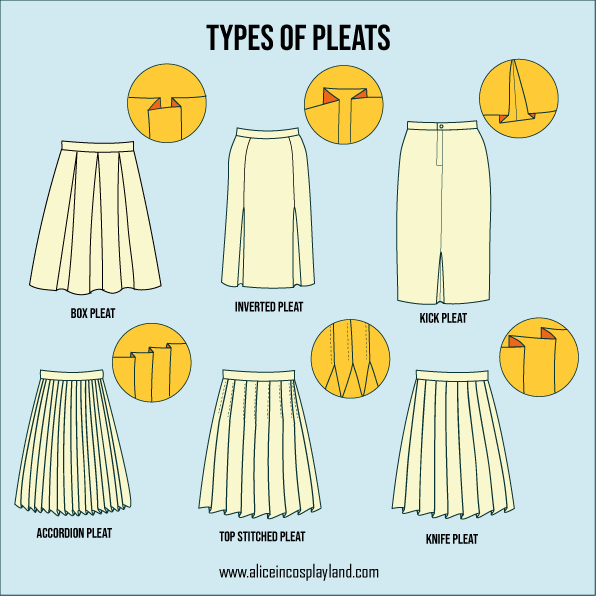
- 搜索plait则会得到下面这张图

# denude
de- => away, 也可以表示加强 nude- => to strip => to strip or divest of all covering, lay bare => to remove the covering of something, especially land
- Mining would denude the forest => 引申为 take away sth from
- In such areas we see villages denuded of young people.
# mellifluous☢
melli- => honey, 蜂蜜 flu- => flow, 流动 -ous => 像蜂蜜一样(顺滑地)流动的, 像蜂蜜一样甜美的 => (声音)悦耳的, (音乐)优美的, (气味)甜美的, (文笔)流畅的, 反正就是"具有蜂蜜流动的性质的"
- a deep mellifluous voice => 浑厚悦耳的嗓音(这里说明了翻译成"甜美的"并不是很恰当, 在汉语里面甜美的有一种娇滴滴的感觉)
- the mellifluous sound of the cello
# melli-
- melliferous => 产蜜的
- mellifluence => the property of being mellifluous
- mellifluent => mellifluous
# cronyism
crony => very close friend, 密友 cronyism => “密友主义”? => 指领导人给自己的朋友安排工作, 任人为亲, 任用亲信
# downpour
侧重sudden, unexpected, heavy rain 瓢泼大雨(pour), 倾盆大雨(down, pour), 滂沱大雨
# effervesce
 v. 冒泡泡(像汽水一样)
v. 冒泡泡(像汽水一样)
- ex- => out
- ferv- => boil, 煮沸后会冒泡泡 => to bubble
- -esce => 表示动作的起始
# unimpeachable
un-
impeach => 弹劾
-able => 无法弹劾的 => 弹劾意味着官员犯了罪 => 无法弹劾的就是"品格高尚的, 无可挑剔的, 无法指摘的", completely honest and reliable.
He is a man of unimpeachable integrity and character
unimpeachable proof => 确凿的证据
# prolix
pro- => forth lix => liquere, to flow => pour out => 说话就像倒水一样, 一发不可收拾 => verbose, lengthy, 啰嗦的, 长篇大论的, 冗长的
- The author’s prolix style has done nothing to encourage sales of the book.
# nondescript☢
non + descript 都没有什么能够描述其特点的东西 => 平平无奇的, 平庸的, 平常的, 不起眼的, undistinguished, ordinary, dull, commonplace
- Her clothes told me nothing: they were as nondescript as it was possible to be.
# categorical
不是"类别的"的意思! 应该是 “像类别一样的, 界限分明的, 没有任何模糊空间的, 确定无疑的, 明确的”
without any doubt or possibility of being changed 确定无疑的,明确的
a categorical statement/reply/assurance
# duplicity
dishonest talk or behaviour, especially by saying different things to two people
du + plic => uplic- => two fold, duplicate ity- => the state of being double, double-minded, treacherous
# epithet☢
epi- => in addition, 例如 “epilogue” thet => to put, set => to put additionally, to add on, => 除了一个事物本身的名字以外的描述 => descriptive name for a person or thing => an adjective added to a person’s name or a phrase used instead of it, usually to criticize or praise them (褒贬皆可)
- The singer’s 104-kilo frame earned him the epithet of “Man Mountain” in the press.
# gripe☢
抱怨, 发牢骚, a strong complaint, => gripe 之前还有肠绞痛的意思(produce a gripping pain in the bowels) => (肚子疼得)发牢骚 => 引申到一般的"发牢骚, 抱怨"
# intercessor
a person who intercedes => 调解者, 说情者, 求情者
# savvy
这个单词很有意思, 两个 v 连在一起. 注意读音/ˈsæv.i/
- If you describe someone as having savvy, you think that they have a good understanding and practical knowledge of something.[informal]
- He is known for his political savvy and strong management skills.
- Synonyms: understanding, perception, grasp, ken
- If you describe someone as savvy, you think that they show a lot of practical knowledge. [informal]
- She was a pretty savvy woman.
- Synonyms: shrewd, sharp, astute, knowing
之所以这个词看起来很不"英语", 是因为这个词是法语混杂西班牙语(两个语言混在一起叫"pidgin"), French savez(-vous)? “do you know?” or Spanish sabe (usted) “you know,”
- savvy是加勒比海盗里面Jack的口头禅, 相当于"懂不?", 你可以在油管上看Captain Jack说3分钟"savvy" => Capt. Jack Sparrow all SAVVY moments. - YouTube
# effluvium
e- => ex- “out” fluvium => fluere => flow => to flow out => 后来引申为(泄露, 排放的)令人不快的物质
# ruminate
rumin- => 反刍 -ate => (动物)反刍 => 引申到人的思想过程 => 反复思考, 反复考虑, 长时间思考
- She ruminated for weeks about whether to tell him the truth or not.
英语里面还有一个词的意思和ruminate类似:
# regurgitate
- to bring back swallowed food into the mouth (使)(咽下的食物)返回到口中; 不是为了继续咀嚼, 而是为了吐出来, 比如喂幼崽.
- Owls regurgitate partly digested food to feed their young. 猫头鹰将半消化的食物吐出来喂幼鸟。
- [disapproving] If you regurgitate facts, you just repeat what you have heard without thinking about it. (不加思考地)重复;照搬;照本宣科
- Many students simply regurgitate what they hear in lectures. 很多学生只会鹦鹉学舌般地重复从课堂上听来的东西。
原封不动地使用学到的知识, 这个引申义和 ruminate 的含义几乎是相反的, ruminate knowledge 是为了更好地理解, 而 regurgitate knowledge 是完全没有任何理解的.
# bluff☢
bluff(吓唬):玩扑克牌时的虚张声势 玩过扑克牌的人应该都知道,在玩牌时,人们往往会虚张声势,明明抓了一手烂牌,却摆出一副胸有成竹、志在必得的模样,吓得对方不敢出手,从而在游戏中获利。这种虚张声势在英语中就叫做 bluff。这个单词最早出现于美式英语中,可能来自荷兰语 bluffen(吹嘘)。它原本仅仅是一个玩扑克牌的专业术语,但现在已经广泛应用于各种场景。 bluff:[blʌf] n.v.吓唬,虚张声势
# brazen
brazen - brazen 源自古英语 braes ‘brass’(黄铜),所以有时用作 brass 的形容词,表示“黄铜制的”或“黄铜般的”,但在现代英语中更常用以表示“脸皮厚的”或“厚颜无耻的”。以 brass(黄铜)喻指厚颜这一用法可以追溯到伊丽莎白时代(1558-1603)。《牛津英语词典》1642 年的一条引语对此作了解释:“His face is of brasse, which may be said either ever or never to blush.”厚颜者也许从未脸红过,故其脸犹如黄铜制的。有一短语 as bold as brass 常用作 brazen 的同义语,也表示“厚颜无耻的”。
- 黄铜做的脸皮 => 不会脸红的 => 厚颜无耻的
例
- How can you believe such a brazen lie? (FWF) 你怎么能相信如此无耻的谎言呢?
- I could not do anything so brazen as that. (CCE) 我不会做出那样不要脸的事。
- There were instances of brazen cheating in the exams. (CID) 考试中有明目张胆的作弊行为。
# cavort
to jump or move around in a playful way, sometimes noisily, and often in a sexual way 雀跃;嬉戏玩闹;(常指)调情玩乐
- They were spotted cavorting beside the swimming pool.
Cavorting requires a good mood, lots of energy, and some running room. Children love to cavort, and so do parents when they win the lottery. The origins of the word are unclear, perhaps coming from the word curvet, meaning “leap gracefully or energetically,” and leaping is a great addition to any cavorting. There are lots of synonyms, so if you ever get tired of cavorting, you could always prance, frolic, lark, rollick, romp, or carouse. The choice is yours.
有可能是从 curvet 这个单词来的, 意思是"a leap by the horse", 所以在英语里面更像是"马跃"
# croon☢
低声吟唱, 低语, to sing or hum in a quiet and gentle voice.
- To croon is to sing a soft or emotional song. A father might croon a lullaby to his baby as she falls asleep. Elvis Presley was known to croon to the ladies.
最开始的意思是 to bellow like a bull, => 像牛一样哞哞叫
# default
default 还可以作为动词, 表示"fail to act (a legal responsibility)", 比如违约, 拖欠债务等等
- People who default on their mortgage repayments may have their home repossessed.
# diatribe
dia- => away tribe => to wear, rub => a wear away (of time), a waste of time => 写文章, 说话只是为了抨击某个人或事 => 怒斥, 檄文(noun)
# ensconce☢
en- => make, put in sconce => “small fortification, shelter” => to cover with a fort => 安顿, 安置 => (引申到人)“安坐”, “ensconce yourself” => “舒舒服服地坐着”
- After dinner, I ensconced myself in an armchair with a book.
# evict☢
e- => ex- => out vict => conquer => expel (by legal process), recover property by judicial means => to force sb to leave somewhere, usually because he/she has broken a law or contract.
# fecund
“多产的, 肥沃的” The adjective fecund describes things that are highly fertile and that easily produce offspring or fruit. Rabbits are often considered to be fecund animals, and you may hear jokes in poor taste about people reproducing like rabbits if they have a lot of children.
The word fecund comes from the Latin word fecundus, meaning fruitful. But the English word does not just describe something or someone fertile, the adjective fecund can also be used to describe someone who is innovative or highly intellectually productive. Your fecund imagination will be an asset if you have to tell ghost stories around the fire at camp while eating s’mores but that same fecund imagination could be less helpful if you’re at home alone on a stormy night and you think you hear a knock at the door!
# giddy☢
If you’ve ever spun in circles until you fell to the ground laughing, you know how it feels to be giddy. This adjective can mean dizzy, elated, or — as in the spinning around example — a lightheaded, lighthearted combination of the two.
- 除了"晕", giddy还用来形容因为激动高兴而不能正常思考的状态"飘飘然的"
The hackneyed phrase “giddy as a schoolgirl” calls forth the image of a kid giggling with her friends over some adolescent foolishness. Giddy has been used to describe someone incapable of serious thought or easily excited as far back as the 16th century. Given that, in modern usage, giddy describes someone silly and frivolous, it’s interesting to know that the Old English source for this word has a slightly darker tinge: gidig means “insane” or “god-possessed.”
# incursion☢
in- curs- => run, 跑 比如"precursor" -ion => run in (hostilely) => 侵犯, 入侵, 介入(noun)
When an army crosses a border into another country for battle, they are making an incursion into enemy territory. An incursion is an invasion as well as an attack.
Incursion can also be used to describe other things that rush in like an army such as an invasive species into a new region or floodwaters entering your home. When an airplane heads onto a runway it is not supposed to land on, risking airport safety, it is known as a runway incursion. And an incursion of cold air could make September feel like December.
# malaise☢
If you are experiencing malaise, chances are you are feeling blue or looking green. Malaise is a slump; you’re not feeling your best — either mentally or physically.
Mal is French for “bad,” and aise means “ease.” When experiencing malaise, ease yourself down on the couch to recover. Malaise is frequently used figuratively to describe slumps that other things go through as well. The 20-year economic malaise in Japan is one example, but you’ll also hear of educational malaise, political malaise, and even “a general malaise.” Wherever you turn, there’s malaise.
- a general feeling of being ill or having no energy, or an uncomfortable feeling that something is wrong, especially with society, and that you cannot change the situation
身体不适;萎靡;心神不宁;(尤指对社会的)不满,无奈
- They claim it is a symptom of a deeper and more general malaise in society.
- We were discussing the roots of the current economic malaise.
# myriad
来自希腊语 myrias, 大量的,无数的,一万,可能来自 meu, 流动,流出,水流,词源同 emanate, marine. 即由流动的水引申词义丰饶的,许多的,无数的。需注意的是,该词在古希腊语为单个词所表示的最大数。词义演变比较 abundant.
比最大的计量单位还大 => 不可估量的, 许多, 无数
Myriad comes from the Greek myrioi, the word for ten thousand, or less specifically, a countless amount. Myriad can be a noun, like a myriad of choices, or an adjective, like when you study myriad subjects in college. If you lift a rock you might find a myriad of bugs. Sticklers often look down their noses at using myriad as a noun, but that usage came first.
# parry
parry 和 parachute 的词根是一样的, para- 表示保护, defend, 在这里 parry 保护的方式是"躲避, fence, dodge, avoid", 无论是 physically 还是 verbally.
Sword fighters thrust and parry. To thrust is to try to stab, and to parry is to avoid getting stabbed by blocking a thrust. Though it comes from fencing, parry is also handy in dodgeball and awkward conversations
The word parry means to block or evade a movement, like in fencing, but it can also refer to an evasion that is verbal rather than physical. If someone asks you who you have a crush on, but you don’t want to answer, parry the question — change the subject or ask a question in return. When used in this way parry retains its sense of defending yourself through evasion.
# petulant☢
耍小孩子脾气的, 偏贬义的一个词, 可能是受单词"pet"的影响? pet => 除了"宠物"还有"宠儿, 掌上明珠"的意思(偏贬义) => 掌上明珠是想要被宠爱的 => 像小孩一样peevish, 觉得自己不是最重要的就生气的
- Choose the adjective petulant to describe a person or behavior that is irritable in a childish way.
The adjective, petulant, is a disapproving term used to describe a bad-tempered child, an adult behaving like an angry child or behavior of this type. Angry or annoyed mean the same thing, but if you choose the word, petulant, you are indicating that it is unreasonable or unjustified. Petulant came to English in the late 16th century from the Latin petulantem “forward, insolent” but was not recorded to mean childishly irritable until the late 1700s.
# preposterous
字面上理解就是 pre => before, poster => behind, ous => …的, before-behind => 颠三倒四的, 不符合常理的, => 十分愚蠢的, 荒谬的
To a vegetarian, the idea of eating a 52-ounce T-bone steak would seem preposterous — absolutely absurd.
When the word preposterous was first used, it meant reversing the normal order of things — putting what was last first, and vice versa. Imagine putting on your underwear over your pants and you’ll see that there’s a kind of absurdity in something that’s backwards, which is why preposterous came to mean “ridiculous.” The word is often used as part of an exclamation: a chef who is asked to cook with nothing but jelly beans might exclaim, “That’s preposterous!”
# refractory☢
“stubborn, obstinate, perverse, resisting, unyielding,” from past participle stem of refringere “to break up”. The notion is said to be “breaking back” all attempts to enforce obedience. “宁为玉碎”, 即使要 break 很多东西也要…的 => difficult to deal with, unwilling to obey
# retouch
“重新碰” => 润色, 修整, 修饰
- We had the wedding photos retouched to make it seem like a sunny day.
# retrench☢
re- => back trench => to cut, 比如 truncate => to cut backwards => 削减, 减少(开支)
# rickety
rickets 是佝偻病, 佝偻病是指儿童的骨骼变得柔软和脆弱,通常是由于维生素 D 的极端和长期缺乏所致。罕见的遗传问题也会引起佝偻病。
rickety 就是"换了佝偻病一样的" => 快要散架了的, 摇摇晃晃的, 不结实的
a rickety chair.
一个长得很像的单词: cricket => 板球运动, 蟋蟀
# sepulchral
Something that reminds you of death is sepulchral. A dreary, misty graveyard at night usually feels sepulchral. 阴森恐怖的
- The curtain rose to reveal a gloomy, sepulchral set for the play.
A sepulchre is a tomb or a crypt — a kind of stone room meant for burying a dead body. Something that’s sepulchral reminds you of a sepulchre, either because it looks or feels like an actual tomb, or simply because it makes you think of death or dying. An empty building might be sepulchral, or a gloomy gathering. The Latin root word is sepelire, “to bury or embalm.”
# shipshape
- ship, 船,shape, 形状,布置。比喻用法,因船行海上多风浪,所以船上的物品摆放必须牢固整齐,因而引申该词义。
- The builders have gone, but it’ll take a while to get things shipshape again.
# snub☢
To snub is to ignore or refuse to acknowledge someone. If you want to snub your former best friend, you can refuse to even look at her when you pass in the hallway.
- I think she felt snubbed because Anthony hadn’t bothered to introduce himself. 冷落, 怠慢, 忽视
When you snub someone, you deliver an insult by pretending to not even notice someone that you know. There’s an element of disdain and rejection to a snub, as if you’re too good to even acknowledge the person. As a noun, a snub is that act of cold rejection. Your former friend probably noticed the snub, and she’ll probably snub you from now on. Snub also means “very short,” like the nose on a bulldog.
嗤之以鼻有点不一样, 也有点相似(冷落, 奚落, 傲慢): 嗤之以鼻是一个汉语成语,读音为chī zhī yǐ bí,意思是:用鼻子轻蔑地吭气,表示瞧不起;用鼻子吭气,表示看不起;用鼻子吭声冷笑,表示轻蔑。
# thick-skinned
这个单词不能翻译成"厚脸皮的", 因为在汉语里面"厚脸皮的"通常是贬义的. 或者说, thick-skinned可以理解成偏褒义的"脸皮厚" => 不在乎外界的批评, 不会轻易被困难打击
Is “thick-skinned’ a positive comment in American English?
“Thick-skinned” means someone is not upset or offended over trivial things. They may even shrug off insults. It’s generally positive but it’s a quality that if taken too far becomes insensitivity. It doesn’t mean “shameless”.
The opposite — “thin-skinned” — is always negative. Someone who is thin-skinned takes offense too easily and interprets even positive criticism as an attack. 类似于"玻璃心的”?
British English has the term “brass necked” meaning “shameless”. For example: “Your brother has got a real brass neck. I can’t believe he’s handing out business cards at your dad’s funeral!”
# trifle
trifle是一种甜点:
 也许是因为 trifle 是"小"甜点? (不过看起来并不小啊), 所以 trifle 又用来防泛指琐碎的东西, “小零碎, 小玩意儿” unimportant things
也许是因为 trifle 是"小"甜点? (不过看起来并不小啊), 所以 trifle 又用来防泛指琐碎的东西, “小零碎, 小玩意儿” unimportant things
- I brought a few trifles back from India - pieces of jewellery and fabric mainly.
trivial => having little value or importance
# unanimous
un- => one, 来自拉丁语 unus anim- => life, spirit, 生命, 精神等 -ous => “合一的, 所有人就像是同一个人一样, 没有任何冲突” => 全部同意的, 意见一致的, 一致通过的
# anim-(生命):代表生命之源的灵魂
古代人认为生命的本质是因为灵魂的存在。在拉丁文中,灵魂分为阴性和阳性两个单词,既阴性的anima(阿尼玛)和阳性的animus(阿尼姆斯)。表示生命的词根anim就来自这两个拉丁文。由于生命和灵魂密不可分,所有词根 anim 既有“生命”、“能动”的含义,也有“精神”、“心”的含义。
- anim-:生命,能动,精神,心
- anima: [‘ænɪmə] n. 灵魂,生命;神圣之灵
- animus:[‘ænɪməs] n. 敌意;意图, 基本态度;女性的男性意向(卡尔荣格提出的一个心理学概念)
- animosity:[‘ænə’mɑsəti] n. 憎恶,仇恨,敌意
- animal:[‘ænɪm(ə)l] n. 动物,有生命能动的
- animate:[‘ænɪmet] vt. 使有生气;使活泼;鼓舞;推动 adj. 有生命的
- animation:[,ænɪ’meʃən] n. 动画,原意是使其具有生命,使其动起来
- unanimous:[juː’nænɪməs] adj. 全体一致的
- equanimity:[,ɛkwə’nɪməti] n.(心情)平静坦然
# amorphous
a- => 没有 morph- => form, shape, 源自希腊语"morphe" -ous => 没有形状的, 无定形的, having no fixed form or shape
# morph-(形态):梦神摩尔甫斯
摩尔甫斯(Morpheus)是希腊神话中的梦神,是睡神 Hypnos 的儿子,掌管人们的梦境。摩尔甫斯能够形成、塑造人们的梦境,还能以各种形态出现在人们的梦境中。摩尔甫斯通过梦,向人们传递神的旨意。摩尔甫斯的形象通常是一个背长双翼的俊美男子。由于太忙,摩尔甫斯没有结婚,不过也有人说彩虹女神伊里丝跟他是两口子。 梦神的名字 Morpheus 在希腊语中是“形态制造者”之意,来自希腊语 morphe(形态)。英语单词 morphine(吗啡)就源自梦神的名字 Morpheus,因为吗啡具有梦境一样的止痛作用。英语词根 morpho-/-morph(形态)同样源自希腊语 morphe(形态),在科学领域应用极其广泛。
- morpho-/-morph:形态,态
- morphine: [‘mɔːfiːn] n. 吗啡
- morphic:[‘mɔ:fik] adj. 形态学的,语形学的
- amorphous:[ə’mɔrfəs] adj. 无定形的
- morphology: [mɔr’fɑlədʒi] n. 形态学,形态论;词法,词态学
# canon☢
canon ≠ cannon
cannon是加农炮的意思, 也就是下面这个玩意儿

而Canon则是佳能相机的意思
Canon, 注意少了一个n, (one “n”) refers to a collection of rules or texts that are considered to be authoritative. Shakespeare and Chaucer are part of the canon of Western literature, so you might read their work in an English class.
A canon can also be a body of work, like the Shakespeare canon, which includes all of the Bard’s plays and poems. These days, many schools and colleges include more diverse and underrepresented authors in literature classes and encourage students to read works not included in the standard literary canon. The literary canon can change with time, and so can the cultural canon. Don’t confuse this word with cannon with two n’s, the big gun that shoots bowling-size balls at the enemy.
Canon是一个有宗教背景的词汇:
- a Christian priest with special duties in a cathedral 大教堂教士
- a rule, principle, or law, especially in the Christian Church 原则;准则;法规;(尤指)基督教教规
应该是后来才有了"作品全集"这个意思
# despot☢
暴君 英语单词 despot 来自希腊语的 despotes,本意是“一家之主、领主”。该词的前一半来自 domestic(家庭的、国内的),后一半来自 potent(有力的)。古希腊的一家之主对于家中成员和奴隶拥有绝对权威,因此 despot 一词含有“独裁、暴虐”的含义。在拜占庭帝国,despot 曾被用于宫廷贵族的称号、诸侯国亲王的称号,甚至被用作拜占庭帝国皇帝的称号。现在,despot 常用来表示那些独裁、暴虐的一国之主。
- despot: [‘despɒt] n. 暴君,专制君主,独裁者
- despotic:[dɪ’spɑtɪk] adj. 暴虐的,暴君的;专横的
- despotism: [‘despətɪz(ə)m] n. 独裁,专制,独裁政治
# impeccable
im- => not, opposite pecc- => to stumble, sin -able => faultless, 无懈可击的, perfect
# pecc-
peccadillo 来自西班牙语, 过失, 小错误, peccable 容易犯错的
# detain
de- => from, away tain => to hold => to hold off, keep back, withhold => 关押, 拘留, (不一定是执法机关, 比如医院强制让一个病人留在那里也叫detain, 可以翻译为"留院观察", discharge也是这样, 既可以用于医院也可以用于监狱)
- A suspect has been detained by the police for questioning.
=> (短时间的)耽搁, 延误
- Thank you. We won’t detain you any further.
# taciturn
tac-,tic-,retic- = silent, 表示“安静”。源自拉丁语 tacere “to be silent.”
Someone who is taciturn is reserved, not loud and talkative. The word itself refers to the trait of reticence, of seeming aloof and uncommunicative. A taciturn person might be snobby, naturally quiet, or just shy.
Having its origin in the Latin tacitus, “silent,” taciturn came to be used in mid-18th-century English in the sense “habitually silent.” Taciturnity is often considered a negative trait, as it suggests someone uncommunicative and too quiet. Jane Austen wrote, “We are each of an unsocial, taciturn disposition, unwilling to speak, unless we expect to say something that will amaze the whole room, and be handed down to posterity with all the éclat of a proverb.”
- reticent => unwilling to speak about your thoughts or feelings 沉默寡言的;不愿交谈的
- reticence
- tacit
- 不说话 => 默认的, 暗中的
- Something tacit is implied or understood without question. Holding hands might be a tacit acknowledgment that a boy and girl are dating.
- The adjective tacit refers to information that is understood without needing to acknowledge it. For example, since we know that the sky is blue, that kind of assumption is tacit. Lawyers talk about “tacit agreements,” where parties give their silent consent and raise no objections.
# stoke
To stoke is to poke a fire and fuel it so that it burns higher. Stoke can also mean “incite"(figuratively) — a principal’s impassive silence in the face of requests for more tater tots might stoke the flames of student anger.
 When a surfer says, “I am so stoked,” it means she is excited — the fire of enthusiasm is burning hotter. It’s interesting to reflect on how many words in our language have to do with the tending of fires, an activity that has become much less common in recent human history.
When a surfer says, “I am so stoked,” it means she is excited — the fire of enthusiasm is burning hotter. It’s interesting to reflect on how many words in our language have to do with the tending of fires, an activity that has become much less common in recent human history.
煽动 => 有趣的是汉语里面的这个词也和火有关, 只不过汉语是扇风, 英语是"拨旺(炉火)” incite, stir up, instigate; incite; arouse; foment; provoke
# foment
Stand outside the school cafeteria passing out flyers with nutritional details on school food, and you may foment a revolution — foment means stirring up something undesirable, such as trouble.
You would never say, “Hooray, we fomented a revolution.” Instead you’d say, “Those good for nothing scalawags fomented the rebellion.” Don’t confuse foment and ferment. Ferment can mean “to stir up” in a good way — a football game can ferment excitement in a town, or foment trouble through traffic tie-ups and litter.
# supersede
super- => above sede- => to sit => 坐在…的头上, => 取代老的事物
- Hand tools are relics of the past that have now been superseded by the machine.
# aversion
厌恶, “反"感 a- => off, away, vers => to turn -ion => a turning away from => 看到不喜欢的东西想要躲开 => 厌恶, 反感, 痛恨, strong dislike of sth
# defer☢
defer 除了"延期"的含义以外, “defer to someone” 还可以表示”(出于尊敬或者权威而)服从"的意思,
- Doctor are encouraged to defer to experts.
所以 deference 就是名词版本的"顺从, 尊敬, 服从"
- She covered her head out of deference to Muslim custom.
# opprobrious☢
op- => in front of, before probr => probum, reproach, infamy -ious => reproach in front of…, expressing scorn, disgrace, contempt => 谴责的, 恶毒的, 令人不齿的
Opprobrious is a heavy-duty word to describe something taunting or shameful. Opprobrious words criticize in a mean, hurtful way.
Opprobrious comes from the Latin opprobare which means “to reproach or taunt.” If someone is being opprobrious, she’s being abusive and mean. Insults are opprobrious, while constructive criticism is not. No one wants to be treated in an opprobrious way. We can also use this word for bad behavior that causes shame — someone cheating on a test is opprobrious. Opprobrious actions are disgraceful, ignominious, and inglorious.
# dais☢
dais是13世纪借自古法语deis的,所以原词形也是deis,原指设在平台上专供贵宾使用的桌子,取的是拉丁语discus的另一词义“桌子”。到了16世纪deis从英语里消失了,只保留在苏格兰语里。到了19世纪,苏格兰小说家及诗人司各特(Sir Walter Scott, 1771-1832)才又起用了这个词,但用的是近代法语的拼法dais,仍指“讲台”或“主席台”。
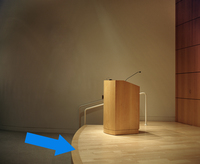
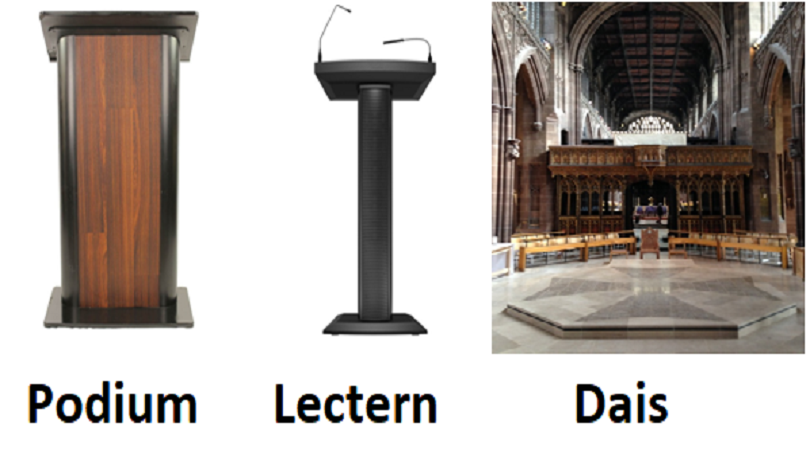
# abstain☢
abs- => off, away from -tain => to hold, 例如"contain" => withhold, to hold back, refrain, keep off => 戒, 戒绝 (某个不良嗜好)
to abstain from alcohol/smoking/sex => (选举时)弃权
abstain 单词的构造和 withhold 非常像, withhold 里面的 with-表示"向后, 相反"
# -tain: to hold
- attain => at・tain => at- 表示加强, 达到, 获得
- obtain => ob・tain => ob- 也表示加强, 达到, 得到
- contain => con・tain => con- 这里也应该表示强调, 包含, 容纳
- maintain => main・tain => main- -> hand => 保持, 维护
- entertain => enter・tain => hold together?
- detain => de・tain => de- => off, 拘留, 耽搁
- pertain => per・tain => per- through -> hold through, => belong to, te attached legally
- retain => re・tain => re- back => to hold back, 保留
- sustain => sus・tain => sus- ->under, beneath => 在下面 hold, 支持, 支撑
# forbear☢
for- => 完全, very much bear => 忍受 => 完全忍受, 完全克制 => 自制, 克制 to prevent yourself from saying or doing something, especially in a way that shows control, good judgment, or kindness to others
- forbearance => noun.
# illuminati
- 光照会, 光明会(拉丁语:Illuminati)是 1776 年 5 月 1 日启蒙运动时成立于巴伐利亚的一个秘密组织。该组织经常被各种阴谋论指控参与控制全世界的事务,透过掌握货币发行权、策划历史事件,并安插政府和企业中的代理人,以获得政治权力和影响力,最终建立一个“新世界秩序”
- 或者, 指的是漫威里面的秘密英雄组织:
当当当~ 你能认出几个?

# husband☢
husband 还可以是个动词, 表示"节约地使用"
- husband precious resources
# disabuse
dis- => apart abuse => 侮辱, 毁谤 => “消除毁谤, 让毁谤和受害者分开” => free from mistake, fallacy, or deception
- He thought that all women liked children, but she soon disabused him of that (idea/notion).
# puckish
- liking to make jokes about other people and play silly tricks on them 顽皮的,淘气的
puck【淘气小妖】 + -ish 形容词后缀。 Puck 是凯尔特神话和英国民间故事里恶作剧的小精灵,又叫 Robin Goodfellow. 莎士比亚的《仲夏夜之梦》中,正是这个家伙将年轻的恋人们的生活弄得一团糟。
# labile☢
prone to lapse => changing often or easily
- emotionally labile characters
# minuscule
extremely small
The film was shot in 17 days, a miniscule amount of time.
原来指的是小写字母 “minuscula”,在早期的拉丁字母体系中并没有小写字母,公元4世纪–7世纪的安塞尔字体和小安塞尔字体是小写字母形成的过渡字体。公元8世纪,法国卡罗琳王朝时期,为了适应流畅快速的书写需要,产生了卡罗琳小写字体,传说它是查理一世委托英国学者凡·约克在法国进行文字改革整理出来的。它比过去的文字写得快,又便于阅读,在当时的欧洲广为流传使用。它作为当时最美观实用的字体,对欧洲的文字发展起了决定性的影响,形成了自己的黄金时代。 Source
# anomaly☢
异常, 这个单词乍一看好像是 a+normal 组成的,但是实际上是 an+homalos(homos)
an- => not
homalos => even, from “homos” => same not even, not the same, unevenness, derivation from the common rule.
形容词: anomalous
# defuse☢
de- => remove fuse => 炸弹的引信 => 移除炸弹的引信 => 拆除炸弹 => 拆除炸弹也就解除了一个紧张的情况 => 引申为"平息某个危险或者紧张的情况"
defuse the crisis/tension
这个词是近代才出现的(要先有炸弹才能造这个词) 不要和 diffuse 弄混了
# impenetrable
im + penetrat(e) + able => 无法穿透的
=> 引申到思想, 文字, => 一个费解的情况, 文字, 思想就像一团无法被理智"刺穿"的迷雾 => 费解的, 看不破的, impossible to understand
# bumble
To bumble is to move or speak in an awkward, fumbling way. You might bumble your way through your first dance performance, tripping over your own two feet.
When you bumble, you walk unsteadily or speak with a stutter. You can also bumble something, or completely mess it up. An inexperienced teacher might bumble her attempts at managing a huge class of middle school students, and you might worry that you’ll bumble your first interview as a radio reporter. Bumble was first used in the 1500’s, and it’s probably an imitative word, or one that sounds like what it means.
# bumblebee
大黄蜂, 为什么大黄蜂叫 bumblebee 呢? 其实大黄蜂本来不叫这个名字, Darwin 给大黄蜂起的名字原来叫 humblebee => 因为蜜蜂一直都在嗡嗡叫(hum)
# hangdog
在中世纪的欧洲,给人类造成死亡或伤害的动物,像人一样,也要受到起诉和审讯。因这些罪行而受到起诉并被判死刑的动物有老鼠、猪、狗及毁灭庄稼的害虫。有记载说,1595年在荷兰西部城市莱顿(Leyden)有个小孩被狗咬伤手指致死,这条狗因此被人们吊死。狗被吊死之事莎士比亚在他的剧作中曾提到过五次。hangdog一词很可能即由此而来,常用于a hangdog look这一搭配,17世纪末此语原指“卑怯的样子”,如今多表示“羞愧的神态”或“自觉有罪的样子”,hangdog现在常用作形容词,表示“羞惭的”或“感到有罪的”。
例 a hangdog look/expression 羞愧的神情/表情
A hangdog look is one that betrays a feeling of shame, embarrassment, or fear. Your hangdog expression after sneaking a whoopee cushion onto your teacher’s chair is a dead giveaway that you’re guilty.
Use the adjective hangdog to describe someone’s cowering appearance or the sheepish look on her face. You might have a hangdog look if you’re afraid of getting in trouble, or if you regret your actions. The now-obsolete root noun hang-dog was used in the 17th century to mean “a despicable, low person,” or someone who’s “only fit to hang a dog,” or sometimes “only fit to be hung (like a dog).”
- 还真有几分神似


# kindred☢
Your kindred are your people. If you say are going to visit your kindred during the holidays, that means you are going to visit your relatives.
The word kindred can be used as either an adjective or a noun. The noun version is somewhat archaic — you are more likely to encounter this word in classic literature than in casual conversation. You may be more familiar with the adjective version of the word, which has gained popular usage in the term “kindred spirit” or “kindred soul,” which is used to describe those who share similar attitudes, characteristics, or beliefs.
“of a similar kind” => 这样要好记一点
- They sell dried fruit and nuts and other kindred products.
# mash & smash
mash = make sth into a paste during cooking smash = fighting, destroying something
mash means to make something into a paste so you can eat it (usually potatoes or vegetables) smash means to crush something into small pieces by hitting/punching/destroying it
# obeisance☢
obeisance 不是 obey 的名词, obedience 才是 obey 的名词形式.
An obeisance is an act, usually physical, showing dutiful obedience. A supplicant might perform obeisance, touching his face to the ground, before humbly asking for help. obeisance是出于礼仪和尊敬的打招呼
Obeisance is often used in historical or religious contexts and often refers to bowing or kneeling. Figuratively, it means an act of respect though sometimes with the negative connotation of slavishly doing as expected. Your boyfriend might bring you and your mother flowers in obeisance to the idea that the parents should be courted as much as the child. Consumers who want this software must show obeisance to the Internet — it can’t be bought in a store or anywhere else.
# prudent & prudish
prudish是从prude来的, 但是prudent不是从prude来的, 即使它们长得更像.
- prudent prudent是一个褒义词
Describe an action as prudent if it is the wise thing to do under the existing circumstances. If you’re getting in trouble, it is probably prudent to keep your mouth closed and just listen.
If you show good and careful judgment when handling practical matters, you can be described as prudent. Similarly, a wise and well-thought-through decision or action can be called prudent. The word comes from a contracted form of the Latin prōvidēns, from the verb “to foresee.” The English word provident, “wise in planning for the future,” is the non-contracted descendent of the same Latin root.
- prudish prudish 则和 prude 一样, 都是偏贬义的.
To be prudish is to be extremely proper, almost a little too proper. To be called prudish isn’t a compliment.
To be proper is to be polite and have good manners. To be prudish is to take being proper to an exaggerated or ridiculous degree. For example, it’s definitely a bad idea to use a naughty word in class, but a friend who scolds you when you use it privately could be considered prudish. They’re going a little too far. Prudish behavior is also called priggish, prim, prissy, puritanical, and straight-laced. Others usually think prudish people should lighten up.
# repeal☢
appeal 有"呼吁"的意思, repeal 的意思和 appeal 相反, 就是"不宣传了", recall 一个 appeal => 废除, 撤销(一个法案, 一条法律)
# suffuse
The verb suffuse means to spread and fill a space, like the way the smell of wildflowers might suffuse a meadow.
Suffuse is a synonym for steep. Like tea whose flavor grows stronger the more it steeps, when you suffuse something it spreads throughout until an area is full, or even overly full. Another synonym, infuse, looks a lot like suffuse. Both words come from the Latin word fundere, which means “to pour.”
# wrongheaded
执迷不悟的
Something that’s wrongheaded is foolish, misguided, and stubborn. A wrongheaded politician might run for president despite polls showing there’s no way he can win.
A wrongheaded entrepreneur may go ahead with her plans to open an ice cream shop for dogs despite being advised not to by everyone she knows. You might feel angry about a judge’s wrongheaded decision in an important court case. Anyone who uses bad judgement is wrongheaded, especially when the mistake seems obvious. The adjective wrongheaded has been around since the 1730’s.
# babble
类似于婴儿说话的方式 => 嘟囔, 啊吧啊吧, => 引申到兴奋含糊难懂的说话方式, 乱哄哄的声音 => 还可以用来形容溪流的"潺潺作响",
- To babble is to talk on and on without a particular goal. It might drive you crazy when your little sister babbles endlessly about her favorite video game.
- The children babbled excitedly among themselves.
- She was babbling something about her ring being stolen.
# jabber
to speak quickly and excitedly, which is very difficult to understand. 这个也是有点拟声的感觉(echoic), 加吧加吧, 啊吧啊吧, 叽里咕噜 “急促而含混不清地说”
When someone starts to jabber, they start talking on and on about this or that, or that or this, in an excited, sometimes incoherent way. Jabber is a close cousin to blabber.
When someone jabbers, sometimes their words seem to fly out of their mouths like quick punches (jabs!) from a boxer. Some examples of jabber? You know, like when someone has a hobby that you don’t really care about or understand but they won’t quit talking about it? Yeah, they jabber. Or your best friend is relating, without end, his excitement about the coming tiddlywinks championship and you comprehend neither the game nor its importance? That friend jabbers, too.
He’s always blabbering on about computers.
# besiege☢
siege => 围攻, 围困, (名词) besiege => 围攻, 围困 (动词)
# beleaguer☢
- besiege, surround, blockade
- be- => around
- leaguer => to camp => 在…周围安营扎寨, => 围攻 => 引申为 trouble persistently, harass, 困扰, 使烦恼
We have issues in our community that continue to beleaguer and plague us.
# hedonism☢
hedon- => 来自希腊语里面的 hedone, pleasure, -ism => 快乐主义 => 享乐主义
# euphemism☢
euphemism 始见于 17 世纪,源自希腊语 euphēmismós ‘speaking fair, speaking with good words’,其中 eu-相当于 good,phēmē相当于 speech,其成分的含义多少说明了该词的用法。euphemism 就是汉语中的“婉言”、“委婉语”或“委婉说法”。委婉语的作用在于替代直截了当、令人不悦或粗俗无礼的说法。euphemism 的反义词 dysphemism(粗直语)系由前缀 dys-(坏的)和 euphemism 合成,它产生于 19 世纪末期。
例
- ‘Maiden lady’ is a euphemism for ‘old maid’. “老小姐”(或“未婚妇女”)是“老处女”的委婉语。
- ‘Large’ is a word often used as a euphemism for the word ‘fat’.
- The article made so much use of euphemism that often its meaning was unclear.
- “Beautician” is the euphemism for a hairdresser.
# cacophony
caco- => harsh, bad, evil phony => sound => bad sound => a unpleasant mixture of loud sounds => 嘈杂的声音, 喧嚣,
如果说 symphony 是乐器"一起(sym-)“演奏的优美乐曲, 那么 cacophony 就是嘈杂的喧嚣, 两者的意思基本上是相反的.
# menstruation☢
menstru- => from Latin “mensruus”, which means “monthly”, from mensis “month” -ation => 每月的事 => 月事, 月经
# clasp☢
只要用一个"环"紧紧箍住某个东西就叫"clasp”, 所以可以是"抱住, 抓住, 握住…" A bracelet is held together by a clasp. A girl who gets a nice one from her boyfriend might clasp her arms around him. A clasp is a fastener. To clasp is to hold tightly.
In all uses of the word, clasp means to hold together tightly. You want your bracelet or belt clasp to be strong so it doesn’t come apart. And when you take a child on a walk across a busy intersection, you clasp their hand tightly. The word is not related to the word clap, but if you clap your hands together, then keep them there, you turn a clap to a clasp.
# commiserate☢
com + miser + ate => 一起悲伤 => 表示同情, 惋惜, to express sympathy to someone about some bad luck.
- I began commiserating with her over the defeat.
# conjure☢
con- => with, together jure => to swear (an oath) => 一起念咒语, => 用魔法变出, 召唤出, 变戏法
- The magician conjured up a dove from his hat.
conjurer, conjuror => 魔术师, 变戏法的人
# conspicuous☢
con- => 这里表示强调 spicu => to look at, observe ous => 很容易就看到的 => 显眼的, 醒目的
- In China, her blonde hair was conspicuous.
# crass
来自拉丁语 crassus => solid, thick, fat, dense => 引申为stupid and without considering how other people might feel.
A crass comment is very stupid and shows that the speaker doesn’t care about other people’s feelings. In today’s day and age, you don’t have to wear black to a funeral, but to show up in clown pants is simply crass.
The source of this adjective is Latin crassus, “thick, dense, fat.” A similar development of meaning can be seen in English dense in the sense of “stupid, slow to understand,” from Latin densus, “thick, dense,” and in English thick, which can also be used to mean “stupid.”
# curtail
cur- => to cut, from Latin curtus -tail => cut short, cut off the end of, 把尾巴剪短 => 减少, reduce or limit.
=> 这个单词听起来比较官方, 所以平时不怎么见到, 但是又没那么官方, 所以平时还是可以用
To curtail something is to slow it down, put restrictions on it, or stop it entirely. If I give up cake, I am curtailing my cake-eating.
Curtail is an official-sounding word for stopping or slowing things down. The police try to curtail crime — they want there to be less crime in the world. A company may want to curtail their employees’ computer time, so they spend more time working and less time goofing around. Teachers try to curtail whispering and note-passing in class. When something is curtailed, it’s either stopped entirely or stopped quite a bit — it’s cut short.
# beseech☢
be- + seek => to entreat, beg urgently
If you’re begging for something but you want to sound formal and a little old-fashioned, say “I beseech you!” It really captures how urgent and desperate you are, yet perhaps saves a shred of your dignity.
所以beseech是有点点礼貌的"恳请", 没有那种卑躬屈膝的感觉.
# entreat
这两个词的组成方式其实挺像的: en- + treat => to treat sb in a certain way, to treat => 招待对方, 给对方好处, 为了让对方同意自己的请求 => 恳请, 恳求, 请求, to try very hard to persuade someone to do something.
- We would spend every meal time entreating the child to eat her vegetables.
# deride☢
de+ride? 不骑? 其实在这里 rid 是 laugh 的意思, 和 ridicule 一样. de- => down ride => redere, to laugh => 居高临下地嘲笑 => laugh at in contempt, mock, ridicule, scorn by laughter.
- He derided my singing as pathetic.
# desiccate☢
The verb desiccate means to dry out, dry up and dehydrate. It’s helpful to desiccate weeds but certainly not crops.
As anyone who’s been stuck in the desert will tell you, being desiccated by the burning sun isn’t much fun. Stemming from the Latin word desiccare, which means to “dry up,” desiccate also means to preserve something by drying it out. Without desiccation, raisins or beef jerky would not be possible!
desiccative, desiccant => 干燥剂, 就是食品包装袋里面装着硅胶的那个小袋袋
# desiccate? dehydrate?
Desiccate is narrower in its range of reference and implies a complete deprivation of moisture, especially of vital juices, and often therefore, in its common extended use, a withering or shriveling. It is applicable to animal and vegetable products preserved by thorough drying or it may be applied to persons or to their attitudes, activities, or expression which have lost all their spiritual or emotional freshness or vitality. Desiccate 通常指代富有活力的,富有生命力的物质被脱水,也可以被用作比喻义,表示某种物质的枯竭:
- The global economy is desiccating by the day.
- He was politically and emotionally desiccated by the scandal.
Dehydrate implies extraction or elimination of water; it is often preferred to desiccate, of which it is a close synonym, when the reference is to foods. 而 Dehydrate 就是"脱水",用来指代并且只用来指代“脱水,干燥”这个过程。
# desultory☢
without a clear plan or purpose and showing little effort or interest. 散漫的,漫无目的的,心不在焉的
- skipping about, jumping, flitting, 来自 desultor, 马戏团里面在几匹飞奔的马上面跳来跳去的人,
- de- => down, sul => to jump, leap.
# diffident
lacking confident, distrustful (of oneself), wanting confidence in another’s power. dif- => away, fid => to trust, 比如 fidelity -ent => 对自己不信任的 => 不自信的, 羞怯的,
You shouldn’t be so diffident about your achievements - you’ve done really well!
# effulgent
ef- => ex-, out fulg => to shine, flash, 散发光辉 -ent => 光芒四射的, 璀璨的, 绚烂的, 灿烂的, 炫耀的, to shine out, to gleam forth.
- an effulgent canopy of stars
- her effulgent beauty
- an effulgent smile
# engross
en- => 使…
gross => 大 = greate
=> 使…大? => 其实是用大写字母书写的意思
=> 那为什么还有"使…着迷, 使…全神贯注"的意思呢?
=> engross 还有一个意思是"to write or type out formally (a deed, agreement, or other document) preparatory to execution", 也许是因为 engross 的都是一些很重要的文件, 需要全神贯注?

Engross is a verb that means to consume all of your attention or time. Once you engross yourself in the culture of high salaries and unlimited spending accounts, it’s hard to go back to cooking at a sandwich shop.
# fawn
fawn是小鹿的意思

 而 fawn, fawn over “巴结"这个含义来自另一个词源, 用来形容"小狗摇尾巴开心的样子”, 引申为"court flavor, grovel, act slavishly", 汉语里面也有类似的词: “摇尾乞怜” (汉语成语,拼音为 yáo wěi qǐ lián,指像狗那样摇着尾巴乞求主人爱怜。指卑躬屈膝地献媚、讨好,以求得到一点好处。出自唐·韩愈《应科目时与人书》)
而 fawn, fawn over “巴结"这个含义来自另一个词源, 用来形容"小狗摇尾巴开心的样子”, 引申为"court flavor, grovel, act slavishly", 汉语里面也有类似的词: “摇尾乞怜” (汉语成语,拼音为 yáo wěi qǐ lián,指像狗那样摇着尾巴乞求主人爱怜。指卑躬屈膝地献媚、讨好,以求得到一点好处。出自唐·韩愈《应科目时与人书》)
# germinate
开始形成;萌发 germinate 可以看作 germ 的动词, germ 是种子的意思(现在主要指细菌了)
# ill-bred
和汉语里面"没教养"是一模一样的
# inimical☢
hostile, enemy-like => 可以用 enemy 来辅助记忆, 词根是一样的, 就是两个 e 都变成了 i
# insouciant☢
漫不经心的, 无忧无虑的, 散漫的, nonchalant, casual, carefree in- => not souc => care, 例如 solicit -ant => 不关心的, => 漫不经心的
Only people with no real troubles can afford to be insouciant during times like these. Runway models are great at looking insouciant, strolling the catwalk apparently without a care in the world.
Some prefer their musical idols to be insouciant, seeming not to care what their fans think or want. Others like them more eager to please, happy to take requests and engage. The two obvious examples are Louis Armstrong and Miles Davis. Armstrong would smile and encourage the audience to participate, while Davis was the insouciant master who showed no concern for or interest in what his listeners might prefer: some people found his insouciant manner irresistible.
# moratorium☢
mora- => pause, delay tor(y) -ium => 暂停, 间歇
A moratorium is the suspension of a particular activity––you could have a moratorium on fishing, baking, the use of candles, the wearing of matching socks. Generally, moratoriums go into effect when something becomes seen as being not okay for now, but might go back to being okay later. After the water fountain started to burble up green sludge, the principal put a moratorium on drinking any water at school until the fountains were fixed and the water tested. 这是一个比较formal的词, 通常是一个offcial agreement
- a five-year worldwide moratorium on nuclear weapons testing
# mordant☢
mord- => mordere, to bite, nip, sting => 尖刻的, 尖锐的, 辛辣的 => 可以看到汉语和英语都喜欢用"尖"来形容语言的冷酷与刻薄, 或者鞭辟入里, 一针见血, 透彻, 切中要害, 充满恶意的话就像针一样让人刺痛, 鞭辟入里的语言也直击问题的症结.
- A wicked, mordant sense of humour has come to the fore in Blur’s world
# ostracize
公元前5世纪,古希腊雅典人民推翻僭主的独裁统治后,建立了民主制度。为了保卫民主制度,避免有野心的政治家恢复僭主政治,雅典人民实施一项称为“陶片放逐法”的政治制度。所有的雅典公民在一片陶片上刻上他认为可能危害雅典民主政治的人的名字,将陶片投入票箱。如果有人获得超过6000张选票且得票数第一,则被放逐,期限为10年。
陶片放逐法有助于雅典公民表达自己的政治意见,约束官员行为,但这种方式简单粗暴,在很大程度上取决于公民的情绪。因此陶片放逐法很容易成为政客党派斗争的工具。例如,雅典政治家阿里斯提德曾在参加陶片放逐投票的路上,被一个目不识丁的路人拦下,请他帮忙在陶片上刻下阿里斯提德的名字。阿里斯提德问他为什么想放逐阿里斯提德。那人回答“不为什么,我甚至不认识这个人。只是到处都在谈论他,说他是什么‘正义之士’,我实在是听烦了。”阿里斯提德平静地帮他在陶片上刻下自己的名字。投票结果揭晓,被放逐的正是阿里斯提德。公元前 415 年,雅典平民领袖海柏波拉斯被放逐,后来外国外被支持寡头政治的激进分子暗杀。此事在雅典人民中造成极大震动。从此后,陶片放逐法自然终止。
英语单词 ostracize 正是来自陶片放逐法。它源自希腊语 ostrakizein,而该词源自希腊语 ostrakon (陶片,瓦片,贝壳)。英语中 oyster、ostracean 等单词均与此同源。
ostracize: [‘ɑstrəsaɪz] vt. 放逐,排斥,排挤 ostracism: [‘ɒstrəsɪz(ə)m] n. 排斥,放逐,陶片放逐法 oyster: [‘ɒɪstə] n.牡蛎,生蚝,沉默寡言之人
# slouch☢
现代社会最常见的姿势之一: slouch



# snob
旧时在牛津、剑桥等英国大学的学生名册中,出身高贵的学生姓名后面标有 NOB 的字样,NOB 是 nobility(高贵的出身,贵族身份)一词的简略形式;出身平民的普通学生姓名则被标以 s. nob.,这是拉丁语 sine nobilitate ‘without nobility’(无高贵出身)的缩略。据认为,英语 snob 一词可能即由此而来,因此最初含有低贱者或平民之意。 长期以来剑桥师生曾一直用该词来指“市民”(townsman),以别于“穿长袍的大学师生”(gownsman)。snob 的今义据说是英国小说家萨克雷(William Makepeace Thackeray, 1811-1863)最先使用的。1847 年他出版了著名散文集《势利人脸谱》(Book of Snobs),这是由 45 个特写组成的英国社会各阶层势利人的肖像。他把英王乔治四世(George IV, 1762-1830)也称作 snob,因为他以“欧洲第一绅士”自诩,但身上却丝毫没有绅士的特征。经萨克雷这么一用,snob 成了一个常用词,现通常多指“势利的人”、“自以为懂行的人”或“自命不凡的人”。intellectual snob 是“自以为很有学识的人”,academic snob 是“自封为学者的人”,music snob 指“自以为懂音乐的人”,wine snob 指“自命不凡、非上等酒不喝的人”,而 snob appeal/value 则是“对势利顾客的吸引力(价值)”。
例
- He’s too much of a snob to mix with that earthy crowd. (FWF) 他这个人势利透顶,不屑与那些粗人为伍。
- A Rolls-Royce has snob appeal. (LDC) 劳斯莱斯汽车对势利顾客是有吸引力的。
- John is a snob who acts as though he is better than we are. (NED) 约翰是个自命不凡的人,好像比我们都高明似的。
形容词: snobbish
# tortuous
tort- => From Latin torquere “to twist,” 扭曲, 比如 contort, distort -uous => 弯弯曲曲的, 曲折的, 扭曲的 => 引申到言语, 拐弯抹角的,
- He took a tortuous route through back streets.
- …these long and tortuous negotiations aimed at ending the conflict.
It is important not to confuse it with torturous, which means characterized by great pain. “The contemporary string quartet was tortuous in its tonal shifts, but only torturous at the point where the violinist ran her nails up and down a chalkboard.”
# twig
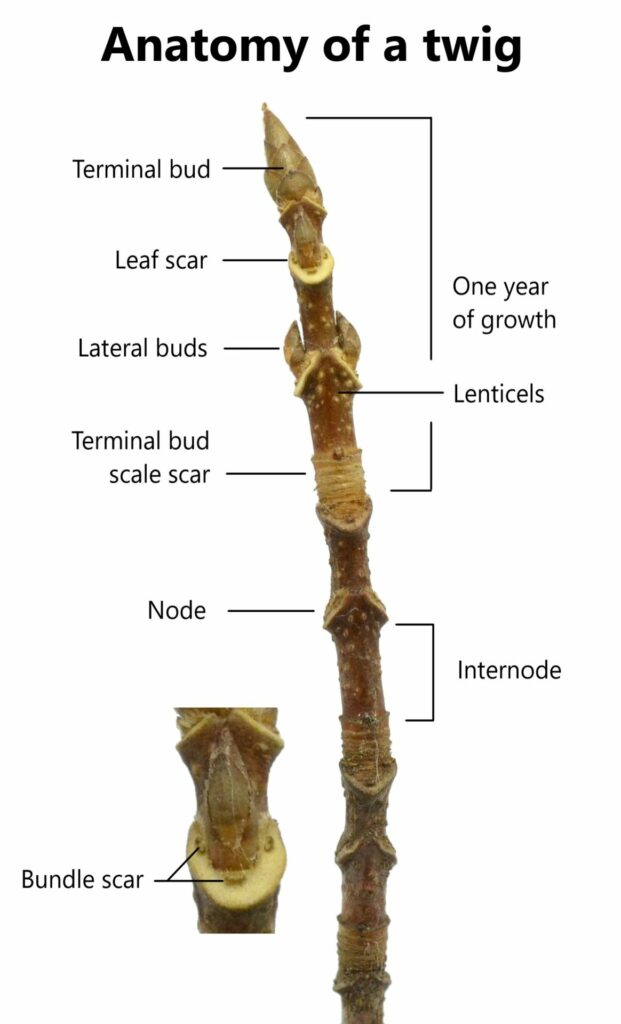
# stint☢
- He has just finished a stint of compulsory military service.
- Perhaps her most productive period was her five-year stint as a foreign correspondent in New York.
The noun stint means a set amount of time in which you do something — often work of some sort. “She served a stint in the army, followed by a stint in an office setting, before settling on a career as a lounge singer.” Unlike a project or vocation, a stint can refer to the stretch of time spent doing a particular job. You apply for a job, but you refer to your past stint in the Peace Corps.
来自古英语styntan, 使钝化, 使缩短. 不是很理解这两个意思之间的联系, 难道是"工作了一段时间了被’磨钝了, 磨短了’?"
The bride’s parents did not stint on the champagne - there was plenty for everyone.
Don’t stint yourself - take another slice of cake.
As a verb, stint means to be sparing or frugal, or restrict in a stingy manner (“to skimp”). “The school board chose to make cuts at the administrative level, rather than stint on the children’s education.”
# waylay
躺在路边(准备埋伏某人) => ambush
- A man on his way to deposit $12,000 in a bank was waylaid by two men who snatched his bag.
- I meant to leave earlier but I was waylaid on the way out of a meeting by my manager.
To waylay, or to be waylaid, is usually not a good thing: Mom would not be proud. Robbers waylay their victims. Outlaws waylaid stagecoaches in the Old West. The verb’s origin, from wegelage, means “lying in wait, with evil or hostile intent.” You might also use waylay to show someone being interrupted from finishing the task at hand: “I should’ve been studying, but was waylaid by my friend’s invitation to go bungee jumping.”
# vociferous☢
voci => to speak fer => to carry -ous => to shout, yell, cry out => 抱着某个观点大声疾呼的 => If you describe someone as vociferous, you mean that they speak with great energy and determination, because they want their views to be heard.
- He was a vociferous opponent of Conservatism.
- His resentment of her behaviour was becoming more vociferous.
# supplant☢
sup- => under plant => sole of the foot(脚底) => to trip up, overthrow, defeat, dispossess => “从根基掀起, 掀翻” => 取代, replace, oust, displace, supersede
Printed books will soon be supplanted by e-books.
# discern
dis- => apart, 分开 -cern => to separate => to separate apart => 将物体从背景(其他东西)分开 => 辨别出, 看出
- I could just discern a figure in the darkness.
- It is difficult to discern any pattern in these figures.
# instill☢
in- => in still => a drop 比如 distill => put in by drops, to drip, trickle => to introduce liquid/feelings… little by little. => 逐渐灌输
It is part of a teacher’s job to instill confidence in/into his or her students.
Parents work hard to develop, or instill, positive beliefs and values in their children. Interestingly, there’s no corresponding word for when parents pass down their bad habits.
Instill comes from the Latin verb stillare, meaning “to drip.” For some people, this word provides an apt metaphor for the way that parents and teachers cultivate understanding in young learners, patiently introducing wisdom “drop by drop.” (Of course, for others, instill conjures up the image of a persistently dripping faucet that just won’t be quiet.)
# shred

shred 既可以指这个动作, 也可以指 shredded 后的细长条
# dogged
这里的 dog 就是指 dog, 狗狗有时很固执, 坚持不懈(比如忠犬八公每天都去等待主人), dogged 就是有这个特质的人.
- Her ambition and dogged determination ensured that she rose to the top of her profession.
# execrate☢
execrate = ex + sacrare + ate
- ex- => out
- ecr => sacr => holy
- -ate => to devote off or away, to curse, 使其不再神圣, 咒骂, 憎恶, 谴责, loathe, detest, abhor, curse, denounce, damn
# consecrate
con- => with, together secr- => sacr-, holy ate => 把…神圣化, make or declare sacred by certain ceremonies and rites. 比如把一个新修建的教堂神圣化
# indemnity☢
in- => not, opposite of, without demn => damnum, damage -ity => security or exemption against damage => 后来引申到损坏后的补偿金, 赔款, 保险的赔款.
Indemnity is protection against loss or harm — it is most often used in insurance.
If you suffer an injury or there’s damage to your house, an indemnity makes up for the loss — if it’s part of your insurance. An indemnity may also keep something or someone from being held responsible for harm. Protection indemnity is mainly offered for unlikely events. If you regularly crash hot-air balloons, you won’t get indemnity for the next one you rent. In fact, the balloon rental company will probably demand their own indemnity in case you crash again.
# coltish
colt 指的是小马驹
 coltish就是"像小马驹一样的", full of energy but clumsy or awkward, because they lack physical skill or control.
coltish就是"像小马驹一样的", full of energy but clumsy or awkward, because they lack physical skill or control.
An energetic, playful person can be described as coltish. A coltish preschooler might skip happily across the room and then slide to a stop in her socks.
There’s something a little young and awkward implied in the word coltish, which arose in the 14th century from the sense of a colt, or young horse, as a lively, frolicking, long-legged creature. Skinny-legged teenagers dashing around a mall are coltish, and a soccer team of five year-olds is made up of happy, coltish players.
# éclat
When you do something with éclat, you do it with great style or an amazing effect. A skilled magician performs all of her tricks with éclat.
Eclat is the gusto or flair with which you make an entrance at a party or sing a song at your school talent show. It’s also a certain measure of success, especially the type that other people consider you to have — your skill on the soccer field might lend you a certain amount of éclat among your classmates, for example. The word éclat comes from the French éclat, which means “splinter or fragment,” but also “flash of brilliance.”
# splice☢
这个单词看起来好像是表示"分开"的含义, 但是它的意思是 to join two piece of rope, film, etc. together at their ends to form one long piece. => 引申为结婚
- Scientists have discovered how to splice pieces of DNA.
- He taught me to edit and splice film.
- An old friend of mine, newly spliced, recently invited me to dinner in his new marital home.
# coda
Coda comes from the Latin word cauda, which means “tail”.
A coda is a passage at the end of a piece of music that brings the music to a close.
In the song “Hey Jude” by The Beatles, the final “nana na na” part is considered a coda, and it is almost four minutes long. The Beatles - Hey Jude - YouTube
# discrete
不要和 discreet 搞混了
- discrete: 独立的, 各自的, 独立的
- discreet: 审慎的, 谨慎的, 小心的
discrete => discretionary
# badger
獾
獾之所以被称为badger,是因为它的前额上有醒目的白色条纹,就像是一个徽章(badge)。

badger:[‘bædʒə] n.獾vt. 纠缠不休;吵着要;烦扰
中世纪时流行一种残忍的狗咬獾游戏。人们将抓来的獾放到一个盒子里,然后将一只狗放入盒子里,让狗反复去咬獾,每次咬住獾后,狗主人就将它们分开,如此反复,以在规定时间内咬住獾次数最多为胜。由于在这种游戏中,狗会反复去咬獾,因此badger一词衍生出“烦扰、纠缠不休”之意。
# contravene
contra- => against vene => to come => to come against, oppose, come or be in conflict with
- The company knew its actions contravened international law.
- The Board has banned the film on the grounds that it contravenes criminal libel laws.
- He said the article did not contravene the industry’s code of conduct.
可以看到 contravene 的都是某个规则和法律
To contravene means to go against or defy. You might contravene your parents’ ban on sweets when your friend offers to share her candy because chocolate tastes too good to resist!
If you contravene something in practice, you act in direct violation of a particular law or rule. Think about the times when someone has told you not to cross a line and you do anyway. You can also contravene in words though, which means you contradict or argue against a statement. Let’s say you’re debating gun control. If your opponent says that for the safety of all, it should be legal to carry a concealed weapon wherever you go, you might answer that the more concealed weapons there are, the more violence. You are contravening your opponent’s argument.
# diaphanous
- dia- 表示“穿过,二者之间”。
- phan- = show, 表示“显示”。源自希腊语 phainein “to bring to light, cause to appear, show”
- -ous 表形容词,表示“…的”

If a dress is so see-through that light shines through it, it’s diaphanous. You could also call it “sheer” or “transparent,” but diaphanous sounds much fancier.
If you want a classic example of diaphanous clothing, check out all those nineteenth century Romantic paintings of goddesses clad in lightweight gowns flouncing around in the middle of forests at night. Those gowns are diaphanous, and so are the fluttery translucent muslin curtains in your kitchen window and the gauzy tutu your little sister loves to wear. The Greek root, diaphanes, “see-through,” combines dia-, “through,” and phainesthai, “to show.”
 你知道吗, 星云有发光的(Emission Nebula)和不发光的(Reflection nebula)两种, 那些不发光的星云折射了其他星体的光线, 所以才能被我们看到.
Source
你知道吗, 星云有发光的(Emission Nebula)和不发光的(Reflection nebula)两种, 那些不发光的星云折射了其他星体的光线, 所以才能被我们看到.
Source
# gossamer
Gossamer is something super fine and delicate — like a spider web or the material of a wedding veil.
The original gossamer, from which these meanings come from, is the fine, filmy substance spiders excrete to weave their webs. A dress can be gossamer-like, if its fabric is so sheer as to be see-through, or almost. Your chances of going to a good college are “gossamer thin” if you’ve never cracked a book in high school.
adj: very delicate and light. 精巧轻盈的;轻薄精致的
- gossamer wings
- a gossamer veil
- …the daring gossamer dresses of sheer black lace.
# dullard
a boring, unintelligent, and unimaginative person -ard 是一个贬义后缀, 表示"不好的人", 相当于汉语里面的"…鬼"
- coward => 胆小鬼
- drunkard => 酒鬼
- sluggard => 懒鬼
# earnest☢
If you are earnest, you pursue your purpose in a steady, sincere, and eager way. The phrase “in earnest” uses earnest as a noun, as in, “Once you stop fooling around and start studying in earnest, you’ll find you learn the material quickly.” Oscar Wilde’s classic play The Importance of Being Earnest plays on the fact that Ernest is also a man’s name.
(be) in earnest相当于"郑重其事地(的), 认真地(的), 当真地(的)"
He was a very earnest young man. These fanatics are in deadly earnest when they say they want to destroy all forms of government. The election campaign has begun in earnest. I thought he was joking - I didn’t realize he was in earnest.
# elicit
elicit是一个主动的过程, 需要你先进行某个动作, 然后对象给出某种response, 如果你什么都没有做, 只是看着某个事件发生, 那么这就不是elicit. When you elicit, you’re bringing out a response of some sort. A good comedian elicits a lot of laughs.
Elicit has to do with creating or provoking a response. A great speech will elicit cheers — a bad speech will elicit boos. Teachers try to elicit responses from students. If a friend smiles at you, it will probably elicit a smile of your own. In court, a lawyer might try to elicit mistakes and inconsistencies in the testimony of a witness. In all cases, whatever is elicited is some kind of response.
# estimable☢
estimate + able? 可估计的? 其实 estimate 在以前的意思还有"称赞…的价值"的意思, 是从 esteem 来的, 所以 estimable 就是 deserving praise, admiration 的意思 This is a word for people who deserve respect. A hardworking scholar who has written several books might be estimable. Things can be estimable, too. You might describe an impressive book, restaurant, or film as estimable. Estimable is related to esteem, which can be used to mean “regard highly.” Being estimable is the opposite of being disgraceful.
# facile☢
from French facile “easy,” (言语或者理论)轻率的, 未经深思熟虑的, 信口开河的, 随意的
- a facile explanation
- We must avoid facile recriminations about who was to blame.
# fracas☢
不要混淆了 fracas 和 farce farce 是 “闹剧” fracas 是 “a noisy argument or fight”
- He was injured in a Saturday-night fracas outside a disco.
- The prime minister has joined the fracas over the proposed changes.
- No one had prepared anything so the meeting was a bit of a farce.
# hale
用来形容老年人身体棒, 你这老身板子真好, 读音上和 healthy 前半截挺像的. 还有一个通常形容老年人的是 sprightly => lively and active, 精神矍铄的, 注意它虽然有 ly 但是是一个形容词:
- He’s a sprightly old man of 75.
# harrow☢
To harrow is to cause worry and upset, the way a truly scary movie might harrow you, making it hard to sleep without turning on the light.
Harrow is an uncommon verb that was originally used in a religious context. You’re much more likely to hear the adjective harrowing used for things that are extremely distressing. But if your cat torments you nightly with her incessant meowing, you might try yelling, “Why do you harrow me?” In agriculture, harrow has a completely different meaning: it’s a device that helps up break up the soil. And if you harrow your land, you use such a device.
# incendiary☢
in- => 使… cend => =cand, to shine, glow iary => person who sets malicious fires, 也就是使…燃起来(的人) => 后来引申为能引起燃烧的, e.g. an incendiary bomb, 燃烧弹 => 引申到语言上, 有煽动性的, incendiary remarks, 煽动性的言论
- 有趣的是汉语"煽动性的"也和火有关.
# irradicable
= ineradicable => in + eradicable
# macabre
在欧洲历史上最猖獗的瘟疫莫过于 14 世纪蔓延于整个欧洲的黑死病(Black Death),死亡人数之多超过历史上任何流行病或战祸。法国编年史家傅华萨(Jean Froissart)说,约有三分之一的欧洲人死于这次流行病。另有资料说,这次大瘟疫夺走了三分之二的欧洲人的性命。除此而外,从 1337 年至 1453 年英法两国之间时断时续的百年战争也在很大程度上增大了人口的死亡率。焚化尸体的火堆几乎随处可见。因此,中世纪末期人们时常想到死亡,死亡也就成了当时西欧戏剧、诗歌、音乐和美术的一个普通主题。最风行的一种题材是在戏剧里和画面上表现生者和死者共舞,象征死亡的骷髅带领众人一步步走向坟墓。这种舞蹈古法语作 danse macabre,英语作 dance macabre,意思是 dance of death(死亡之舞),若照字面义讲则是 dance of the Maccabees(马卡比家族之舞)。它可能起源于 14 世纪德国一出据《圣经旧约·次经》(Old Testament Apocrypha)里有关 Maccabee 家族的故事编写而成的道德剧或奇迹剧。这个家族为了拯救叙利亚犹太人领导了一场长达近 30 年的解放战争,公元前 142 年建立了一个由 Maccabee 家族后裔统治的犹太国家,公元前 63 年为罗马人所灭。Maccabee 家族的故事充满了阴惨的气氛,读起来令人毛骨悚然。多数学者认为,danse macabre 得名于故事中七位殉难的 Maccabee 兄弟的舞蹈,而 macabre 则显然为 Maccabee 之讹误。macabre 直到 19 世纪末期才作为形容词出现于英语之中,并被赋予“以死亡为主题的”、“阴惨的”、“令人毛骨悚然的”等义。
例
- Retrieving the mangled bodies from the wreckage was a macabre task. (CAE) 把残缺不全的尸体从残骸中挖出是一项令人毛骨悚然的工作。
- The macabre story of headless ghosts frightened the children. (FWF) 恐怖的无头鬼故事把孩子们给吓着了。
- The film contains a macabre account of life in Auschwitz and other concentration camps. (CID) 影片记载了奥斯维辛集中营和其他集中营的恐怖生活。
# nonplus☢
To nonplus is to baffle or confuse someone to the point that they have nothing to say. Something weird and mysterious can nonplus you, like a play that is performed entirely by chickens.
If you know a little French or Latin, you’ll recognize that “non plus” means “no more.” When something bewildering nonpluses you, there’s no more you can say or do about it. A goal of getting poor grades, running with a bad crowd, and refusing to eat would leave your parents nonplussed. Sometimes people misuse nonplus to mean “unimpressed,” but that’s not correct: to nonplus is to puzzle, confuse, and dumbfound.
- he was nonplussed by the sudden announcement
- 注意过去式是两个s: nonplu==ss==ed
# peripatetic
peri- 表示“周围,靠近”。
pat- = walk, 表示“走”。源自希腊语 patein “to tread, walk.”
-etic 表形容词,通常放在一个名词前,“与…相关的,…的”。
来自希腊语 peripatein, 走动,讲学,授课,来自 peri-, 在周围,-pat, 走动,词源同 path, foot. 该词原用于形容古希腊哲学家亚里士多德给弟子讲课时,喜欢边走边讲,后引申词义巡回工作的,流动的等。
travelling around to different places, usually because you work in more than one place(通常指因工作而)巡游的,流动的
- a peripatetic music teacher 流动的音乐教师
# precarious☢
Grab for the adjective precarious when something is unstable, dangerous or difficult and likely to get worse. Are you totally broke and the people you owe money to keep calling? You’re in a precarious financial situation!
The Latin root of precarious means “obtained by asking or praying.” This fits well as precarious always signals that help is needed desperately. If your life is precarious or you are in a precarious situation, things could become difficult, maybe even dangerous, for you. If your footing or hold on something is precarious, it is unstable or not firmly placed, so that you are likely to slip or lose your grip.
# rift☢
rift 本来是用来形容坚硬的物体(比如地面或者岩石)上的裂痕的, 但是和中文里面一样, 这个词也能够用来描述人际关系里面的"裂痕"=>
- The marriage caused a rift between the brothers and they didn’t speak to each other for ten years.
- The interview reflected a growing rift between the President and the government.
- He has warned that the serious rifts within the country could lead to civil war.
- They hope to heal the rift with their father.
# be hoist by/with one’s own petard
这是一个英语俗语, 来自莎士比亚的著名戏剧<哈姆雷特>, hoist虽然现在的意思是"用绳子吊起来", 在这里的意思是"被炸飞", petard是炸弹的意思, 整个句子字面的含义就是"被自己的炸弹炸飞" => 被自己的阴谋害死, 也就是汉语里面的"搬起石头砸自己的脚"
# rile☢
来自 roil, 后来读音在美国之间变成了rile, 意思有了细微的区别, rile就是roil对方的情绪, 让对方恼怒, 愤怒.
# roil☢
roil 是"to (cause to) move quickly in a twisting circular movement"的意思, 比如:
- Fierce winds roiled the sea. 强风搅动着大海。
- A massive tower of smoke roiled skyward. 一个巨大的烟柱翻腾上升着。 引申为"to cause something to stop working in the usual or expected way" 使…停止正常运作
- Fears about Japan roiled world financial markets last week. 上个星期对日本的担忧让世界金融市场停止了正常运作。
- The immigration debate has roiled the country for more than a year. 有关移民的辩论让国家一年多都没能正常运转。
# squelch☢
squelch 形容的是走在下雨天的泥地里面, 脚下发出 biajibiaji 一样的声音的情形, to make a sucking sound like the one produced when you are walking on soft, wet ground(如走在湿软土地上似的)发吧唧声,发扑哧声
- He got out of the car and squelched through the mud to open the gate.
- As the hikers walked down the path by the house, she could hear the squelch of their boots in the mud.
- He squelched across the turf.
- His sodden trousers were clinging to his shins and his shoes squelched. 也许是因为这个声音和挤压软的东西的时候的声音很相似, 所以 squelch 又有 put a stop to 的意思 You can squelch an idea or a rebellion. This word has several meanings, but it’s usually a verb for crushing things. A mean remark could squelch your self-confidence, and a powerful military could squelch an invading country.
# disenchant☢
dis + enchant => 不再抱有幻想的 => 幻想破灭了的, 失望的, 感到幻灭的.
- she is disenchanted with the marriage
# inception
我记住了盗梦空间, 却还不知道盗梦空间电影英文单词的意思: Inception => 开端, 成立, 建立, 创立
The inception is the beginning. Since its inception, Wikipedia has been created by its users.
 Inception sounds like conception, but their meanings are distinct. Conception usually refers to the moment of becoming pregnant. Inception refers more to the beginning, to entering upon an undertaking. Inception implies the start of a specific thing like a campaign or a company. Subsequent events take place after the inception. At the moment of conception, most women are at the inception of motherhood.
Inception sounds like conception, but their meanings are distinct. Conception usually refers to the moment of becoming pregnant. Inception refers more to the beginning, to entering upon an undertaking. Inception implies the start of a specific thing like a campaign or a company. Subsequent events take place after the inception. At the moment of conception, most women are at the inception of motherhood.
# wanting
这是一个形容词, 和 want 的意思有点像, 但是用法有点有趣:
- He analyzed his game and found it wanting
- Eleanor was scrutinized, too, and often found wanting. 类似于 inadequate, disappointing, 这里的 wanting 的意思是"不达标的" 要是想要指代 wanting 的东西, 可以用 be wanting in …
- He is wanting in moral constraints.
- She is a little wanting in charms.
# colossal
在爱琴海和地中海之间有一个岛名叫罗得岛(Rhodes)。据史料记载,公元前4世纪时,罗得岛曾是地中海东部一个交通枢纽,那里不仅商业繁荣,而且雕刻艺术业也很兴旺发达。公元前292年,罗得岛人击败了马其顿人的入侵,为了庆祝胜利,他们把在战争中缴获的兵器都熔化了,请希腊雕刻家卡瑞斯(Chares)制作一个青铜太阳神巨像。这座巨型塑像历时12年(292-280 BC)才告完工。据古罗马史学家普林尼(Pliny, 23-79)所述,塑像身高约100英尺(一说120英尺),矗立在海港入口处。后人将这一壮观建筑连同埃及金字塔、巴比伦空中花园、摩索拉斯陵墓等誉为世界七大奇观,但在公元前224年这座太阳神像在一场地震中倒塌了。古人按岛名Rhodes称此塑像为Colossus of Rhodes,或简称之为Colossus。Colossus是拉丁语,源于希腊语kolossós,有“巨型塑像”之意。以后Colossus在英语中成了“巨型塑像”的代称,还可喻指“极重要的人或物”,拼写也由大写变为小写。colossal一词便是18世纪时从colossus派生出来的形容词,意为“巨像的”,随后多作“巨大的”、“庞大的”解,只取colossus“大”的涵义。
 例
例
- There was a colossal statue of the king in the middle of the square. (LLA) 在广场中央有一座国王的巨像。
- The Colossus of Rhodes was a very large bronze statue of Apollo at the entrance to Rhodes port in ancient times. (CID) 罗得岛巨像是古时矗立在罗得岛海港入口处的一座阿波罗青铜巨型塑像。
- It was a colossal waste of time. (CAE) 这在时间上是极大的浪费。
- Rembrandt was an artistic colossus. (LDC) 伦勃朗是位艺术大师。
# aboveboard
光明正大的 “in open sight, without trickery or disguise,” 1610s, from above and board. “A figurative expression borrowed from gamesters, who, when they put their hands under the table, are changing their cards.”
# grandstand☢

# equivocate☢
equi- => equal voc- => 声音, 叫喊 -ate => 说模棱两可的话, 含糊其辞
- She accused the minister of equivocating, claiming that he had deliberately avoided telling the public how bad the problem really was.
- He is equivocating a lot about what is going to happen if and when there are elections.
- He had asked her once again about her finances. And again she had equivocated.
When you are unwilling to make a decision and almost intentionally go back and forth between two choices, you are equivocating. When politicians equivocate, they are often afraid of upsetting, and thus alienating, voters with their decisions. A key part of equivocate is the root vocate, which comes from the Latin vocare or “voice.” When you give your voice to two opposing views in order to mislead or keep your options open, you’re equivocating. Think of the expression, to talk out of both sides of your mouth. If you want to go to a party and your parents keep saying “maybe, it depends,” tell them to stop equivocating and give you a straight answer.
# disarray
array 想必是一个很整齐的情况, 那么 disarray 就是 array 的反义词 => 混乱, 凌乱, 杂乱
- Her clothes were in disarray.
- Ever since the oil crisis, the industry has been in (the state of) disarray.
# anterior
前端的, 前面的, 先前的 ante- => before 比如之前背过的antediluvian 后面的:posterior 里面的:interior 外面的:exterior
更高等的:superior 更低等的:inferior
# pandemonium
pan・demon・ium 在英国诗人弥尔顿(John Milton, 1608-1674)最享盛名的史诗《失乐园》(Paradise Lost)中,Pandemonium 是 capital of Hell(地狱之都),即撒旦的宫殿,魔鬼聚集的地方。显然,这是诗人仿 pantheon(万神殿)创造的一个拉丁词,由 pan(一切)和 demonium(魔鬼)组合而成,其中-ium 乃拉丁语后缀,在英语的拉丁语借词中常含有地点之义,诸如 auditorium(礼堂;听众席),sanatorium(疗养院),gymnasium(体育馆)等。但若进而追本溯源,我们会发现 pandemonium 的终极词源乃是希腊语 pân ‘all’和 daímōn ‘demon’的组合,字面义也是 all demons(一切魔鬼)。18 世纪以后,凡是坏人集中的地方,充满邪恶或混乱嘈杂的地方,都可以用 pandemonium 来表示。到了 19 世纪中期之后,该词又进而引申为“大混乱”或“嘈杂骚乱”,不再指地点,跟魔鬼及地狱也已没有什么联系了。
例
- Pandemonium broke out when the results were announced.
- Pandemonium reigned in the classroom until the teacher arrived. 教师到来之前教室里乱哄哄的。
- When the verdict was read, pandemonium erupted in the courtroom. 裁决宣读之后,法庭一片混乱。
- There was sheer pandemonium in the dance hall when someone shouted ‘Fire!’.
# debark
debark 和 embark 是一对反义词,显然这里的 bark 是交通工具的意思, 来自法语 barque, “small ship” debark 就是从船上下来,后来泛指从其他交通工具上面下来 embark 就是登上船,后来也泛指其他交通工具,也可指代开始一段旅途
- 由于bark还有树皮的意思, 所以debark还有“去除树皮”的意思
# convoke
con + voke => to call together, 把大家召集到一起, => 召集….(开会), 召开会议
He has convoked a summit conference in Brussels.
# hodgepodge
大杂烩
A hodgepodge is a random assortment of things. A dorm room might be furnished with a hodgepodge of milk crates, antique mirrors, and a poster of a kitten hanging on a branch with one paw.
Hodgepodge is a funny-sounding word for a somewhat funny occurrence — a grouping of things or people that don’t fit together. If you made a stew with bacon, oatmeal, and chocolate cake, you’ve made a hodgepodge (and a bellyache waiting to happen). The piles of stuff stacked in attics tend to be a hodgepodge. British people call it a hotchpotch. A hodgepodge can also be called a mishmash.
New Age thinking seems to be a hodgepodge of old and new ideas.
# hike
除了"远足", hike 还可以用来形容费用或者价格的猛增
- The recent hike in train fares came as a shock to commuters.
- Retailers have hiked (up) prices again.
- …a sudden 1.75 per cent hike in interest rates.
- His economic plan, with its tax hikes and spending cuts, will slow the economy.
- It has now been forced to hike its rates by 5.25 per cent.
- The federal government hiked the tax on hard liquor.
# cherubic
长相像 cherub 一样的, cherub 是什么呢?
 cherub 是小天使, 所以 cherubic 就是娃娃脸的, 长者可爱胖乎乎的圆脸蛋的.
cherub 是小天使, 所以 cherubic 就是娃娃脸的, 长者可爱胖乎乎的圆脸蛋的.
# commencement
A commencement is the act of starting out, or blazing a new trail.
- Would passengers please turn off their mobile phones before the commencement of the flight.
- All should be at least 16 years of age at the commencement of this course.
The suffix -ment makes the word commencement a noun — a thing, an activity, a start. The word can be used for the beginning of anything, from a business meeting to a vacation trip to a marriage. Anything that begins has a moment of commencement. That’s why a graduation ceremony is called a commencement — a graduate is embarking on a new life, and the commencement ritual marks the official beginning of that life.
# adjourn☢
ad- => to -journ => day => to another day. The notion is of setting a date for re-meeting. 休会, 休庭
- The meeting was adjourned until Tuesday.
# dandy
在形容衣着外表的时候, dandy是一个名词. A man who is very concerned with how he looks can be called a dandy. The term is rather old-fashioned — it was commonly used to refer to such men in the 1800s, like the famous dandy Beau Brummell.
dandy还可以做一个形容词, 这时候就不单单用来形容外表了: As an adjective, dandy means excellent. If you think your new car is dandy, you’re excited to own such a great car. In modern use, dandy is often used sarcastically, with just a small change in wording or emphasis: “My new car is just dandy. It’s broken down twice today already!” The word dandy is also frequently used in the phrase “fine and dandy”.
# dearth
dear + 名词后缀-th => dear 这这里是"贵"的意思, 物以稀为贵, 当一个东西很贵的时候说明它十分稀少, 所以这个单词的意思是 “不足, 缺乏, 缺少, a lack of sth”
- a dearth of new homes in the reigion.
# debut☢
来自法语, 所以读音比较奇怪 /ˈdeɪ.bju/
A debut is a first appearance, a launch, or public introduction. So before you make your big debut at the office, check and make sure you don’t have spinach in your teeth.
Perhaps you’ve heard of debutantes making their official debut into society, or actresses and actors making their debut on stage. A fun fact: debut and premiere are often thought to be interchangeable, but they’re not. A debut, as you now know, is a first public appearance. But a premiere, while also a “first,” isn’t necessarily live. When a movie opens or an interview is broadcast for the first time, they’re called premieres.
# debutante
A debutante is usually a wealthy girl whose parents wish to introduce her to society in a BIG way — in “a debutante ball” that looks like something out of a scene from Gone with the Wind. 翻译: 才开始社交的富家千金?
In the United States, debutante balls usually, but not always, take place in the South and are a way to introduce wealthy young women to especially eligible young bachelors. The word debutante is derived from the French word debut, meaning “a first performance or showing.” The original French word debutante referred to a new actress making her first appearance on the stage. So, think of a debutante as a young woman making her debut in society.
# epitomize☢
epitomize 来自 epitome, epitome 是"典范, the best possible example“的意思, epitomize 就是”to be the perfect example of a quality or type of thing"
- With little equipment and unsuitable footwear, she epitomizes the inexperienced and unprepared mountain walker.
# fetter
fetter 是脚镣的意思, 现在多用于比喻义, 形容困扰某人的枷锁, 也可以作为一个动词, 表示"束缚, "
…the fetters of social convention.
…a private trust which would not be fettered by bureaucracy.
The black mud fettered her movements.
fetter 和 feet 长得挺像的.
# hackneyed
14 世纪伦敦东北郊有一个名叫 Hackney 的小村庄(今为一自治区)因盛产好马而遐迩闻名。该地所育之马膘肥体壮,抬腿高,善于奔跑,适用于驾车或日常骑用。久而久之,这种马就被取名为 hackney,出租的马也叫 hackney,出租马车则称 hackney carriage/coach 或简称 hackney。到了 1637 年查理一世统治时期,出租马车在伦敦街头几乎随处可见,可说是泛滥成灾。于是 hackney 一词又从“筋疲力尽的出租马匹”(worn-out horse)转指“平庸无奇的事物”。 到了 18 世纪,从 hackney 派生出了形容词 hackneyed,表示“陈腐的”、“平庸的”、“老生常谈的”等义。与此同时,hackney 常被缩略为 hack,仍指“出租的马”、“出租马车”或引申为“雇佣文人”,如今在美国英语还用以指“出租车”。
例
- Politicians all use the same hackneyed expressions. (LLA) 政客们说的都是那套陈词滥调。
- All those slogans we used to chant sound so hackneyed now. 我们过去喊的那些口号如今听起来陈腐得很。
- One needs a special license to drive a hack. (FWF) 开出租汽车需持有特殊执照。
- We rode around the park in a hack. 我们坐着出租马车游览了公园。
# hamstring
Your hamstrings are groups of muscles and tendons between your hips and knees. If you pull a hamstring while running or jumping, you’ll feel pain at the back of your thigh. Ouch!

The hamstring muscle group is one of the most powerful in your body — attached to the knee and hip, these are the muscles and tendons that make it possible for you to run, walk, and jump. It’s fairly common for athletes to injure their hamstrings and be (temporarily) immobilized. Fittingly, hamstring is also a verb meaning “render powerless.” So an astronaut might complain that a lack of funding will hamstring NASA, making planned Mars voyages impossible.
- The company was hamstrung by traditional but inefficient ways of conducting business. 这家公司被其传统但低效的经营方式所束缚。
- If he becomes the major opposition leader, he could hamstring a conservative-led coalition.
# hoodwink
hood 就是一个头套, 或者连帽衫的帽子 wink 就是眨眼, 和眼睛相关 hoodwink 就是套上头罩, 被遮蔽了双眼, => 欺骗
# blindfold
一个类似的单词是 blindfold, 就是给…带上眼罩, 但是这个单词没有欺骗的意思.
# inimitable☢
in + imitable => 无法模仿的, => very unusual or of very high quality and therefore impossible to copy. 可以翻译为"无与伦比的"
He was describing, in his own inimitable style, how to write a best-selling novel.
unique, unparalleled, unrivalled, incomparable
# inexorable☢
不可阻拦的
- the inexorable progress of science 不可阻挡的科学进步 in- not exorable => able to be entreated, able to be moved by entreaty, 这里的entreat指的是
# persecute☢
这个单词和 prosecute 很像, 但是两者的含义有所不同.
One you do in court, the other you do if you’re a jerk
prosecute 是在法庭上"起诉", 不管被 prosecute 的人有没有罪, 一切都是公开透明, 公正的. 但是 persecute 是迫害, 骚扰, 纠缠, 是不正当的, 是单单因为种族, 宗教或者政治信仰而进行的不正当行为.
Prosecute is most often used to refer to bringing legal action against someone else, and is related to the Latin word for “pursue.” It is often confused with persecute which means “to harass, torment, or punish, especially for one’s beliefs.” If you find yourself frequently one the wrong side of prosecution, you might end up feeling persecuted.
# reciprocate
reci- => 向后, 往回 proc- => 向前, 去 -ate => to move forwards and backwards, 往返运动(这个意思现在还在使用, 用在机器的零部件上), => 这和人际关系很像: 我帮你个忙, 你帮我个忙, 我请你吃顿饭, 你再请我吃顿饭, 都是这种往返进行的动作 => 所以引申为"回报, 酬答, 回礼, to behave in the same way as someone else"
- Their attraction to each other as friends is reciprocated.
- He reciprocated the party leader’s good wishes.
- Some electric razors have reciprocating heads.
# strut☢
to walk in a proud way trying to look important.
- He struts around town like he owns the place.
也可以指房屋/车辆的"支柱, 撑杆, a strong rod"
# strut your stuff
类似于"露一手", 就是自信的展示自己最擅长的/最拿手, 自豪的东西或者技能.
He was the type of guy who liked to show off and strut his stuff.
# unexceptionable☢
un + exception + able
无懈可击的, 在这里exception可以理解为缺陷, 可以指责的地方
反义词: exceptionable
unimpeachable incontrovertible impeccable
# exponent☢
除了数学里面的指数, 这个单词还能代表"拥护者" An exponent is a person who is a big promoter of something. Are you an exponent of the four-day school and work week?
You may already know the mathematical meaning of exponent: a numeric notation showing how many times a number is multiplied by itself. How did exponent come to mean a strong advocate or promoter of something? Well, its Latin ancestor was a verb meaning “to put forth” and it’s easy to see how this could be generalized to refer to people. After all, aren’t you an exponent of freedom of expression?
# blatant
blatant 一词由 16 世纪英国诗人埃德蒙•斯宾塞 (Edmund Spenser)杜撰。斯宾塞在其长篇史诗《仙后》中创造了这个词,用来形容一头长有千条舌头、代表“诽谤”的怪兽。其词源很有可能是拉丁语 blatire(喋喋不休)。
- very obvious and intentional, when this is a bad thing 明目张胆的,公然的
- a blatant lie 弥天大谎
- The whole episode was a blatant attempt to gain publicity. 整个事件完全是旨在宣传的露骨炒作。
# screen
screen 除了屏幕的意思还有以下含义:
- 放映, 你可以 screen a film
- 屏风,
- 由屏风这个含义引申为"遮挡" She raised her hands to screen her eyes from the bright light.
- 想象医生通过 X 光片来检查你有没有疾病 => 检查, 测试 Women over 50 should be screen for breast cancer.
- 除了医学检查, screen 也可以指其他检查, 你甚至可以 screen 你的来电决定要不要接电话 Completely unsuitable candidates were screened out (=tested and refused) in the first interview.
# allay
al- => =a-: down, aside lay => to lay lay 是放置的意思, 当然也是 lie 的过去式, 可以这样记忆: 一个病人挣扎着要坐起来, 另一个人安抚他重新让他躺下, 或者把一个快要掉下去的东西重新安放好. => To allay someone’s fears or doubts means to make them to feel it less or feel calm again.
- The government is trying to allay public fears/concern about the spread of covid.
# argot
首先注意这个单词里面的 t 不发音 argot 类似于汉语里面的"黑话", 就是圈内人才懂的话, 一些不正式的, 比 slang 更小众的, 比 jargon 更不专业的业内名词.
StackExchange 上面有 关于这个的讨论
Based on just the definitions you quote, computer professionals do not speak argot, they speak jargon. The jargon of computer professionals was not constructed for the purpose of hiding the meaning of what they are saying from outsiders - it may have that effect, but that was not the purpose. The purpose is to have short hand words that have specific defined meanings that allow for more efficient communication. For example the word “file” can replace the phrase “a block of information stored as a unit on an information storage device”. So jargon is a matter of efficiency.
From your definitions “argot” has the purpose of secrecy that would prevent eavesdroppers from understanding the meaning of the conversation.
Slang is ad-hoc but is inherently formed out of the intent to broadly communicate. 也就是说 slang 虽然有 argot 里面"不正式"的含义在, 但是不局限于一个小群体, 只要是 native speaker 都听得懂.
Jargon is driven from the attempt not so much to broadly communicate, as to DEEPLY communicate - to provide more content in the same amount of verbal space.
总结一下:
| 正不正式 | 使用人群 | 容不容易懂 | |
|---|---|---|---|
| argot: | informal(ad-hoc) | small group of people | hard to understand |
| slang | informal(ad-hoc) | large group of people | easy to understand |
| jargon | formal(有明确的定义) | small group of people | hard to understand |
| Plain English | formal(有明确的定义) | large group of people | easy to understand |
| 其实使用人群和容不容易懂是等价的, 所以如果我们加上最后的 English, 也就是一般的话, 就涵盖了所有的 2x2=4 种组合, 真是奇妙. |
# barbarous
barbarian 指的是野蛮人, 未开化的人, 粗人, 所以 barbarious 就是像 barbarian 一样的人或事, => 粗野的, 野蛮的, 残忍的, 暴虐的
# bungle☢
Two prisoners bungled an escape bid after running either side of a lamp-post while handcuffed.
- mess up, blow, ruin, spoil
# circumscribe
circum + scribe => to encompass, confine, restrain mark out bounds or limits for. 这个单词在数学里面是"做外接圆"的意思, 从词的组成上看是很形象的. 现在一般使用的词义是引申义 => 也就是限制, 约束, 抑制, 可以理解为划定了活动范围, 活动受限制的意思.
There are laws circumscribing the right of individual citizens to cause bodily harm to others.
# congenial & genial☢
两者词都表示 kind, friendly and pleasant, 但是它们指代的对象有所不同。
- genial 通常指代人的性格, 比如"He is a genial host."
- congenial 通常指一个人的性格给其他人带来的感觉, 或者指一个气氛很和谐友好.
- genial applies to individuals, while congenial is generally reserved for persons collectively or for environments.
- 从词根上我们可以这样理解: con- -> with, together, 一群人在一起的时候, 需要大家都很 genial 才能形成一个 congenial 的氛围.
这个回答把两者的区别说明的很全面: meaning - Is there any difference between “congenial” and “genial”? - English Language & Usage Stack Exchange
# defraud & fraud☢
Fraud is a noun for the practice of lying to someone in order to gain something, either money or some other beneficial intangible. It is also the word for a person who commits fraud. Another term for this kind of person is a fraudster. This term is mainly used in British English, but can be found in some US publications as well.
Defraud is a verb that describes a practice of lying to someone or an institution to steal money specifically. This includes acts like identity theft and electronic hacking.
A person who defrauds someone else is a defrauder.
# deplorable
de- => entirely plor => weep, cry out able => 可悲的, (糟糕到极点以至于感到悲伤), very bad, 极其恶劣的
- They are forced to live in deplorable conditions.
# embed
之前这个词都是在编程时候才遇到的. 当然它还有其他含义: The verb embed means to implant something or someone — like to embed a stone into a garden pathway or to embed a journalist in a military unit. When you stick something firmly within a particular environment, you are embedding it. If you are an archeologist, you might spend a lot of your time looking for pottery shards embedded in the earth. If you are a web site designer, you might embed video clips on web pages. And if your newspaper is covering a war overseas, you might consider embedding a journalist in a military troop in order to have a source reporting back from the front lines.
# be of French/German/Chinese/etc. extraction
祖籍是….
# voracious & ferocious ☢
下面是一个英语母语者的理解: 这两个单词更侧重于"贪婪"
- Voracious - closest synonym is insatiable. This word is almost always used as an adjective in conjunction with the word appetite.
- Rapacious - closest synonym is greedy; a word not used in common parlance. I would expect to see this word used only in literature and journalism. 下面这两个单词则更侧重于"凶猛, 残暴"
- Ferocious - closest synonym is fierce. It is often (though not always) used as an adjective to describe nature (i.e. a ferocious animal or a ferocious storm).
- Vicious - closest synonym is cruel. Usually refers to the actions of a person.
# imbroglio☢
im- => in -broglio => to confuse, 来自boil the state of being in a confusing situation => 混乱局面, 错综复杂的局面
- 想象水沸腾时候的混乱场景
Deng said it might be better to let “future generations, which may be wiser” to tackle the sovereignty imbroglio.
# paroxysm
这个单词长得很不一样. A paroxysm is a convulsion or sudden fit, brought on because you’re freaking out or coming down with something.
Paroxysm is from the Greek word paroxysmos, which basically means “to irritate.” If you’re irritated to the point of having a wild fit, like if you see someone trying to steal your car, you might go into a paroxysm of rage. When the clowns performed their act, the audience went into a paroxysm of giggles. A paroxysm can be medical, too, like when an illness suddenly attacks, and you get symptoms like chills and a fever right away.
形容词: paroxysmal
# municipal
来自拉丁语 municeps, 市民,自治镇公民,
- 来自 munus, 共同职责,共同责任,相互给予,礼物, 词源同 common, mutual.
- -cep, 承担,词源同 capable, accept. 该词原指古罗马时期享有罗马公民的特权但是按照自己的法律进行管理的特别自治镇。后词义通用化,引申词义市政的,市政当局的。
# munificent
muni- => 礼物, 这里可以理解为"好处" fic- => to make -ent => present-making, 能make很多好处的, => 慷慨的, 大方的,
If you give your best friend a bracelet for her birthday, then you’re a good friend. If you give her a diamond bracelet, a racehorse, and an oil well, then you’re a munificent friend, meaning you are very lavish when it comes to giving gifts. (And it’s possible you may also be broke.)
If you’re the generous type, you may already know that the word munificent traces back to the Latin word munificus, meaning “generous or bountiful," which in turn originated from the word munus, meaning “gift or service.” Put those two concepts together and you have big-time gift giving on a lavish scale. Use the word munificent to describe instances of over-the-top generosity — think Oprah on a gift-giving binge at Christmastime.
# commune(公社)
在欧洲封建时期,国家的土地被分封给各个诸侯。土地成了封建君主和领主的私人财产。后来,随着资本主义工商业的兴起,新兴资产阶级逐渐发展壮大。他们定居在城市里,通过赎买和战争手段从封建领主手中夺取了城市的主权,建立了由全体市民共同治理的自治城市。在法语中,自治城市的这种治理机构被称为 commune,来自拉丁语 communis,由 com(共同)+munia(职责、公职、功能)构成,表明自治城市的主权属于全体市民,治理职责由全体市民承担,而不是某个人独揽大权。 1871 年,法国巴黎人民起义,推翻了资产阶级临时政府,建立了世界上第一个无产阶级政权的雏形——Paris Commune,中文译为“巴黎公社”。从此以后,commune(公社)成为社会主义国家的一种独特组织形式,新中国成立后也曾经历过建设“人民公社”的阶段。 源自拉丁语 communis 的英语单词还有 community、common、communism 等。来自拉丁语词根 munia 的英语单词还有 municipal(市政的)、municipality(市政当局)。
commune:[‘kɒmjuːn] n. 公社,自治城市
communal:[‘kɒmjʊn(ə)l] adj. 公共的,公有的,公社的
community:[kə’mjuːnɪtɪ] n. 社区,社会,共同体,团体
common:[‘kɒmən] n. 普通,平民 adj. 共同的,普通的
communism:[‘kɒmjʊnɪz(ə)m] n. 共产主义
communist:[‘kɒmjʊnɪst] n. 共产主义者 adj. 共产主义的
municipal:[mjʊ’nɪsɪp(ə)l] adj. 市政的,市的,内政的
municipality:[mjʊ,nɪsɪ’pælɪtɪ] n.市政当局,市民,自治市或区
# pillory☢
pillory 是古代的一种刑具, 长下面这个样子, 下面有个柱子, 所以词形上看起来和 pillar 很像:

如今pillory这个刑罚已经废除了, pillory也引申出了(公开)抨击, 严厉批评, 辱骂的意思. (就是像被戴上了pillory了一样, 所以一般指公开的羞辱, 批评)
A man has been forced to resign as a result of being pilloried by some of the press.
# probity☢
- prob- => test, 表示“测试,证明”,复合词根,由 pro- 向前 + be- 存在组成。
- -ity => 表名词,指具备某种性质。
来自 probe, 试探,检验,-ity, 名词后缀。即经得起检验的,引申词义正直,诚实。
Her probity and integrity are beyond question.
# et cetera
Also etcetera, from Latin et cetera, literally “and the others,” from et “and” + neuter plural of ceterus “the other, other part, that which remains,” etc. 就是et cetera的缩写, 所以etc. 的读音是 /et ˈsedərə/
# reprobate
probate现在的意思是"验证遗嘱的有效性"(verb & noun), 也就是prove to be worthy, 那么加上前缀re- => opposite of, reversal of previous conditions, 就是没"rejected as worthless, rejected by god"的意思, 再引申到人上面就是"堕落者, 没有道德底线的人"
- “He was just an old reprobate who lived poor and died broke,” Grandma said.
- “Those old reprobates, they live in my building, you know…”
# bad egg / good egg
有趣的是英语里面的 bad egg 就是汉语里面的"坏蛋", 在英语里面这个说法是 informal + somewhat old-fashioned
- 那么或许汉语里面的坏蛋就是从英语直译过来的?
- 另外, 英语里面还有一个说法是 Good egg, 就是 bad egg 的反义词.
- Egg has been used to describe people since the 1600s but this idiom arose during the mid-1800s. It alludes to an egg which seems perfectly fine on the outside but when broken open turns out to be rotten. The antonym, good egg, arose later.
- The allusion is clearly to the disappointment felt when cracking or shelling an egg, only to find that it is bad. 例句
- I’m telling you, Robert is just a bad egg. I wouldn’t trust him if I were you.”
- “It’s disappointing when someone you think is a good friend turns out to be a bad egg.”
- “I’m not surprised at all that he lied. I always knew he was a bad egg.”
# slack
松的, 或者作为名词
- These tent ropes are too slack - they need tightening.
- The men pulled on the ropes to take up the slack (= to tighten them). 萧条的,不景气的;冷清的;懈怠的, 或者作为动词
- Business is always slack at this time of year.
- Discipline in Mr Brown’s class has become very slack recently.
- Everyone slacks off/up at the end of the week.
slacks a pair of trousers, that are not part of a suit(不属于套装一部分的)长裤, 难道是因为长裤都松松垮垮?
- wool slacks 羊毛长裤
# cut sb some slack
to not judge someone as severely as you usually would because they are having problems at the present time 给…方便;对…网开一面,
- “Andrew’s late again.” “Cut him some slack - his wife just had a baby.” “安德鲁又迟到了。”“对他就网开一面吧——他妻子刚生小孩。”
或许可以理解为"量绳子的长度的时候不要刚刚好, 留一些余量, 这样就 slack 一点", 绳子比喻标准, 意思是在标准上对某人松一点, 因为它们有特殊情况.
# surly☢
surly 是"sirly"的变形, sir+ly, like a sir, 词义贬义化, 变成了坏脾气的, 不友好的, 粗鲁无礼的, 有趣的是, 现在这个词的意思和"sir"完全不沾边了, 反而更像是粗人, boorish.
Surly describes behavior nobody wants to be around. Think of the irritable old guy who lives on your street and always seems to be simmering with some sullen nasty anger, whose every utterance he spits out with a rude snarl. He’s the poster boy for surly.
Surly behavior is always frowned upon, but the word’s origins are in the behavior of English nobility. Surly’s roots are in sirly, as in sir, meaning arrogant, haughty, and superior. Its current meaning implies all that and more, none of it appealing — rude, snotty, sullen, mean and cranky can be added to the list. Generally speaking, if you find yourself in a surly mood, avoid your friends and loved ones.
# lordly
used to decribe someone who behaves as if they are better than other people 傲慢的,高傲的
- a lordly air 高傲的神情
# air
noun (MANNER)
- manner or appearance 神态,样子;风度
- She has an air of confidence about her. 她一副自信的样子。
# votary☢
vow + -ary => one consecrated by a vow, 宣誓了的人, 最初指的是 monk or nun (宣誓忠诚于某个 religion 的人), 后来引申到追随某一个 cause 或 person 的人, 追随者, 仰慕者, 拥护者 “How could you, a votary of non-violence, exhort others to take up arms and join this war?” he wrote to him.
# anathema
英语单词 anathema 来自希腊语 anathema,由 ana(up)+ thema (to put, to place)构成,字面意思就是“上交给上帝(由其处置)”。这个希腊语实际上是古代希腊人在翻译希伯来语的《旧约》时对希伯来语 herem(或 cherem)的翻译。herem 在希伯来语中最早指不符合犹太教信仰、上帝憎恶的“当灭之物”,如异教徒用来崇拜其他神灵的建筑、器具,以及其他与犹太教义不符的财物。犹太人打败异教徒后捕获的这些物品不可拿回家私自享用,而应该献给上帝,由上帝来处置。“献给上帝”的方式一般是烧掉或砸碎。与 herem 对应的希腊语 anathema 也就含有“上帝憎恶之物、异教徒所用之物”的含义。 在宗教领域,anathema 表示一种非常严格的惩罚“革出教门”,仅仅适用于严重违反教规的信徒,相当于宣布该人是“上帝憎恶之物”。在日常生活中,anathema 表示“非常讨厌的人或物”。
- anathema:[ə’næθəmə] n. 咒逐,革出教门;被诅咒者,非常讨厌的人或物
# apoplectic☢
apoplexy 是"中风, 脑卒中"的意思, 也有"狂怒(extreme anger)“的意思, 这两个单词的联系可能是"老人情绪波动大了(比如非常生气), 就可能中风”? 总之 apoplectic 就是"extremely and obviously angry“的意思.
- He was apoplectic with rage/fury
# galvanize☢
这个单词来自意大利科学家Luigi Aloisio Galvani, 他是生物电研究领域的先驱, 他在解剖青蛙的时候发现解剖刀接触青蛙腿上的神经肌肉会使青蛙的肌肉抽搐. galvanize 就是"刺激某人"的意思(例如使某人突然兴奋起来/打起精神), 很容易想到这是在模拟人触电的样子(simulated by galvanic electricity)
- Western charities were galvanized by TV pictures of starving people.
- The prospect of his mother coming to stay galvanized him into action and he started cleaning the house.
这个单词也可以指"电镀” 例如镀锌, 镀锡
# immure☢
im- => in mure => wall, 比如 mural, 壁画 => enclose with walls, shut up, confine, => 囚禁, 安葬, => (比喻义)限制…的发展, 桎梏
- The aristocracy chose to immure its dead in church vaults or specially constructed mausoleums. 贵族选择将逝者安葬在教堂的地窖或专门建造的陵墓中。
- The false uncle sealed the mouth of the underground chamber and immured Aladdin in the darkness.
- Constantly imitating past masters does not take cooking any further forward - it immures it in history.
When you immure someone or something, you put it behind a wall, as in a jail or some other kind of confining space.
You may recognize the -mur- in immure as the root for “wall,” as in mural, which is a painting on a wall, or intramural, literally “inside the walls,” as, for instance, the walls of a school — intramural sports are played among teams from the same school. You don’t need a jail to immure someone. Rapunzel was immured in her tower. At the end of Shakespeare’s Romeo and Juliet, the lovers are immured in the tomb.
# aphorism
aphorism - 世称“医学之父”的古希腊医师希波克拉底(Hippocrates, 460?-377?BC)曾写了一本名为 Aphorismoi(《格言集》)的书。书中收录的头条格言是最有名的一条,译成英语作 Art is long, life is short(艺术长存,生命短暂),这一格言一直流传至今。英语中意为“格言”或“警句”的 aphorism 一词即源出该书名。
例
- “A man is known by the company he keeps” is an aphorism. “观其交友,知其为人”是一句格言。
- Oscar Wilde was famous for such aphorisms as ‘Experience is the name everyone gives to their mistakes’. (CID) 奥斯卡·王尔德因诸如“经验是人们用来文饰自己过失的名词”这样的警句而著称。
# gaffe☢
出丑;失礼;失言 A gaffe is a mistake that embarrasses you in front of others. If you run into a friend out with her grey-haired father, and you blurt out, “Oh, hi, you must be Tara’s grandfather!” then you’ve made a gaffe.
Gaffe rhymes with laugh, and you’ll be lucky if that’s how people respond to your social blunder. A gaffe seems to occur most often when you literally don’t know your audience — you make a joke about the mayor; you didn’t know you were talking to his sister. That’s definitely a gaffe. And who knew your hosts come from a culture that takes offense if you refuse to try every dish?
# faux pas☢
/ˌfoʊ ˈpɑː/ 失言;失礼, “出洋相?” If you misread a party invitation and arrive in a penguin costume, only to realize that the other guests are wearing elegant gowns and tuxedos, you’ll understand what it means to commit a faux pas, or an awkward social mistake.
Faux pas literally means “false step” in French, and that’s a great description of what you do when you make a faux pas. It’s a matter of stepping in the wrong direction, or saying exactly the wrong thing. A faux pas can offend people sometimes, but more often it’s just embarrassing for everyone involved.
# blackmail
英语单词 blackmail 由 black(黑色的)+mail(邮件)构成,为什么是“敲诈勒索”而不是“黑色邮件”的意思呢?难道敲诈勒索时要给对方发黑色邮件吗?其实,blackmail 中的 mail 与现代英语中表示“邮件”的 mail 毫无关系,它源自古时苏格兰方言,指的是“地租”或“税金”。16 世纪时苏格兰农民向地主交租时,以白银形式缴纳的地租叫做 white mail,而那些没有白银的穷困农民只能以牲畜或农产品形式缴纳地租,这种地租就叫做 black mail。农民缴纳 black mail 时,地主往往会以压低牲畜或农产品价格为手段,对农民进行百般刁难和敲诈勒索,因此 black mail 逐渐产生了“敲诈勒索”的含义。并且当时苏格兰和英格兰交界处盗匪流行,人们被迫向盗匪缴纳保护费才能求得一时平安。这种保护费也被称作 black mail。由于这两个原因,合写在一起的英语单词 blackmail 就完全用来表示“敲诈勒索”了。
blackmail:[‘blækmeɪl] n.敲诈勒索,敲诈勒索所得vt.敲诈,勒索
Don’t think you can blackmail me (into doing that). I’ll report you to the police!
Threatening a scandal, he blackmailed the firm into paying him for keeping quiet.
She’s always using emotional blackmail and playing on other people’s feelings.
He accused his mother of using emotional blackmail to stop him leaving home.
# barefaced
bare + face + ed=> 不遮住自己的脸的 => not trying to hide your bad behaviour => 不要脸的, 厚颜无耻的, 厚脸皮的
- That’s a barefaced lie!
# apocryphal☢
- apocryphal:[ə’pɒkrɪf(ə)l] adj. 伪的,可疑的, 杜撰的 《圣经•旧约》是犹太教和基督教的经典著作,是用犹太人所使用的希伯来文字编写的。基督教传到欧洲后,这部经典著作也被翻译成欧洲语言版本,先后出现了希腊文和拉丁文的版本。但是,在这两个版本中,却增加了一些不是从希伯来语翻译过来的内容,而是用希腊文和拉丁文直接编写的内容,如《禧年书》、《所罗门诗篇》、《以诺书》等。后世的人们对这部分内容的作者和权威性存有疑问,因此在后续版本中没有将这些内容收录至《圣经》正册。这些因为作者和权威性存疑而未被收录至《圣经》正册的基督教著作就被称为 apocrypha,由 apo(away)+ kryptein(to hide)构成,字面意思就是“暗藏的、隐晦的、不公开的”,表示这部分内容没有得到确认,不适合公布。
- apocrypha:[ə’pɒkrɪfə] n. 伪经、旁经,作者(或真实性、权威性)可疑的著作
# fail-safe
very unlikely to fail 万无一失的,万全的
- a fail-safe plan
If something is fail-safe, it has been designed so that if one part of it does not work, the whole thing does not become dangerous.
- a fail-safe device 故障保护装置
# enmity
- 这个单词和 enemy 很像, 表示"敌意"
- 这个单词也和 amity 很像. 其实 amity 就是 enmity 去除 negative prefix, 表示"友好, 和睦"
# methodical
method是方法, + -ical => 人做事有条理的, 井然有序的
- a methodical approach
- Tom is a very methodical person and writes lists for everything.
# solvent☢
solvent是溶解的介质 => 溶剂 用于商务 => 有偿还能力的
其中的联系在哪里?
- 能够偿还债务的 <=> 能够"溶解"债务的?(使债务消失)
- 能够偿还债务的 <=> 能够"solve"债务的?(使债务被解决)
dissolve 是溶解的动词形式
# stentorian
斯屯托耳(Stentor)是希腊神话传说中一名参加特洛伊战争的希腊军人,天生一副大嗓门,声如洪钟,一个人的声音比得上 50 人,因此在军中担任传令官。据说天后赫拉曾经化身为他的形象,用他的大嗓门来鼓励希腊将士。斯屯托耳后来与神使赫尔墨斯比赛谁的嗓门更大。结果斯屯托耳比输了,力竭而亡。但他凭借自己的大嗓门名垂青史,英语单词 stentorian 就源自他的名字 Stentor。
- stentorian: [sten’tɔːrɪən] adj.(声音)洪亮的,响亮的
# zenith
最高点, 鼎盛时期, 顶峰
# nadir
最低谷, 最糟糕的时期
词源: 阿拉伯人在历史上对天文学和数学的发展作出过巨大的贡献。许多借自阿拉伯语的天文学和数学术语至今仍在英语中使用,zenith 即为其中之一,它源自阿拉伯语 samt arrās ‘path/way over the head’(头顶上的道路)中的 samt ‘path/way’(道路)。那么 samt 是怎么演变成 zenith 的呢?中世纪的西班牙曾是伊斯兰教文化与基督教文化密切接触的地方。当 samt 传入西班牙语时,很可能是文牍误将 samt 中的 m 抄成 ni,致使 samt 变形为 zenit。在早期的手书中是很容易出此类错误的。以后进入法语作 cenit/cenith,14 世纪末进入英语,在乔叟的作品中写成 cenyth,到了莎士比亚时代词形才演变为 zenith,词义也随之发生了变化,由“头顶”到“天顶”,并进而引申为“顶峰”或“顶点”。zenith 的反义词 nadir(天底,最低点,最糟的时刻)也出自阿拉伯语,是从阿拉伯语 nazīr as-samt ‘opposite the zenith’中的 nazīr ‘opposite’衍变而来的。
例
- Her dancing career is now past its zenith.
- He was then at the zenith of his career.
- At its zenith the Roman Empire covered almost the whole of Europe.
- Their relationship has reached its nadir.
# aberrant
ab- => off, away from err- => wander, mistake -ant => wandering from the usual course, to wander away, go astray.
# abnegate
ab- => off, away from neg => to deny -ate => deny (something) to oneself => 当 deny 的对象是"诱惑, 享受"的时候, 对应中文里面的"克制" => 当 deny 的对象是"responsibility, obligation"的时候, 大概可以翻译成"不愿承担(责任, 义务…)"
- “It is not the intention of the Myanmar government to apportion blame or to abnegate responsibility. We condemn all human rights violations and unlawful violence.” => 当 deny 的对象是"权力"的时候, 对应中文里面的"放弃(权力)"
- It’s not a matter of abnegating rights, O.K.?
=> 当然 abnegate 的对象还可以是 god, religion, position 等等…
# abnegate? abdicate?
What’s the difference between abnegate and abdicate? Both mean to renounce power or authority, but abdicate is usually reserved for higher offices of power. The king abdicates the throne. The CEO, who gives up day-to-day responsibility? He abnegates responsibility.
# gastronomy
Gastronomy is all about food — the study of food, the history of food, making good food — how we have come to eat what we eat. 美食学 gastro- => 胃 nomy => 科学, 某一领域的知识 => 关于胃的知识, 关于胃的科学 => 美食学
# blight
blight指的是植物的一种疫病"枯萎病", 是由微生物引起的, 顾名思义得了这种病的植物会很快地枯萎死去.
 1845 到 1849 年发生在爱尔兰的"大饥荒"(The Great Famine)就是由土豆枯萎病(potato blight)直接导致的. 这次饥荒导致超过 100 万人死亡, 爱尔兰人口锐减 20~25%, 对爱尔兰的社会和历史造成了深远的影响.
1845 到 1849 年发生在爱尔兰的"大饥荒"(The Great Famine)就是由土豆枯萎病(potato blight)直接导致的. 这次饥荒导致超过 100 万人死亡, 爱尔兰人口锐减 20~25%, 对爱尔兰的社会和历史造成了深远的影响.
因为这个病杀伤力很强, 所以 blight 又引申为"something that spoils or has a very bad effect on something, of for a long time"
- His arrival cast a blight on the wedding day.
或者也可以作为动词, 表示 to spoil something
- A broken leg blighted her chance if winning the championship.
# flush, blush
它们都有"脸红"的意思, 有什么区别吗? If a face is flushed, it would be from exertion or anger. If a face is blushing, it would be from embarrassment. Both imply a roseate complexion, so in that sense they are the same, but they imply different causes for the redness.
- 所以 flush 一般指情绪激动或者身体活动带来的"脸红"
- blush 指的是因为尴尬, 羞愧而脸红
# inadvertent☢
无意的, 不是故意的 in + advertent 是从inadvertence back-formation来的 那么后面的这个 advertent 是什么意思呢? => 来自 Latin advertere “to direct one’s attention to”, 字面上的意思就是"to turn toward", 这也是 advertise 这个单词的词源 ad- => to, toward vertere => to turn
- 转过身来面对 => 注意到某事, 比如说我看到了左边有一棵漂亮的樱花树, 自然想要转过身走近点仔细欣赏.
When your actions are inadvertent you’re not paying attention to their consequences. Remember that inadvertent ends with -ent by remembering this sentence: “We inadvertently ripped the tent.”
- In this he failed–though he did achieve a certain belated, inadvertent triumph.
- Even we humans have achieved the dubious technical distinction of being able to make our own disasters, both intentional and inadvertent.
# abstruse☢
ab- => off, away from truse => to thrust, push => to thrust away, => 引申到精神上 “难懂的, 晦涩的”
- The passage can be cryptic, abstruse, arcane; these are symptoms of the curse of knowledge.
- Blacks and whites alike scratched their heads at Grabarek’s abstruse testimony, but it was clear the mayor was no friend of Fuller.
It is useful when describing something that is overly confusing, or if someone is deliberately making a story or a situation more complicated than necessary. It sounds and looks like obtuse, but abstruse is almost its opposite. Obtuse is dull or lacking a sharpness of intellect. While Abstruse is president of the chess club, Obtuse is hanging out by the parking lot smoking cigarettes.
synonyms: deep, recondite esoteric
# obtrusive☢
来自obtrude ob- => in front of trude => to thrust, push => to push … in front of (everyone’s attention), thrust forward forcibly or unduly => 使…过分地显眼, 扎眼, 扰乱,
- He didn’t want to obtrude on/upon her privacy.
- A 40 watt bulb would be quite sufficient and would not obtrude. obstrusive 就是 obstrude 的形容词, => 扎眼的, 过分显眼的.
# ad-lib☢
这个单词既可以是动词, 又是名词, 又是形容词
作为动词, 它的同义词有: extemporize, improvise
作为形容词, 它的同义词有: extemporaneous, extemporary, extempore, impromptu, off-the-cuff, offhand, offhanded, unrehearsed, unprepared
# amicable
这个单词不能简单地理解为"friendly", 它特指在冲突时保持的友善氛围, 可以理解为汉语里面的"不伤和气的" When people have an amicable relationship, they are pleasant to each other and solve their problems without quarrelling.
The adjective amicable means “friendly” — but in particular, use it when describing relations one might otherwise expect to be unfriendly. The end of a romantic relationship that’s less than amicable might involve broken dishes or broken bones.
Amicable, not surprisingly, comes from the Latin word for “friend,” amicus. Perhaps the things most commonly described as amicable are divorces. The parties in a divorce often tend to be so childish and the proceedings so messy that it’s nice to have a word that reflects the absence of those qualities. Other nouns that commonly pair with amicable include relationship, split, parting, solution, and breakup.
- The meeting ended on reasonably amicable terms.
- Our discussions were amicable and productive
# amicable? amiable?
Amicable refers to a friendliness or goodwill between people or groups. Amiable refers to one person’s friendly disposition. A group might have an amicable meeting, because the people there are amiable.
amicable 的反义词可以是 acrimonious, => full of anger, arguments and bad feelings. 来自单词 acrid.
# atrophy
a- => not, without trophy => nourishment => a wasting away through lack of nourishment => 萎缩, 衰退 (verb & noun)
# awash
被水淹没的 => be awash with 引申为"充斥, 泛滥", 汉语里面的泛滥也是用水来比喻某个事物很多, 但是 awash 没有"泛滥"的贬义色彩在.
- a company awash with cash
- The city is awash with drugs.
# barb
倒刺, 联系 barbed wire
还可以用来代指"带刺的话"
- The barb stung her exactly the way he hoped it would.
# belabor☢
be + labor => to exert one’s strength upon => 引申为 to explain something more than necessary
- There is no need to belabor the point.
# be on/riding the crest of a wave
to be very successful for a limited of time.
- The band are riding the crest of a wave with the success of their new single.
- Mrs Singh is still riding the crest of a wave of popularity.
在汉语里面可以翻译成"如日中天", 两者都是比喻的用法.
# gargantuan
gargantuan(巨大的):法国名著《巨人传》的主人公高康大 英语单词 gargantuan 来自法国讽刺作家拉伯雷(Rabelais)的作品《巨人传》(Gargantua and Pantagruel)中主人公的名字 gargantua(高康大),gargantua 的本意是“大喉咙”。高康大是一个食欲巨大的巨人国王,他出生时要喝 17913 头母牛的奶,衣服要用几万尺布,胖得有十八层下巴,他把巴黎圣母院的大钟摘下来当马铃铛,他的一泡尿淹死了 260416 人。在小说中,拉伯雷痛快淋淳地批判教会的虚伪和残酷,特别痛斥了天主教毒害儿童的经院教育。高康大原本聪慧过人,但几十年的经院教育却要把他变成呆头呆脑,糊里糊涂,只有在接受人文主义教育之后才变成名副其实的“巨人”。
- gargantuan: [gɑː’gæntjʊən] adj.巨大的,庞大的
# acrimonious☢
acrimonious 和 acrid 的意思差不多, 只不过 acrid 是形容感官的, acrimonious 是比喻的用法, 用来形容言语的. acrid
Sharp, strong and bitter to the taste, usually unpleasant. acrimonious
bitter and angry
I inhale deeply, and yes, smell faintly the sweet acrid smell of alcohol.
A hundred yards away a dump of Wellington boots, gas masks and capes was fired, and acrid smoke enveloped the line of men pushing forward to the bridge.
“Let me handle him,” urged a hatchet-faced man with sunken acrimonious eyes and a thin, malevolent mouth.
Relying on bottled oxygen as an aid to ascent is a practice that’s sparked acrimonious debate ever since the British first took experimental oxygen rigs to Everest in 1921.
# abate☢
a- => to, 这里应该是表示强调 bate => to beat => beat down, cast down, strike down => put an end to
- The storm had abated; I was facedown, almost totally buried in sand.
- Adrenaline had numbed her body for hours, abating all the usual signs of fatigue, but suddenly everything returned in a rush.
# aggregate & aggravate
To aggregate is to collect many units into one. If you’re writing a novel, you might create a character who is an aggregate of five or six real people.
People who chew with their mouths open often aggravate the people near them, meaning that they exasperate their neighbors.
# turnip
Turnips are a root vegetable commonly associated with potatoes or beets, but their closest relatives are radishes and arugula
 芜菁, 又称为蔓菁、葑、诸葛菜、大头菜、圆菜头、圆根
Wú jīng
在古代中国三国时期蜀国诸葛亮将其作为军粮,而后第一次世界大战时期的德国,也将芜菁作为主要的应急粮食解决军粮问题。将芜菁的内部挖空,里面塞入棉布卷,也可当成灯来使用。芜菁可食用的部分是球茎,建议以生食为佳,不仅可维持它清脆、鲜甜的口感,还可避免维生素 C 等营养素在烹调过程中流失。 芜菁与萝卜同属十字花科,并且萝卜部分品种跟芜菁的形状很相似,都是圆球状,所以有些人就会将其混淆。但是两种植物还是有区别的。
芜菁, 又称为蔓菁、葑、诸葛菜、大头菜、圆菜头、圆根
Wú jīng
在古代中国三国时期蜀国诸葛亮将其作为军粮,而后第一次世界大战时期的德国,也将芜菁作为主要的应急粮食解决军粮问题。将芜菁的内部挖空,里面塞入棉布卷,也可当成灯来使用。芜菁可食用的部分是球茎,建议以生食为佳,不仅可维持它清脆、鲜甜的口感,还可避免维生素 C 等营养素在烹调过程中流失。 芜菁与萝卜同属十字花科,并且萝卜部分品种跟芜菁的形状很相似,都是圆球状,所以有些人就会将其混淆。但是两种植物还是有区别的。
# abrogate☢
ab- => off, away from rogate => rog + ate, to propose (a law), ask, request, 其中 rog 的意思是"move in a straight line" => 手伸出去就是 “to stretch out (the hand)” => 引申为 to propose, ask. => 把伸出去的手缩回来 => 引申为"annul, repeal", 多用于 formal 的场合, 比如国家 abrogate 法律, 国际组织 abrogate 条约, 总统 abrogate 法规
# allude / allure
allude => make a more or less disguised reference to
- “He alluded to the problem but did not mention it”
allure => dispose or incline or entice to, the power to entice or attract through personal charm
- She’s actually smiling, coquettishly even; there’s a hint of her former small-screen mannequin’s allure, flickering over her face like momentary static. [The Handmaid’s Tale]
- The young man in the picture exuded virile allure.
# aloft / aloof
Someone who’s aloof isn’t warm and friendly, instead being distant and reserved. That emotionally cold and detached fellow who keeps to himself, drinking espresso and reading French philosophy, would best be described as aloof.
- As he lost his aloof, thorny manner, he was welcomed by the fashionable crowd.
Something up in the air or really high is _aloft._ Aloft has a soft, floaty sound to it, and it’s a great word for talking about flying birds, airborne ballet dancers, and soaring spitballs.
- The nose of the plane rose up and we were aloft.
# appropriate
appropriate 用在钱款上面不一定就是"挪用, 侵吞"的意思. 如果政府 appropriate 了某个 fund 用于某个项目, 则 appropriate 的意思是"拨款, reserve"的意思
# observe☢
observe 有两个意思我之前没有注意到;
to make a remark about something 说,讲;评论,评述 formal
- “I’ve always found German cars very reliable,” he observed. “我一直认为德国汽车很可靠,”他说道。
- She observed that it would soon be time to stop for lunch. 她说很快就到停下来吃午饭的时间了。
to obey a law, rule, or custom 遵守,奉行(法律、规则或习俗)formal
- People must observe the law. Nobody should be an exception. 人们必须遵纪守法,谁都不应该例外。
- The old people in the village still observe the local traditions. 村里的老人仍然遵守当地的传统。
- Do you observe Passover? 你们过逾越节吗?
# byzantine
 拜占庭的, 因为拜占庭时代的艺术错综复杂, 十分精美, 所以byzantine 又作为一般形容词, 表示very complicated, difficult to understand, even secretive
拜占庭的, 因为拜占庭时代的艺术错综复杂, 十分精美, 所以byzantine 又作为一般形容词, 表示very complicated, difficult to understand, even secretive
拜占庭(Byzantine Empire)是一个古希腊城市,也为现今土耳其伊斯坦布尔(君士坦丁堡)的旧名,相传是从墨伽拉来的殖民于公元前 667 年建立的。直至 4 世纪中期,该城发展成东罗马帝国(即拜占庭帝国)的中心,更名为君士坦丁堡,直至 1453 年又更名为科斯坦丁利耶(君士坦丁堡突厥语发音)。
# baroque
巴洛克艺术简称巴洛克(意大利语:Barocco 法, 英语:Baroque)是对欧洲 17 世纪时流行艺术的总称,原本是意大利戏剧中的一种表演手法,戏剧家需要观察剧情是否处于冗长枯燥的氛围之中,如果处于就会故意发出巨大的爆炸声,利用这种突然的刺激来唤醒观众的注意。
 巴洛克艺术以西班牙和法国为中心, 在雕塑、绘画、建筑等视觉化的领域里大为发展,于 17 世纪晚期在全欧洲引发风潮,收获了巨大的反响。尤其是建筑领域的巴洛克艺术,最终反超了原始的戏剧领域,成为现今巴洛克的代表。
巴洛克艺术以西班牙和法国为中心, 在雕塑、绘画、建筑等视觉化的领域里大为发展,于 17 世纪晚期在全欧洲引发风潮,收获了巨大的反响。尤其是建筑领域的巴洛克艺术,最终反超了原始的戏剧领域,成为现今巴洛克的代表。
巴洛克的作品大量使用金色的特征,在边框上和内容中择一留白,在能放入装饰的地方尽量放入方形、圆形、三角形等几何图形的规则装饰,给人一种充满严肃感和对称感,以凡尔赛宫为其艺术巅峰。巴洛克传承自文艺复兴风格,在 18 世纪开始进入洛可可和新古典主义的领域。
和 byzantine 一样, baroque 这个词也被用于形容精美繁复的风格. Baroque things are complicated and elaborate.
- He was a baroque figure dressed in theatrical, but elegant, clothes.
- He is among the most baroque of contemporary poets.
# choleric☢
chol-,chole-,cholo-
= bile, 表示“胆,胆汁”。古希腊人认为霍乱与黑胆汁过多有关,所以也表示“霍乱”。源自希腊语 khole “bile.”
英语单词 choler 来自拉丁语 cholera,本意是胆汁。根据体液学理论,胆汁多的人脾气暴躁易怒,因此原本表示胆汁的单词 choler 衍生出“愤怒”之意。另一个表示“胆汁”的单词 bile 在口语中也常常被用来表示“愤怒”。
- choler:[‘kɒlə] n. 胆汁,愤怒
- choleric:[‘kɑlərɪk] adj. 易怒的;暴躁的;胆汁质的
- cholera 霍乱
- bile:[baɪl] n. 胆汁,愤怒
# cleave
cleave有两个看上去很矛盾的意思: Cleave, a verb, has two very different meanings. It can describe cutting or splitting something apart with a sharp instrument, or — oddly enough — it can describe sticking to something like glue.
To cleave or not to cleave, that is the question. Cleave can refer to being in close contact, to staying really, really close to someone or something: “If you are walking in the pitch-black woods without a flashlight, you want to cleave to the person in front of you.” On the other hand, it can mean to split apart with a sharp tool — which is not the action you want to happen while walking in the woods. We’ve seen that movie.
cleave to … => be loyal to …
# cosset☢
来自古英语 cot-sit, 其中 cot 是婴儿床的意思, 坐在婴儿床里面的小孩是被宠爱的, => 引申为"to give a lot of attention to making someone comfortable and to protecting them from anything unpleasant", 可以翻译成"宠爱"也可以翻译成"溺爱", 褒义贬义皆可
# coward / cowardice / cower
前两个是 wArd, 而后面一个是 wEr, 虽然三个单词的意思很相近, 但是 cower 的词根是不一样的.
还有一个意思差不多的单词是 craven => extremely cowardly
# hermetic
很多炼金术士、神秘学学者和新柏拉图学派学者认为,埃及神话中的智慧之神托特(Thoth,又译透特或图特)等同于希腊神话中的赫尔墨斯(Hermes)。托特是古埃及神话的智慧之神,相传是古埃及文字的发明者。人们将托特尊称为“三倍伟大的赫尔墨斯”(Hermes Trismegistos, 即 Thrice-Great Hermes),因为他是最伟大的哲学家、最伟大的祭司、最伟大的国王。三倍伟大还有另一种解释:那就是托特(或赫尔墨斯)的学问被分为三大分支:炼金术、占星术和巫术,它们被认为是宇宙智慧的三个方面。托特创立了赫尔墨斯神智学,据说完全密封玻璃瓶的方法就是他发明的。从赫尔墨斯的名字 Hermes 衍生出英语单词 hermetic。
- hermetic:[hɜː’metɪk] adj. 密封的,不透气的,炼金术的 n. 炼金术士
- hermetical:[hɝ’mɛtɪkəl] adj. 不透气的,与外界隔绝的
- hermeticism:[hə:‘metisizəm] n. 赫尔墨斯神智学
# embroil☢
to get deeply involved in a difficult situation
- She had no desire to embroil herself in lengthy lawsuits with the tabloid newspapers. 她不想卷入和那些小报的漫长的官司纠纷中。
- The United Nations was reluctant to get its forces embroiled in civil war.
联系 embroider, 刺绣, 刺绣都是复杂精巧的, embroiled 一个困境就像刺绣错综复杂的线一样, 难以解开
imbroglio 错综复杂的局面, a very confusing and complicated situation, 就相当于 embroil 的名词,
- It brings Wayne’s story to a suitably epic conclusion while at the same time offering the dramatic imbroglios, action set pieces, twists and surprises the form demands.
- After a year of false starts and legal imbroglios, the contentious nightclub Brooklyn Mirage opened last Saturday as a huge, architecturally ambitious destination for deep house and techno parties.
# inclement☢
clement 是"温和的"意思, in + clement 就是"不温和的", 这两个词都特指天气, inclement 通常用于指 cold, stormy 的天气,
# industrious / industrial
industrious => 人勤劳的, 勤奋的 industrial => 工业的
# indulge
- indulge
- indulgent
- indulgence
# institute
作为动词, institute 并不一定是要建立某个 institution, 只要 start 就可以了, 当然这是一个比较 formal’的 word
- To institute something means to establish or advance it. You might institute the hiring of Spanish-speakers at your company, or, if workers complain about being overworked, you might institute a new policy on taking breaks.
- The woman had had a child, and her boyfriend did not want to marry her; she was seeking to institute an action against him.
institute 还可以作为名词, 大概相当于汉语里面的"机构, 研究所, 学院", institution 和 institute 的区别并不大, 网上一些论坛的讨论也没有很明确的结论. 不过似乎 institute 更偏向于教育, 科学机构, 比如 Massachusetts Institute of Technology.
# mettle☢
ability and determination when competing or doing sth difficult, ability to do sth well under difficult circumstances. 困境下的坚持, 才干与勇气, 这个词感觉用中文里面的一个词说不全面.
- The team showed/proved its mettle in the final round.
- The real test of her political mettle came in the elections.
on your mettle 大概就是展示你的 mettle 的意思, 就是在一个困难的局面下全力以赴的意思.
- Both players were on their mettle in the final round.
- Cooking for such important people really puts you on your mettle.
# posit / postulate☢
posit = postulate
- Starvation was posited as the most probable cause of death.
- He posited three basic laws of nature
- I started to think a lot about infinity, and what it was like there, and how all the postulates and theorems and principles were true across all the universe.
- Others postulate that a mini black hole passed through the Earth in Siberia and out the other side.
# agape / agog
这两个词只有一丢丢像.
- agog 是十分激动, 期盼, 兴奋
- 而 agape 是把嘴巴张开, 虽然 agog 的时候也可能把嘴巴张开, 但是嘴巴张开也可以表示惊讶等等.
# agape
agape 在词典里面有两个读音, 这是因为两个读音的意思不一样:
agape is pronounced either “uh-gaype” or “uh-gah-pay”, depending on which meaning you’re referring to.
The first pronounciation (a-gape) refers to a person’s mouth being wide open in surprise, wonder or astonishment. It’s an adjective.
The second pronounciation (a-ga-pe) has Greek origins and means the highest form of love - the love of God for man, under unconditional circumstances.
# bait☢
注意 bait 作为动词并不是"诱惑"的意思, 而是"激怒"的意思.
to intentionally make a person angry by saying or doing things to annoy them.
He delighted in baiting his mother.
而"诱惑"可以对应单词"entrap"
# demoralize
这里的 moral 是 morale 的意思, 所以 demoralize 是 dishearten, discourage 的意思.
- Losing several games in a row had completely demoralized the team. 连续输掉数场比赛使全队上下彻底泄了气。
# masquerade
可以记忆为 mask(q)uerade => 用mask伪装.
- He listed all the different things his mother would put in it, like cauliflower, peas, onions, and his least favorite, turnips that masqueraded as the much more palatable potato until he bit into them.
- A friend who was in the class said the teacher was just a wild-haired disorganized person masquerading as a wild-haired creative person.
- It was human history, masquerading as God’s Purpose, revealing herself to an under-age audience.
- It masquerades as a two-dollar word, but it’s really worth only about twenty cents.
# applicable
就是 apply 的 adj 形式
# gorge / disgorge
gorge 本意是"throat, 喉咙", 后来引申为"狼吞虎咽"的意思
- 峡谷两边很陡峭, 中间有一条河流, 和喉咙有相似之处, 所以 gorge 也引申为"峡谷"的意思
disgorge 就是 gorge 的反义词,
- 大量排放(液体、气体等物质)
- The pipe was found to be disgorging dangerous chemicals into the sea.
- (同时从某地点或车辆中)涌出(人)
- The delayed commuter train disgorged hundreds of angry passengers.
- (从胃里)吐出
- Flies disgorge digestive fluid onto their food to soften it up.
- 不情愿地提供(信息);被迫交出(金钱)
- The judge has forced EXIP to disgorge $400,000 in illegal profits.
# bombast / bombard☢
bombast => pomposity, ranting, bragging, 浮夸的空话 bombard => 连续轰炸
- bombast => bombastic(adj.)
- bombard => bombardment(n.)
# Bravado / Bravura
Bravado: A swaggering show of courage
- His tales of adventure are always told with bravado
Bravura: Brilliant and showy technical skill
- In a final bravura the ballerina(female ballet dancer) appeared to be floating in water
# ethereal / ephemeral
# ethereal
Something ethereal is airy and insubstantial, like a ghostly figure at the top of the stairs. This word can also describe something delicate and light, like a singer’s ethereal voice.
Ethereal comes from the Greek word for ether, which means “air” or more specifically “the upper regions of space.” An ethereal substance or sound is one that carries the feeling of light and air — something you might see in a vision that strikes you as heavenly or supernatural.
# ephemeral
Something that is fleeting or short-lived is ephemeral, like a fly that lives for one day or text messages flitting from cellphone to cellphone.
Ephemeral (ə-FEM-ər-əl) was originally a medical term with the specific meaning “lasting only one day,” as a fever or sickness (Hemera means “day” in Greek.) The word became more general, coming to mean “lasting a short time,” covering the life spans of plants or insects and then eventually anything that is fleeting or transitory. A related word is the plural noun ephemera, meaning “things that are meant to last for only a short time.” Posters for a rock concert are often ephemera, unless the band is so famous that they get saved and sold on eBay.
A thing can be ethereal but not ephemeral, like a nebula. A thing can also be ephemeral but not ethereal, like the Qin Empire.
# impetus☢
An impetus is the force behind something, whether it’s a boulder rolling down a hill or a person making a decision.
Very little would get done if there were no such thing as an impetus: an impetus is some kind of force that gets something or somebody moving. If you push a car that’s out of gas, you’re the impetus that’s getting it moving. An impetus doesn’t have to be physical. Advertisers hope their commercials will be an impetus to buy the product.
- The recent publicity surrounding homelessness has given (a) fresh impetus to the cause.
# impetuous
impetus 的形容词形式就是 impetuous, “充满 impetus 的”, 词义贬义化, 就变成了冲动的, 鲁莽的, 草率的, 轻率的 的意思了.
He was young and impetuous. He tended to react in a heated and impetuous way.
# immemorial☢
ancient
- a modern version of immemorial myth.
since/from time immemorial for a very long time => 相当于"自古以来", 是一种固定搭配
- Her family had farmed that land since time immemorial.
# rave☢
rave 强调的是说话时十分激动的状态, 说的话可以是好的, 也可以是坏的
- Grandpa is silent as I rant and rave.
- “Oh, Frightful,” I said, “you are a raving beauty.”
- “This child is going to wind up stark raving mad!”
- But tomorrow, I might be raving that my parents are trying to kill me, and I’ll believe it as completely as I believe the earth is round.
- She raved about/over the clothes she had seen at the Paris fashion shows. 她对巴黎时装展上展出的服装赞不绝口。
- The show has received rave reviews/notices in all the papers. 这场演出受到所有报纸的高度评价/吸引了所有报纸的注意并得到热情洋溢的报道。
# vitiate
As some sneaky five-year-olds know, crossing one’s fingers while making a promise is an effective way to vitiate, or destroy the validity of, an agreement.
Vitiate is often used when a legal agreement is made invalid, but it can also refer to the debasement or corruption of something or someone. If a malicious five-year-old on the playground teaches the other children to lie with their fingers crossed, she would be responsible for vitiating the playground community. The first syllable of this word is pronounced “vish,” like the first syllable in vicious.
# Why do we cross our fingers for luck and also cross them when we tell a lie?
 有趣的是, Finger-crossing 既可以用于祈求好运, 也可以在撒谎的时候用来免除自己的"罪责".
有趣的是, Finger-crossing 既可以用于祈求好运, 也可以在撒谎的时候用来免除自己的"罪责".
It is speculated that Christians started making the cross symbol with their fingers when lying to protect themselves against God’s wrath for breaking one of the commandments. As to when this started, it has been speculated that it dates all the way back to the beginnings of Christianity. . . when Christians had to lie about being Christians since the religion was outlawed, often under penalty of death. However, as with the “luck” finger crossing, direct evidence is hard to come by, so we’re left with educated theories.
These days we often use the evocative power of words to accomplish the same end, with phrases like ‘I have my fingers crossed,’ when wishing for good luck, and the kids’ response: ‘You can’t get me: I had my fingers crossed!’ when they’re trying to catch one another in a lie.
# compress
compress既可以指物理上的"按压, 压缩", 也可以指抽象意义上的"压缩 => 缩短, 精炼", 计算机里面的文件压缩也叫"compress"
- Firmly compress the soil in the pot so that the plant is secure. 把盆里的土压实使植株固定。
- compressed air 压缩空气
- The course compresses two year’s training into six intensive months. 这项课程把两年的培训内容压缩成 6 个月的强化训练。
- I managed to compress ten pages of notes into four paragraphs. 我设法把 10 页的笔记压缩成了 4 个段落。
- to compress data/files 压缩数据/文件
# courteous☢
有礼貌的, 不是一个贬义词!
# clarion
clarion 几乎总是出现在词组"clarion call"里面, 表示"…的号角, 号召"的意思.
- … to issue/sound a clarion call for change
关于 clarion 的历史网上说法不一, 有的人认为这是一种音调很高的 trumpet, 有的人认为这只是小号的高音域(high register), (没有找到关于 clariond 的文物图片), 但总之 clarion 的声音一定是很响亮的, 很高昂的.
# loath / loathe, Is It ‘Loath’ or ‘Loathe’?
‘Loath’ is an adjective; ‘loathe’ is a verb.
 For example: “No wonder my child loathes his food; I’m loath to try it myself.”
For example: “No wonder my child loathes his food; I’m loath to try it myself.”
Loathe is a verb (“to dislike greatly”). You loathe that guy at work who steals your food from the refrigerator (you probably loathe many more people than that, but the guy who steals your food is just the most convenient example).
Loath is an adjective (“not willing”). You are loath to confront the guy at work who keeps stealing your food from the refrigerator, because he often talks to himself and has a peculiar smell.
# stouthearted
stout => 结实的, 顽强的 heart ed => 心脏强大的 => brave and determined
- Even the most stouthearted of hikers would have had to turn back in this weather.
# adumbrate☢
ad- => to
umbr => shadow, to cast in a shadow
ate
=> to cast a shadow over => to outline, sketch
用影子来表示某个更加复杂的东西, 也就是大概描述的意思.

# umbrage
这里的词根和 adumbrade 一样, umbrage 可以理解为被阴影覆盖的状态, 也就是被冷落了, 被忽视了, 没有被尊重, 通常用在固定词组"take umbrage"里面.

# ostensible / ostentatious☢
ostensible appearing or claiming to be one thing when it is really something else 表面上的;假称的,假托的
ostentatious too obviously showing your money, possessions, or power, in an attempt to make other people notice and admire you 铺张的,摆阔的;炫耀的,卖弄的;招摇的
# puissance / impuissance☢
puissance 是权力的意思, 而 impuissance 才是软弱无能的意思, im前缀表示缺少. 容易被pussy这个单词影响而搞混
# slipshod
这是一个很有趣的单词, slip => slippers 也就是拖鞋, shod =>“wearing shoes” , 合起来就是"wearing slippers or loose shoes", “穿拖鞋的” 在大街上看到穿拖鞋的, 走路大大咧咧的人我们会觉得他们很散漫, 而古人也这么觉得, 所以 slipshod 也就有了"工作马虎的, 不严谨的"意思
- She complained that the carpenter’s work had been slipshod.
# wholly or wholely ?☢
wholly 才是对的!!!!!!!!!
# loll / lull
lull => 安静的间隙, 安抚, 使安静 loll => 懒散地躺着或者坐着
# waddle or wobble
- waddle is a swaying gait, or to walk with short steps, tilting the body from side to side
- wobble is an unsteady motion, or to move with an uneven or rocking motion, or unsteadily to and fro.
waddle是摇晃着向前走, wobble就只是摇晃而已
# bump
为了在论坛里面让自己的帖子重新回到开头,就可以发一个bumping,类似于汉语里面的“顶”,“不要沉”
# give you a leg up on…
助你一臂之力.
有趣的是汉语里面是手臂, 而英语里面是腿, 不过英语里面的意思是将双手合拢作为其他人踩的地方的意思.

- to hold one’s hands together so that someone can step into them while climbing up onto something
I don’t think I can get on this horse without help. Can someone give me a leg up?
# to top it all off
If you have been describing bad things that happened, and then say that to top it all off something else happened, you mean that the final thing was even worse:
- The washing machine started leaking, my car broke down, then to top it all off I locked myself out of the house.